|
10 SEPTEMBER 1921
Page 21
Symphony Psychology, as Viewed by Sokoloff |
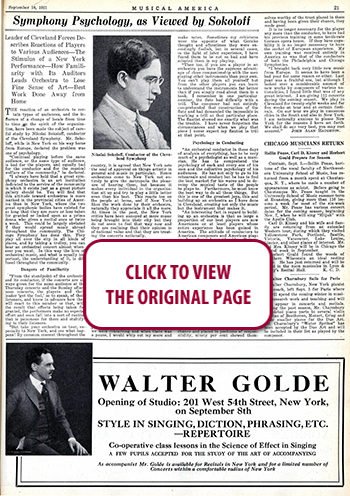 |
Leader of Cleveland Forces Describes Reactions of Players to Various Audiences—The Stimulus of a New York Performance—How Familiarity Leads Fine Work Home with Its Auditors Orchestra to Lose Sense of Art—Best Done Away from Home
|
|
3 SEPTEMBER 1921
Page 9
Walter Damrosch Finds Music Lamp Burns Dimly Abroad |
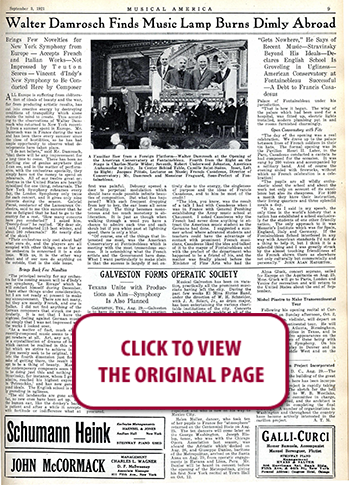 |
Brings Few Novelties for New York Symphony from Europe—Accepts French and Italian Works—Not Impressed by Teuton Scores—Vincent d’Indy’s New Symphony to Be Conducted Here by Composer— “Gets Nowhere,” He Says of Recent Music—Stravinsky Beyond His Ideals—Declares English School Is Groveling in Ugliness—American Conservatory at Fontainebleau Successful—A· Debt to Francis Casadesus
|
|
20 AUGUST 1921
Page 5
The Kreutzer Sonata and Beethoven’s Mulatto Friend |
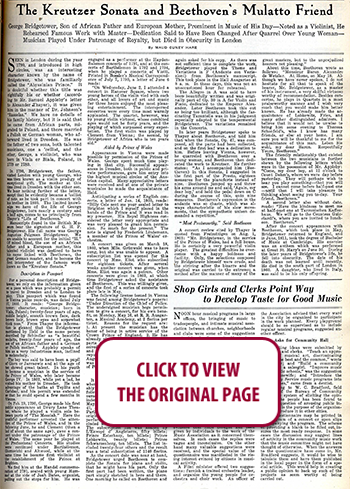 |
George Bridgetower, Son of African Father and European Mother, Prominent in Music of His Day—Noted as a Violinist, He Rehearsed Famous Work with Master—Dedication Said to Have Been Changed After Quarrel Over Young Woman—Musician Played Under Patronage of Royalty, but Died in Obscurity in London
|
|
13 AUGUST 1921
Page 15
Marvel of Caruso’s Voice Traced by Scientist to Resonance Contributed by Entire Body |
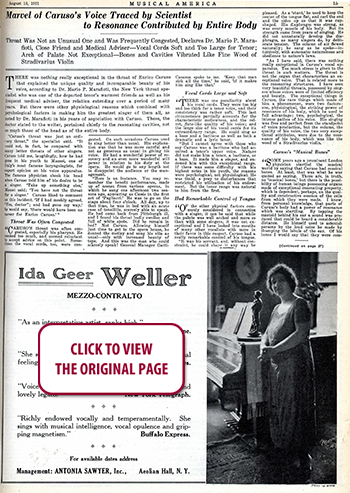 |
Throat Was Not an Unusual One and Was Frequently Congested, Declares Dr. Mario P. Marafioti, Close Friend and Medical Adviser—Vocal Cords Soft and Too Large for Tenor; Arch of Palate Not Exceptional—Bones and Cavities Vibrated Like Fine Wood of Stradivarius Violin
|
|
13 AUGUST 1921
Page 9
Enrico Caruso: An Estimate of the Sovereign Singer |
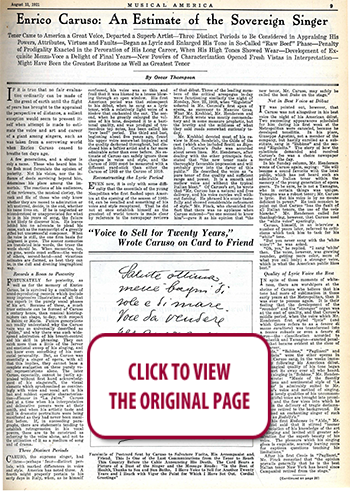 |
Tenor Came to America a Great Voice, Departed a Superb Artist—Three Distinct Periods to Be Considered in Appraising His Powers, Attributes, Virtues and Faults—Began as Lyric and Enlarged His Tone in So-Called Raw Beef” Phase—Penalty of Prodigality Exacted in the Peroration of His Long Career, When His High Tones Showed Wear—Development of Exquisite Mezza-Voce a Delight of Final Years—New Powers of Characterization Opened Fresh Vistas in Interpretation—Might Have Been the Greatest Baritone as Well as Greatest Tenor
|
|
13 AUGUST 1921
Page 5
Message of Happiness in Caruso’s Song |
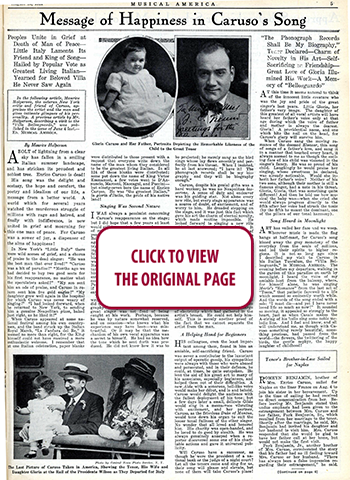 |
Peoples Unite in Grief at Death of Man of Peace—Little Italy Laments Its Friend and King of Song—Hailed by Popular Vote as Greatest Living Italian—Yearned for Beloved Villa He Never Saw Again—“The Phonograph Records Shall Be My Biography,” Tenor Declared—Charm of Novelty in His Art—Self-Sacrificing in Friendship—Great Love of Gloria Illumined His Work—A Memory of “Bellosguardo”
|
|
13 AUGUST 1921
Page 3
The Beloved Tenor: A Budget of Anecdotes |
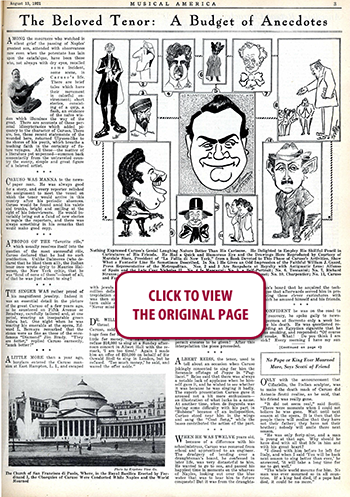 |
AMONG the mourners who watched in silent grief the passing of Naples’ greatest son, attended with observances rare even when the potentate has lain upon the catafalque, have been those who, not always with dry eyes, recalled some incident, some scene, in Caruso’s life. There are brief tales which have their movement in colorful environment; short stories, consisting of a quip, a flash, an evidence of the naïve wisdom which illumines the way of the great.
|
|
13 AUGUST 1921
Page 1
SORROWING MULTITUDES BARE HEADS AT REGAL OBSEQUIES IN NAPLES, AS WORLD MOURNS PASSING OF CARUSO |
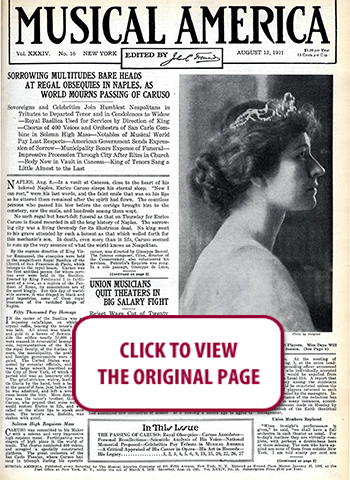 |
Sovereigns and Celebrities Join Humblest Neapolitans in Tributes to Departed Tenor and in Condolences to Widow—Royal Basilica Used for Services by Direction of King—Chorus of 400 Voices and Orchestra of San Carlo Combine in Solemn High Mass—Notables of Musical World Pay Last Respects—American Government Sends Expression of Sorrow—Municipality Bears Expense of Funeral—Impressive Procession Through City After Rites in Church—Body Now in Vault in Canessa—King of Tenors Sang a Little Almost to the Last
|
|
6 AUGUST 1921
Page 6
World Mourns with Italy as Caruso Passes |
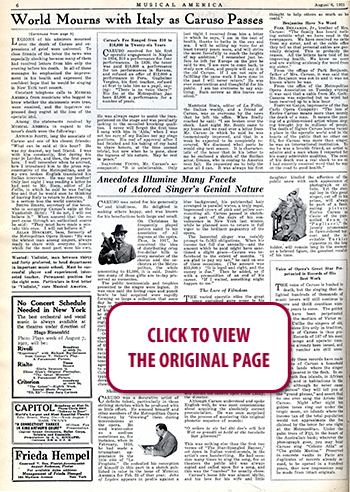 |
LEGIONS of his admirers mourned over the death of Caruso and expressions of grief were universal. To close friends of the tenor the news was especially shocking because many of them had received letters from him only the evening before his death. In all of these messages he emphasized the improvement in his health and expressed the confident hope that he would be singing in New York next season.
|
|
6 AUGUST 1921
Page 5
Caruso the Man at Different Stages of His Career |
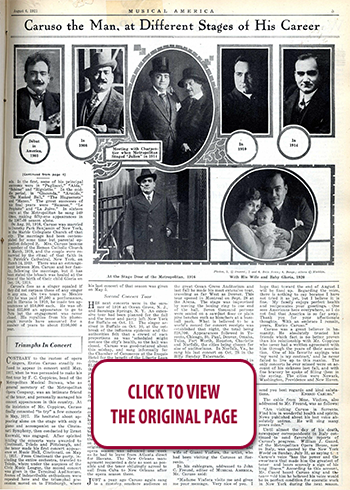 |
CONTRARY to the custom of opera singers, Enrico Caruso steadily refused to appear in concert until May 1917, when he was persuaded to make his first tour by F. C. Coppicus, head of the Metropolitan Musical Bureau, who as general secretary of the Metropolitan Opera Company, was an intimate friend of the tenor, and personally managed his concert appearances in this country.
|
|
6 AUGUST 1921
Page 2
Once Called “The Broken Tenor,” Caruso Leapt to Operatic Fame |
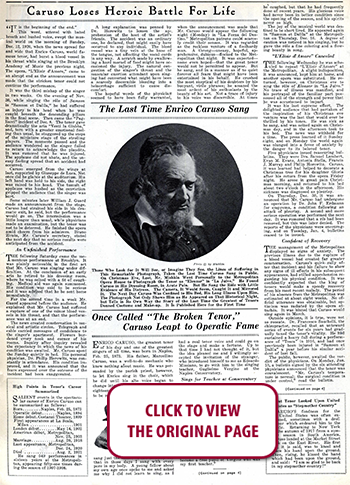 |
ENRICO CARUSO, the greatest tenor of his day and one of the greatest singers of all time, was born in Naples, Feb. 25, 1873. His father, Marcellino Caruso, was a well-to-do mechanic who knew nothing about music. He was persuaded by the parish priest, however, to let Enrico sing in the choir, which he did until his alto voice began to change into a tenor. It was when about eighteen years of age that the celebrity to be really discovered his voice.
|
|
6 AUGUST 1921
Page 1
ENRICO CARUSO DIES IN NAPLES |
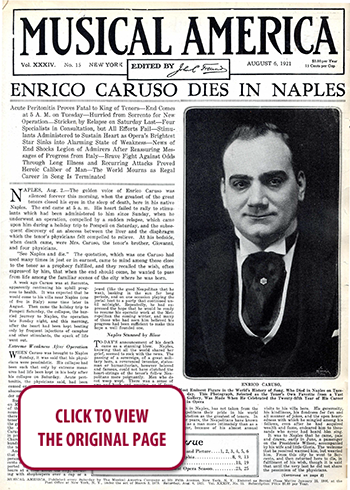 |
Acute Peritonitis Proves Fatal to King of Tenors—End Comes at 5 A.M. on Tuesday—Hurried from Sorrento for New Operation—Stricken by Relapse on Saturday Last—Four Specialists in Consultation, but All Efforts Fail—Stimulants Administered to Sustain Heart as Opera’s Brightest Star Sinks into Alarming State of Weakness—News of End Shocks Legion of Admirers After Reassuring Messages of Progress from Italy—Brave Fight Against Odds Through Long Illness and Recurring Attacks Proved Heroic Caliber of Man—The World Mourns as Regal Career in Song Is Terminated
|
|
30 JULY 1921
Page 9
Godowsky Advocates Class Instruction for Pianists |
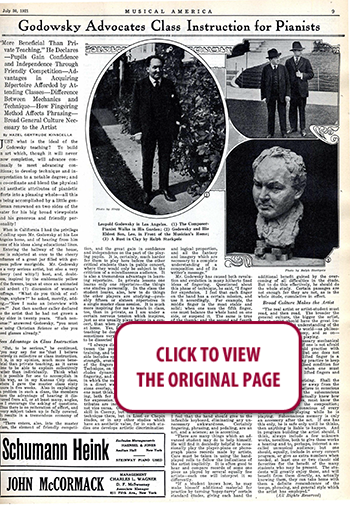 |
More Beneficial Than Private Teaching,” He Declares—Pupils Gain Confidence and Independence Through Friendly Competition—Advantages in Acquiring Repertoire Afforded by Attending Classes—Difference Between Mechanics and Technique—How Fingering Method Affects Phrasing—Broad General Culture Necessary to the Artist
|
|
23 JULY 1921
Page 5
WILD AUDIENCES I HAVE KNOWN |
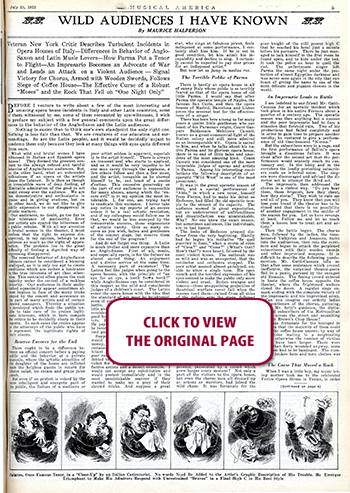 |
Veteran New York Critic Describes Turbulent Incidents in Opera Houses of Italy—Differences in Behavior of Anglo-Saxon and Latin Music Lovers—How Parma Put a Tenor to Flight—An Impresario Becomes an Advocate of War and Leads an Attack on a Violent Audience—Signal Victory for Chorus, Armed with Wooden Swords, Follows Siege of Coffee House—The Effective Curse of a Robust “Moses” and the Rock That Fell on “One Night Only”
|
|
23 JULY 1921
Page 1
COMPOSERS FORM GUILD TO BRING NEW WORKS TO PUBLIC HEARING |
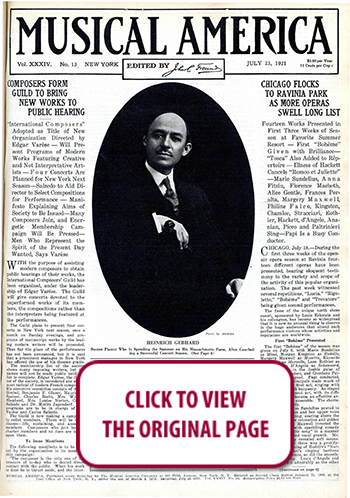 |
“International Composers” Adopted as Title of New Organization Directed by Edgar Varèse—Will Present Programs of Modern Works Featuring Creative and Not Interpretative Artists—Four Concerts Are Planned for New York Next Season—Salzedo to Aid Director to Select Compositions for Performance—Manifesto Explaining Aims of Society to Be Issued—Many Composers Join, and Energetic Membership Campaign Will Be Pressed—Men Who Represent the Spirit of the .Present Day Wanted, Says Varèse
|
|
2 JULY 1921
Page 3
Stephen Collins Foster, Maker of American Folk-Song |
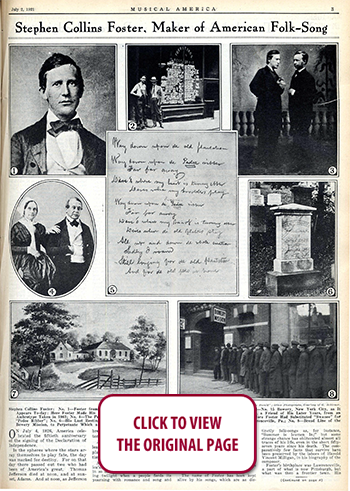 |
ON July 4, 1826, America celebrated the fiftieth anniversary of the signing of the Declaration of Independence. In the spheres where the stars array themselves to play fate, the day was marked for destiny. For on that day there passed out two who had been of America’s great. Thomas Jefferson died at noon, and at sunset, Adams. And at noon, as Jefferson breathed his last, Stephen Collins Foster was born.
|
|
25 JUNE 1921
Page 3
CONCERTS AT HOME, VIA WIRELESS |
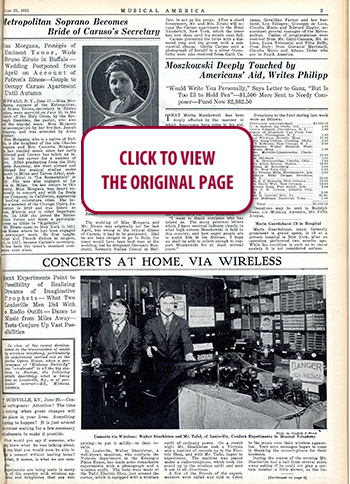 |
Recent Experiments Point to Possibility of Realizing Dreams of Imaginative Prophets—What Two Louisville Men Did With a Radio Outfit—Dance to Music from Miles Away—Tests Conjure Up Vast Possibilities
|
|
11 JUNE 1921
Page 15
Back from the Clouds, Schelling Will Play Again |
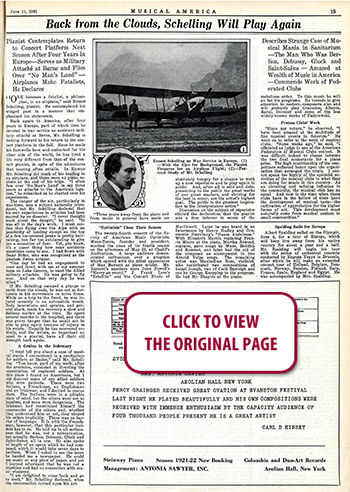 |
Pianist Contemplates Return to Concert Platform Next Season After Four Years in Europe—Serves as Military Attaché at Berne and Flies Over “No Man's Land”—Airplanes Make Fatalists, He Declares—Describes Strange Case of Musical Mania in Sanitarium—The Man Who Was Berlioz, Debussy, Gluck and Saint-Saëns—Amazed at Wealth of Music in America—Commends Work of Federated Clubs
|
|
11 JUNE 1921
Page 4
Reaching the Masses via Vaudeville |
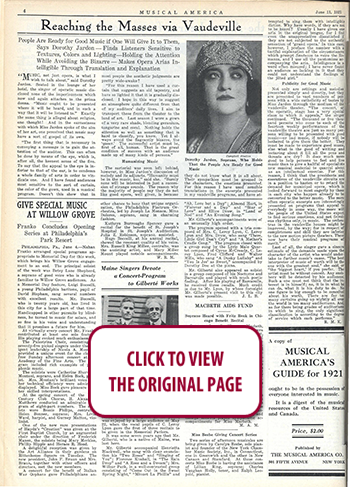 |
People Are Ready for Good Music if One Will Give It to Them, Says Dorothy Jardon—Finds Listeners Sensitive to Textures, Colors and Lighting—Holding the Attention While Avoiding the Bizarre—Makes Opera Arias Intelligible Through Translation and Explanation
|
|
11 JUNE 1921
Page 3
What the Actor Learns from Vocal Study |
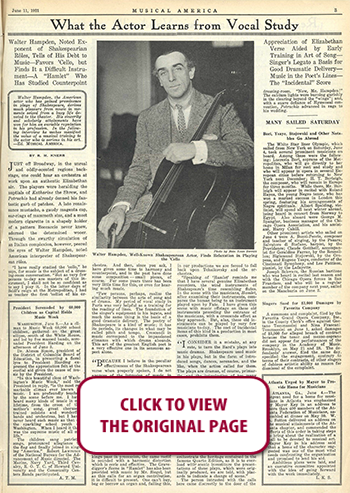 |
Walter Hampden, Noted Exponent of Shakespearian Rôles, Tells of His Debt to Music—Favors ‘Cello, but Finds It a Difficult Instrument—A “Hamlet” Who Has Studied Counterpoint—Appreciation of Elizabethan Verse Aided by Early Training in Art of Song—Singer’s Legato a Basis for Good Dramatic Delivery—Music in the Poet’s Lines—The “Incidental” Score
|
|
4 JUNE 1921
Page 41
Rosen Sees the Artist as a Super-Radical |
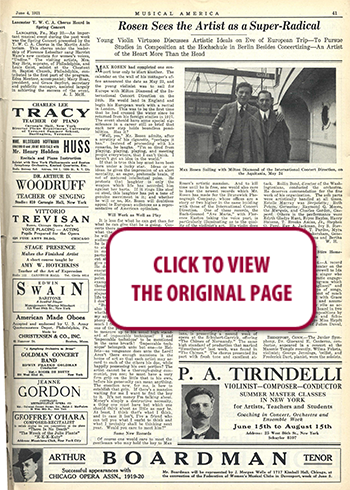 |
Young Violin Virtuoso Discusses Artistic Ideals on Eve of European Trip—To Pursue Studies in Composition at the Hochschule in Berlin Besides Concertizing—An Artist of the Heart More Than the Head
|
|
4 JUNE 1921
Page 3
IN THE EDEN-SETTING OF CARUSO’S TUSCAN VILLA |
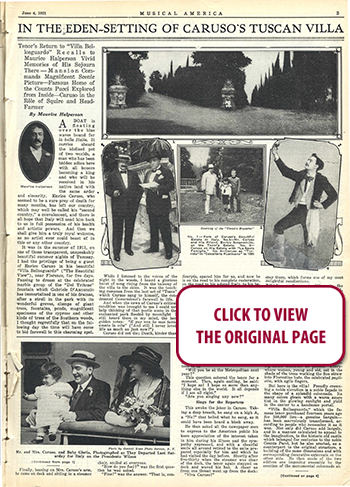 |
Tenor’s Return to “Villa Bellosguardo” Recalls to Maurice Halperson Vivid Memories of His Sojourn There—Mansion Commands Magnificent Scenic Picture—Famous Home of the Counts Pucci Explored from Inside—Caruso in the Rôle of Squire and Head-Farmer
|
|
4 JUNE 1921
Page 1
STIRRING SCENE AS CARUSO SAILS FOR ITALY; HE SINGS A FAREWELL “A” |
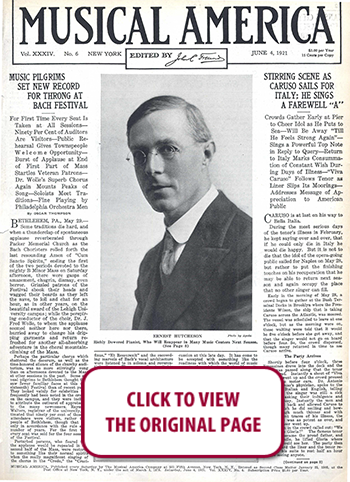 |
Crowds Gather Early at Pier to Cheer Idol as He Puts to Sea—Will Be Away “Till He Feels Strong Again”—Sings a Powerful Top Note in Reply to Query—Return to Italy Marks Consummation of Constant Wish During Days of Illness—”Viva Caruso” Follows Tenor as Liner Slips Its Moorings—Addresses Message of Appreciation to American Public
|
|
28 MAY 1921
Page 25
Hageman Advocates Prohibition of Singers |
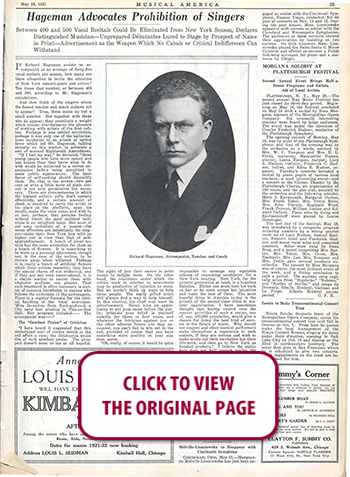 |
Between 400 and 500 Vocal Recitals Could Be Eliminated from New York Season, Declares Distinguished Musician—Unprepared Debutantes Lured to Stage by Prospect of Name in Print—Advertisement as the Weapon Which No Cabals or Critical Indifference Can Withstand
|
|
14 MAY 1921
Page 45
What Do Orchestra Men Think About? |
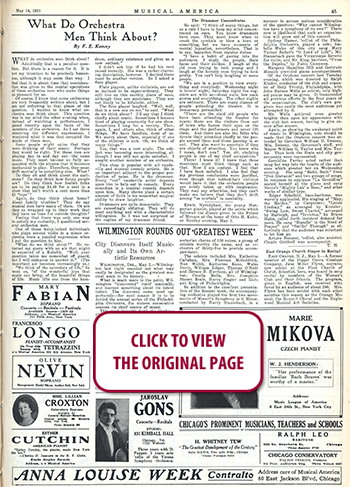 |
WHAT do orchestra men think about? Admittedly that is a peculiar question. But there is a reason for it. It is not my intention to be precisely humorous, although it may seem that way. I feel that it is about time that consideration was given to the mental operations of these orchestra men who make things so pleasant for us.
|
|
14 MAY 1921
Page 8
IRVING BERLIN SUMS UP FOR SYNCOPATION |
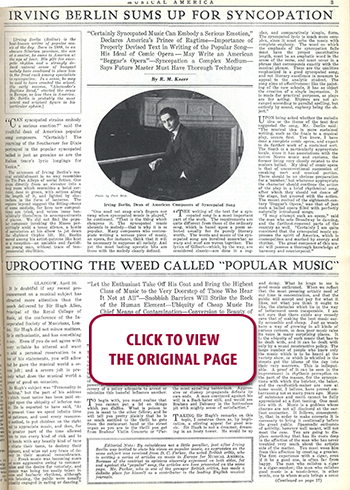 |
“Certainly Syncopated Music Can Embody a Serious Emotion,” Declares America’s Prince of Ragtime—Importance of Properly Devised Text in Writing of the Popular Song—His Ideal of Comic Opera—May Write an American “Beggar’s Opera”—Syncopation a Complex Medium—Says Future Master Must Have Thorough Technique
|
|
7 MAY 1921
Page 49
Chicagoans’ Visit to San Francisco Inspires New Enthusiasm for War Memorial Opera House Plan |
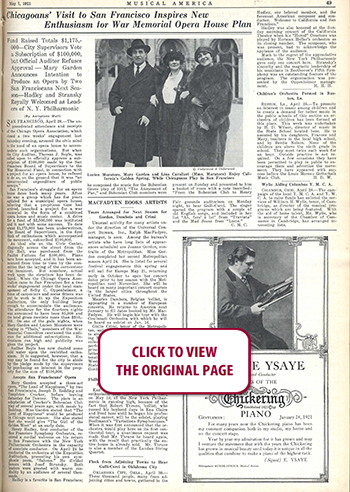 |
Fund Raised Totals $1,175,000—City Supervisors Vote a Subscription of $100,000, but Official Auditor Refuses Approval—Mary Garden Announces Intention to Produce an Opera by Two San Franciscans Next Season—Hadley and Stransky Royally Welcomed as Leaders of N. Y. Philharmonic
|
|
7 MAY 1921
Page 25
When the White Moon of “Salome” Bleached Berlin |
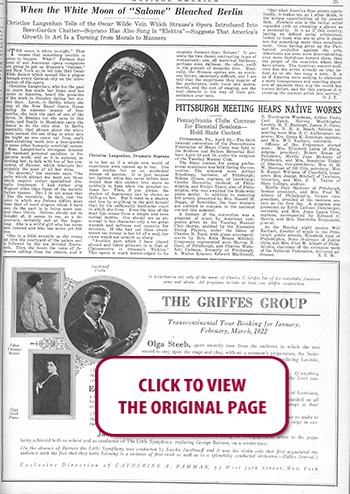 |
Christine Langenhan Tells of the Oscar Wilde Vein Which Strauss’s Opera Introduced Into Beer-Garden Chatter—Soprano Has Also Sung in “Elektra”—Suggests That America’s Growth in Art Is a Turning from Morals to Manners
|
|
7 MAY 1921
Page 1
STRAUSS, COMING AFTER 17 YEARS, WILL TOUR U. S. AS CONDUCTOR |
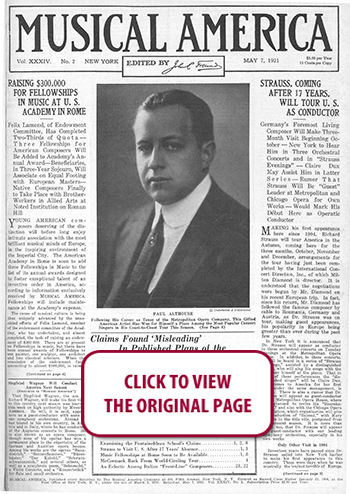 |
Germany’s Foremost Living Composer Will Make Three-Month Visit Beginning October— New York to Hear Him in Three Orchestral Concerts and in “Strauss Evenings”—Claire Dux May Assist Him in Latter Series—Rumor That Strauss Will Be “Guest” Leader at Metropolitan and Chicago Opera for Own Works—Would Mark His Debut Here as Operatic Conductor
|
|
30 APRIL 1921
Page 15
His Lieutenant Tells How Caruso Masters a Rôle |
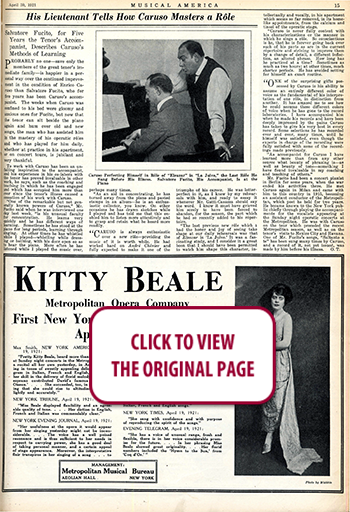 |
Salvatore Fucito, for Five Years the Tenor’s Accompanist, Describes Caruso’s Methods of Learning
|
|
30 APRIL 1921
Page 5
Paderewski, Rancher De Luxe, To Re-Enter Political Arena |
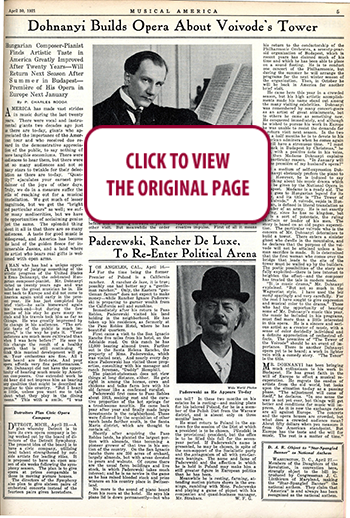 |
LOS ANGELES, CAL., April 16—For the time being the former Premier of Poland is a California rancher. A rancher de luxe, it is true; possibly one had better say a “gentleman rancher.” Only, the Eastern “gentleman farmer” does not expect to make money—while Rancher Ignace Paderewski is preparing to garner wealth from the California soil and sunshine.
|
|
23 APRIL 1921
Page 3
Einstein, Scientist Supreme, Viewed from the Plane of Music |
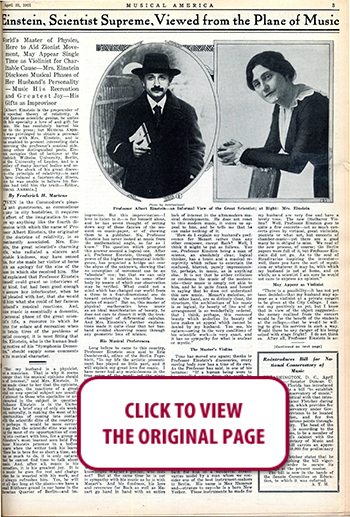 |
World’s Master of Physics, Here to Aid Zionist Movement, May Appear Single Time as Violinist for Charitable Cause—Mrs. Einstein Discloses Musical Phases of Her Husband’s Personality—Music His Recreation and Greatest Joy—His Gifts as Improvisor
|
|
16 APRIL 1921
Page 17
“Art in America Today Is Petty Commerce” |
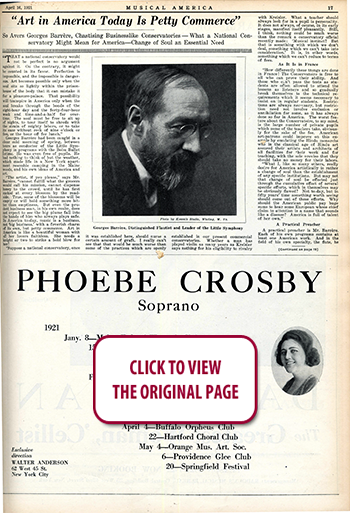 |
So Avers Georges Barrère, Chastising Businesslike Conservatories—What a National Conservatory Might Mean for America—Change of Soul an Essential Need
|
|
16 APRIL 1921
Page 5
COMES STRAVINSKY TO THE FILM THEATER |
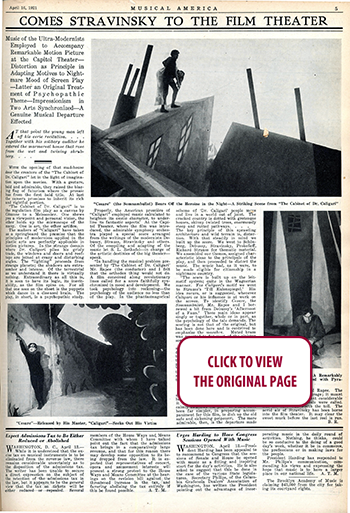 |
Music of the Ultra-Modernists Employed to Accompany Remarkable Motion Picture at the Capitol Theater—Distortion as Principle in Adapting Motives to Nightmare Mood of Screen Play—Latter an Original Treatment of Psychopathic Theme—Impressionism in Two Arts Synchronized—A Genuine Musical Departure Effected
|
|
9 APRIL 1921
Page 13
WAR OPENS THE DOOR OF POLAND’S ART |
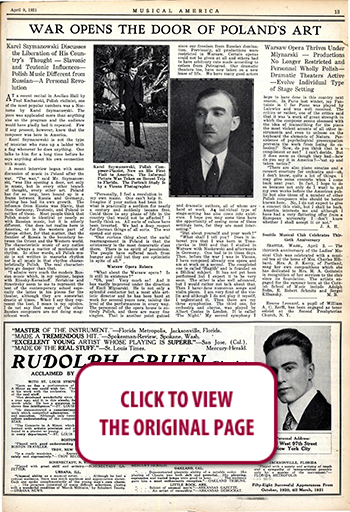 |
Karel Szmanowski Discusses the Liberation of His Country’s—Slavonic and Teutonic Influences—Polish Music Different from Russian—A Personal Revolution—Warsaw Opera Thrives Under Mlynarski—Productions No Longer Restricted and Personnel Wholly Polish—Dramatic Theaters Active—Evolve Individual Type of Stage Setting
|
|
9 APRIL 1921
Page 9
What Can Come from Russia Musically With Most of Its Creative Forces in Exile? Asks Rachmaninoff |
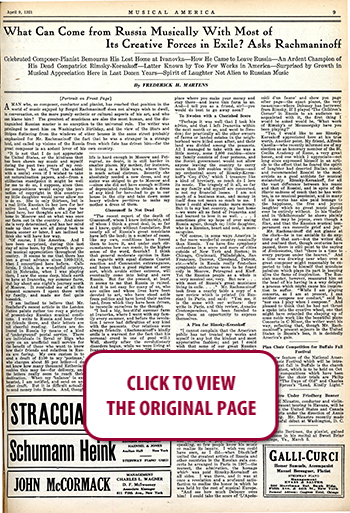 |
Celebrated Composer-Pianist Bemourns His Lost Home at Ivanovka—How He Came to Leave Russia—An Ardent Champion of His Dead Compatriot Rimsky-Korsakoff—Latter Known by Too Few Works in “America—Surprised by Growth in Musical Appreciation Here in Last Dozen Years—Spirit of Laughter Not Alien to Russian Music
|
|
2 APRIL 1921
Page 34
How Mary Garden Got Her First Chance, While Paris Marvelled |
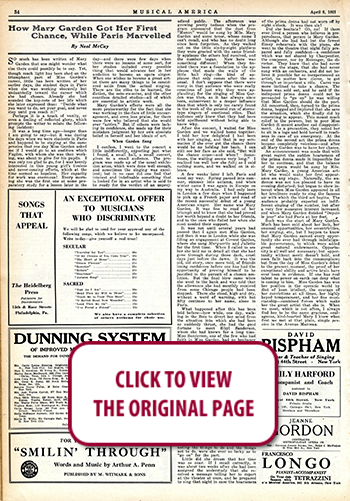 |
SO much has been written of Mary Garden that one might wonder what else there could possibly be to say. Yet, though much light has been shed on the triumphant part of Miss Garden’s career, little has been written of her earlier days, the student days in Paris when she was working obscurely but undauntedly toward the career which she had chosen. Already she had sounded the key-note of her life which she later expressed thus: “Decide what you want to do, set your goal, and never stop until you reach it!”
|
|
2 APRIL 1921
Page 1
NEW PHILHARMONIC WILL HAVE 120 MEN AND 4 CONDUCTORS |
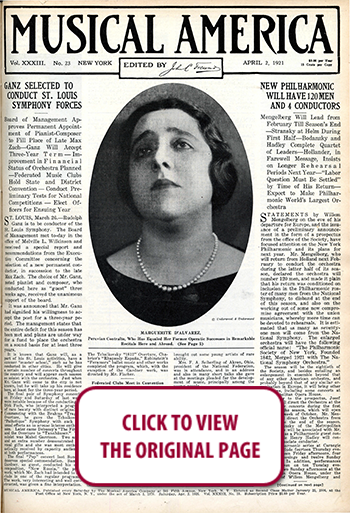 |
Mengelberg Will Lead from February Till Season’s End—Stransky at Helm During First Half—Bodanzky and Hadley Complete Quartet of Leaders—Hollander, in Farewell Message, Insists on Longer Rehearsa1 Periods Next Year—”Labor Question Must Be Settled” by Time of His Return—Expect to Make Philharmonic World’s Largest Orchestra
|
|
1 MARCH 1921
Page 1
CARUSO, STILL FIGHTING FEVER, GAINS STRENGTH |
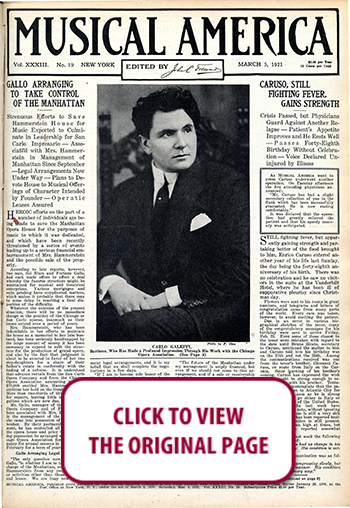 |
Crisis Passed, but Physicians Guard Against Another Relapse—Patient’s Appetite Improves and He Rests Well—Passes Forty-Eighth Birthday Without Celebration—Voice Declared Uninjured by Illness
|
|
26 FEBRUARY 1921
Page 13
Dohnanyi Regrets Exodus from Europe |
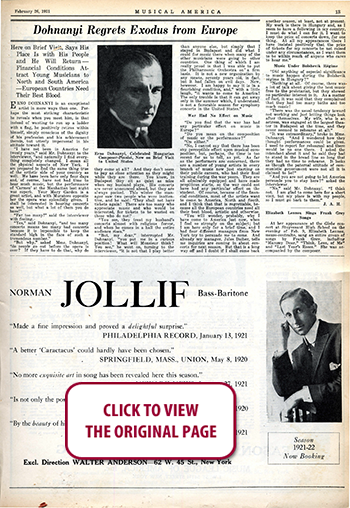 |
Here on Brief Visit Says His Place Is with His People and He Will Return—Financial Conditions Attract Young Musicians to North and South America—European Countries Need Their Best Blood
|
|
26 FEBRUARY 1921
Page 1
CARUSO IN THE SHADOWS, WINS BITTER BATTLE AGAINST DEATH |
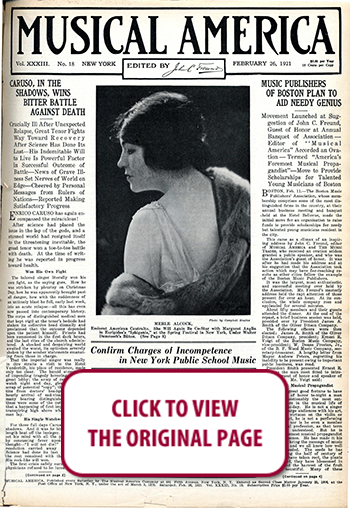 |
Crucially Ill After Unexpected Relapse, Great Tenor Fights Way Toward Recovery After Science Has Done Its Last—His Indomitable Will to Live Is Powerful Factor in Successful Outcome of Battle—News of Grave Illness Set Nerves of World on Edge—Cheered by Personal Messages from Rulers of Nations—Reported Making Satisfactory Progress
|
|
12 FEBRUARY 1921
Page 9
IGOR STRAVINSKY: CONTRAPUNTAL TITAN |
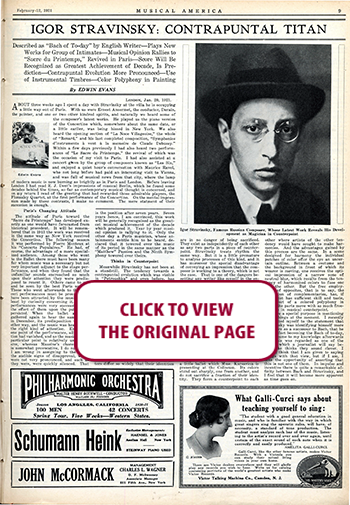 |
Described as “Bach of To-day” by English Writer—Plays New Works for Group of Intimates—Musical Opinion Rallies to “Sacre du Printemps,” Revived in Paris—Score Will Be Recognized as Greatest Achievement of Decade, Is Prediction—Contrapuntal Evolution More Pronounced—Use of Instrumental Timbres—Color Polyphony in Painting
|
|
12 FEBRUARY 1921
Page 1
$250,000 DEFICIT FORCED NATIONAL SYMPHONY TO JOIN THE PHILHARMONIC |
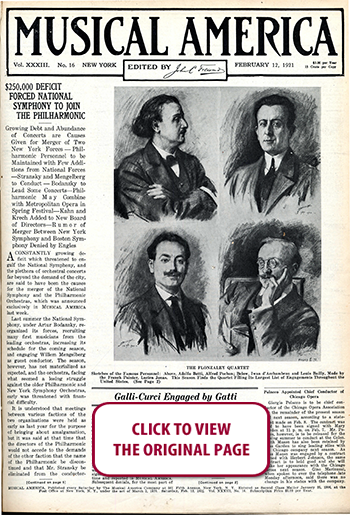 |
Growing Debt and Abundance of Concerts are Causes Given for Merger of Two New York Forces—Philharmonic Personnel—to be Maintained with Few Additions from National Forces—Stransky and Mengelberg to Conduct—Bodanzky to Lead Some Concerts—Philharmonic May Combine with Metropolitan Opera in Spring Festival—Kahn and Krech Added to New Board of Directors—Rumor of Merger Between New York Symphony and Boston Symphony Denied by Engles
|
|
22 JANUARY 1921
Page 52
Musicians Too Ignorant of Science, Says Edison |
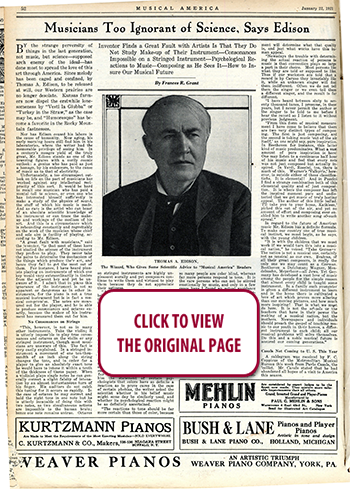 |
Inventor Finds a Great Fault with Artists Is That They Do Not Study Make-up of Their Instrument—Consonances Impossible on a Stringed Instrument—Psychological Reactions to Music-Composing as He Sees It—How to Insure Our Musical Future
|
|
15 JANUARY 1921
Page 15
Russia’s Upheaval Has Wrought Three-Fold Distortion in Her Music, Says Saminsky |
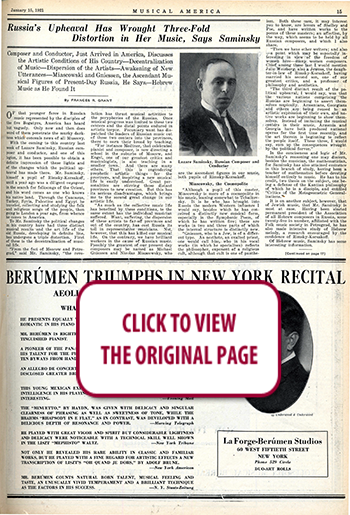 |
Composer and Conductor, Just Arrived in America, Discusses the Artistic Conditions of His Country—Decentralization of Music—Dispersion of· the Artists—Awakening of New Utterances—Miascowski and Gniessen, the Ascendant Musical Figures of Present-Day Russia, He Says—Hebrew Music as He Found It
|
|
8 JANUARY 1921
Page 27
Caruso’s Malady Result of Stage Falls, Believes Dr. Sauchelli |
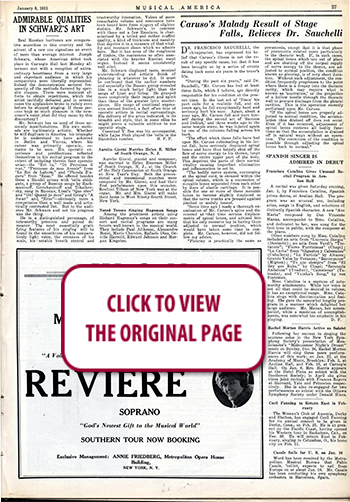 |
DR. FRANCESCO SAUCHELLI, the chiropractor, has expressed his belief that Caruso’s illness is not the result of any specific cause, but that it has been brought on by a series of events dating back some six years in the tenor’s life.
|
|
8 JANUARY 1921
Page 1
CARUSO RALLIES AFTER OPERATIONS BUT MAY NOT SING AGAIN THIS YEAR |
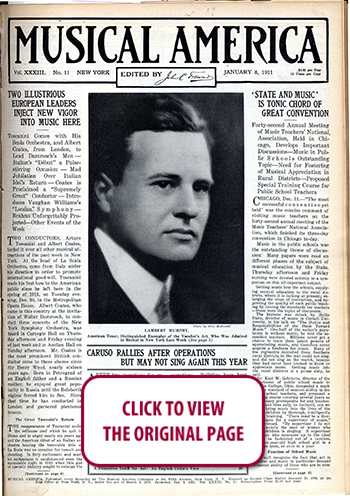 |
AFTER two operations for empyema, or suppurative pleurisy, Enrico Caruso continues seriously ill in his apartment at the Vanderbilt Hotel. Six physicians are in attendance upon him, the original five having been increased by the addition of Dr. John F. Erdmann, who performed the operations. Bulletins have been issued daily with respect to his condition. These, while emphasizing that there is no cause for alarm, have not attempted to disguise the fact that Mr. Caruso is a very sick man.
|
|
1 JANUARY 1921
Page 15
The Seed That Bore the Philadelphia Orchestra |
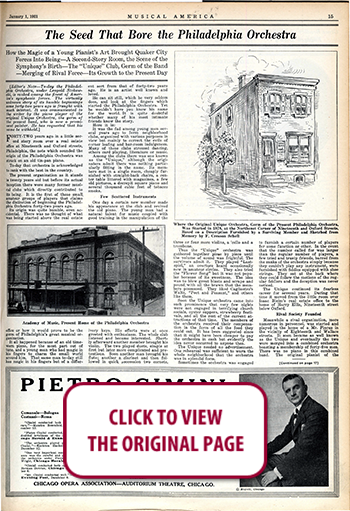 |
How the Magic of a Young Pianist’s Art Brought Quaker City Forces Into Being—A Second-Story Room, the Scene of the Symphony’s Birth—The “Unique” Club, Germ of the Band—Merging of Rival Force—Its Growth to the Present Day
|
|
1 JANUARY 1921
Page 2
Caruso Confined to His Bed By Sudden Attack of Pleurisy |
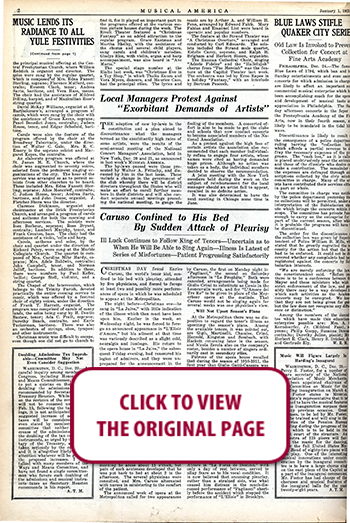 |
Ill Luck Continues to Follow King of Tenors—Uncertain as to When He Will Be Able to Sing Again—Illness Is Latest of Series of Misfortunes—Patient Progressing Satisfactorily
|
|
20 NOVEMBER 1920
Page 29
How It Felt to Give the First Recital in Westminster Abbey Told by Mme. D’Alvarez |
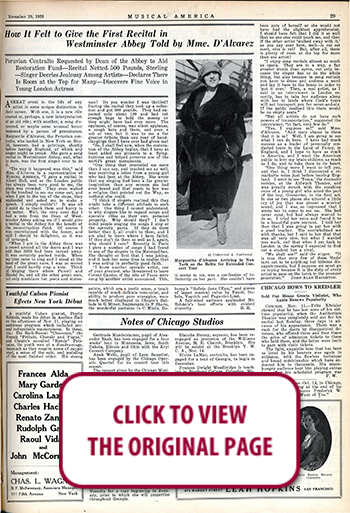 |
Peruvian Contralto Requested by Dean of the Abbey to Aid Restoration Fund—Recital Netted 500 Pounds, Sterling—Singer Decries Jealousy Among Artists—Declares There Is Room at the Top for Many—Discovers Fine Voice in Young London Actress
|
|
20 NOVEMBER 1920
Page 9
How Modern Criticism Is Justly Smiting the Musically Unfit |
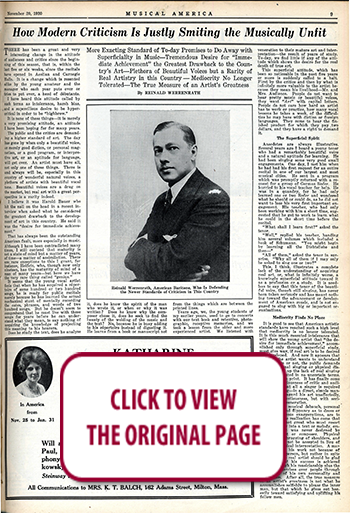 |
More Exacting Standard of To-day Promises to Do Away with Superficiality in music—Tremendous Desire for “Immediate Achievement” the Greatest Drawback to the Country’s Art—Plethora of Beautiful Voices but a Rarity of Real Artistry in this Country—Mediocrity No Longer Tolerated—The True Measure of an Artist’s Greatness
|
|
20 NOVEMBER 1920
Page 2
CARUSO ACCLAIMED AS METROPOLITAN LAUNCHES SEASON |
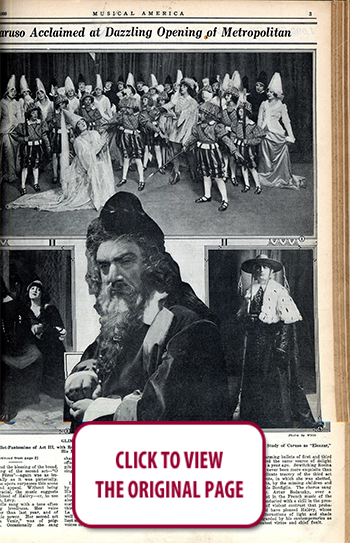 |
King of Tenors Triumphs in “La Juive”—Shares Stellar Glory with Rosa Ponselle and Leon Rothier—Cast, with One Exception, Same as Last Year’s—Gorgeous Pageantry on Stage Matched by· Brilliance of Audience—Capacity Throng Recalls Principals Many Times
|
|
18 SEPTEMBER 1920
Page 15
“The David Bispham Song Book” a Valuable Popular Collection for Mixed Voices |
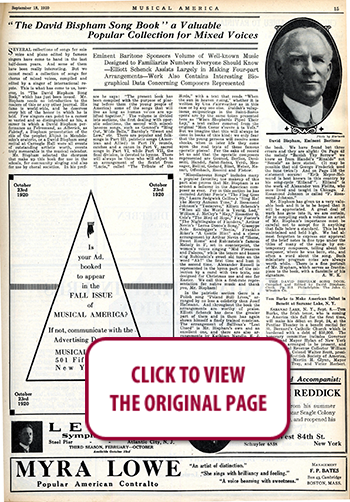 |
Eminent Baritone Sponsors Volume of Well-known Music Designed to Familiarize Numbers Everyone Should Know—Elliott Schenck Assists Largely in Making Four-part Arrangements—Work Also Contains Interesting Biographical Data Concerning Composers Represented
|
|
18 SEPTEMBER 1920
Page 1
DISCUSS RETURN OF GERMAN TONGUE TO RECITAL STAGE |
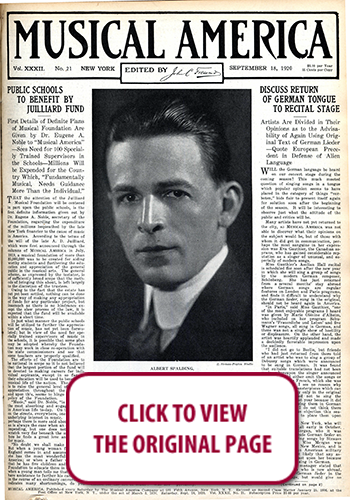 |
Artists Are Divided in Their Opinions as to the Advisability of Again Using Original Text of German Lieder—Quote European Precedent in Defense of Alien Language
|
|
11 SEPTEMBER 1920
Page 1
REVEAL BOK AS THE SECRET HELPER OF PHILADELPHIA FUND |
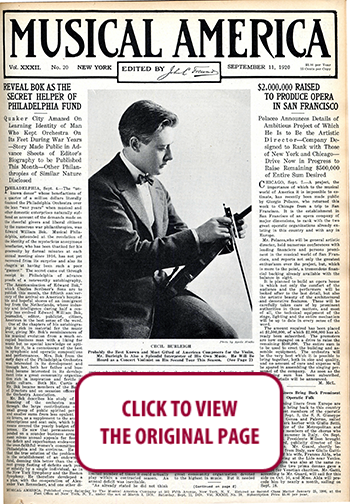 |
Quaker City Amazed On Learning Identity of Man Who Kept Orchestra On Its Feet During War Years—Story Made Public in Advance Sheets of Editor’s Biography to be Published This Month—Other Philanthropies of Similar Nature Disclosed
|
|
28 AUGUST 1920
Page 14
Stephen Foster, Who Composed “Old Folks at Home,” Left Many Songs Unpublished, Says Daughter |
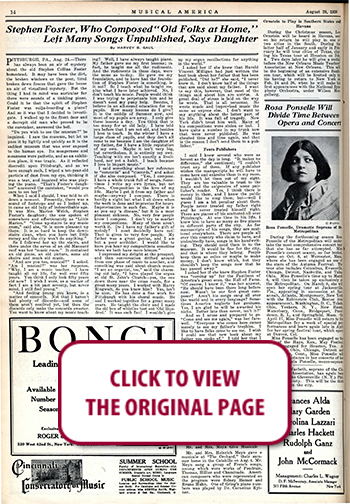 |
|
|
28 AUGUST 1920
Page 6
Sevcik, Master-Teacher and Inaugurator of a New Method of Violin Instruction |
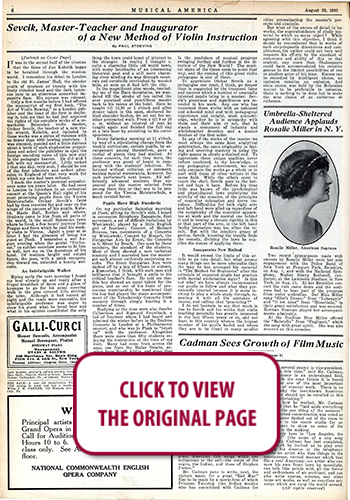 |
IT was in the second half of the nineties that the fame of Jan Kubelik began to be heralded through the musical world. I remember his debut in London in the old St. James’ Hall, the slender youth of nineteen or twenty with the finely chiseled head and the dark luminous eyes in an otherwise somewhat impassive face. His success was colossal.
|
|
28 AUGUST 1920
Page 5
Cadman Sees American Composers as Pioneers in Creating Musical Scores for Motion Pictures |
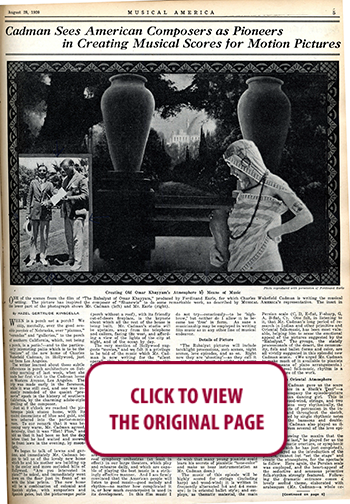 |
|
|
14 AUGUST 1920
Page 5
Collapse of Europe’s Art Is Following In the Wake of War, Says Eva Gauthier |
 |
Exponent of Modern Songs Finds Depression Besetting All Sides of Life Abroad—Distrust of Foreigners—Excess and Eccentricity Rampant in New Works—Ravel Still Leader of France’s Composers—Low Standards of Present Life Reflected in Art
|
|
7 AUGUST 1920
Page 24
MUSIC AN ANCIENT LEGACY OF THE IRISH |
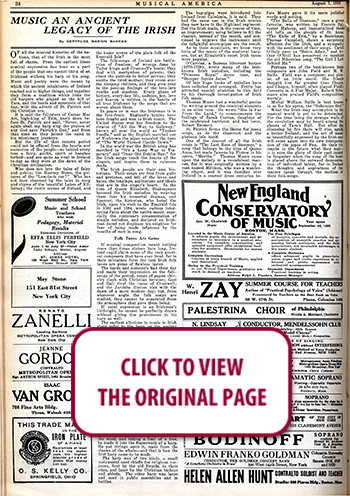 |
OF all the musical histories of the nations, that of the Irish is the most full of charm. From the earliest times musical expression has been so a part of the people that one cannot think of an Irishman without his harp or his song. Music and poetry were the means by which the ancient inhabitants of Ireland reached out to higher things, and together they form a tradition which links the old harpers who played on the hill of Tara, and the bards and minstrels of that day, with the advent of St. Patrick and the Christian era.
|
|
7 AUGUST 1920
Page 5
BENEFICENT SPIRITS IN AMERICA’S MUSICAL LIFE |
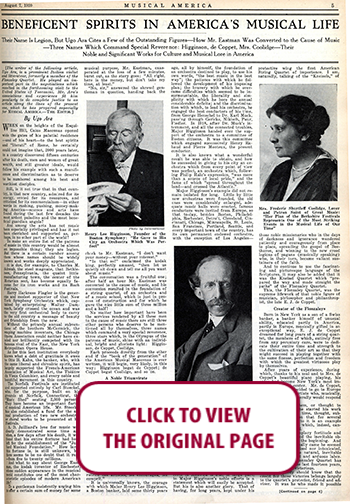 |
Their Name Is Legion, But Ugo Ara Cites a Few of the Outstanding Figures—How Mr. Eastman Was Converted to the Cause of Music—Three Names Which Command Special Reverence: Higginson, de Coppet, Mrs. Coolidge—Their Noble and Significant Works for Culture and Musical Lore in America
|
|
24 JULY 1920
Page 21
Los Angeles Philharmonic’s First Year One of Signal Achievement |
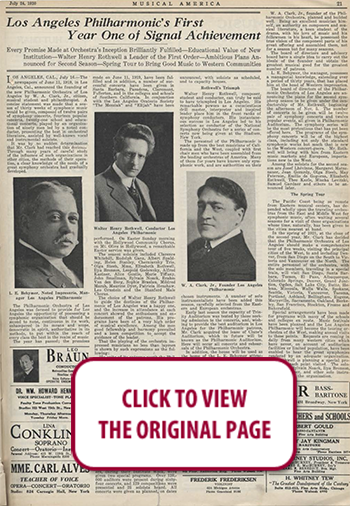 |
Every Promise Made at Orchestra’s Inception Brilliantly Fulfilled—Educational Value of New Institution—Walter Henry Rothwell a Leader of the First Order—Ambitious Plans Announced for Second Season—Spring Tour to Bring Good Music to Western Communities
|
|
17 JULY 1920
Page 27
Once More David and Clara Mannes, Noted as Sonata Exponents, Blaze Trail in Music |
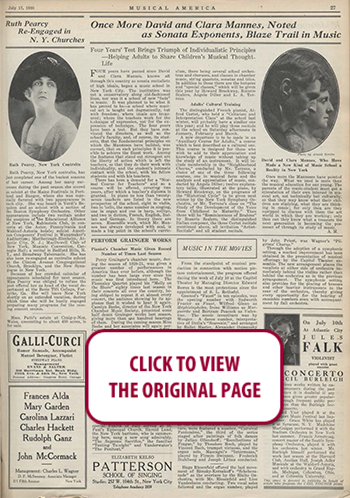 |
Four Years’ Test Brings Triumph of Individualistic Principles—Helping Adults to Share Children’s Musical Thought-Life
|
|
3 JULY 1920
Page 3
Braving Ruffo, Lion of Baritones, in His Dressing-Room Back Stage |
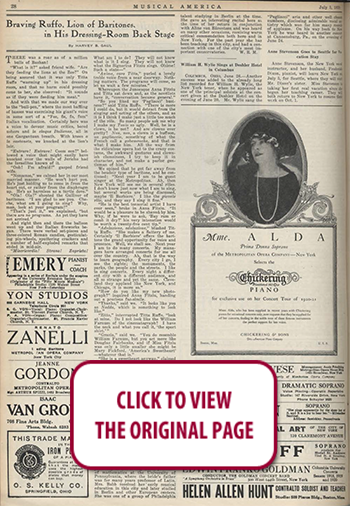 |
|
|
26 JUNE 1920
Page 3
Candidate Warren G. Harding, Once a Village Bandsman, Tells “Musical America” He Wants Federal Aid For Music |
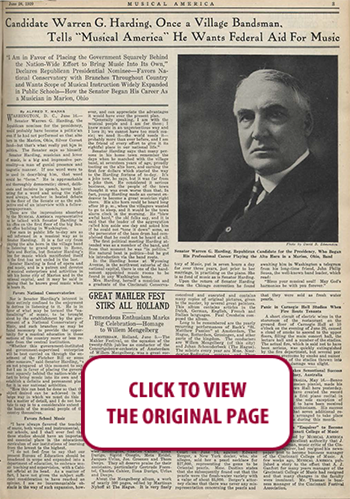 |
“I am in Favor of Placing the Government Squarely Behind the Nation-Wide Effort to Bring Music Into Its Own,” Declares Republican Presidential Nominee—Favors National Conservatory with Branches Throughout Country and Wants Scope of Musical Instruction Widely Expanded in Public Schools—How the Senator Began His Career As a Musician in Marion, Ohio
|
|
19 JUNE 1920
Page 42
The Marche Funèbre of “Jazz” |
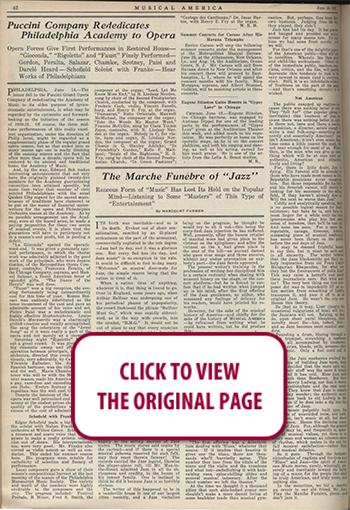 |
Raucous Form of “Music” Has Lost Its Hold on the Popular Mind—Listening to Some “Masters” of This Type of “Entertainment”
|
|
19 JUNE 1920
Page 19
San Francisco’s Projected War Memorial Will Provide Long-Needed Home for the Symphony |
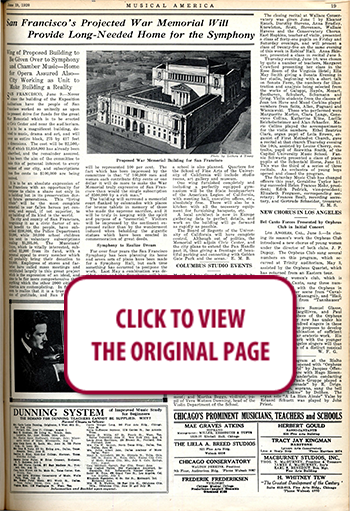 |
Wing of Proposed Building to Be Given Over to Symphony and Chamber Music—Home for Opera Assured Also—City Working as Unit to Make Building a Reality
|
|
5 JUNE 1920
Page 11
EACH TONE IS A DEFINITE COLOR TO AUGUSTA COTTLOW |
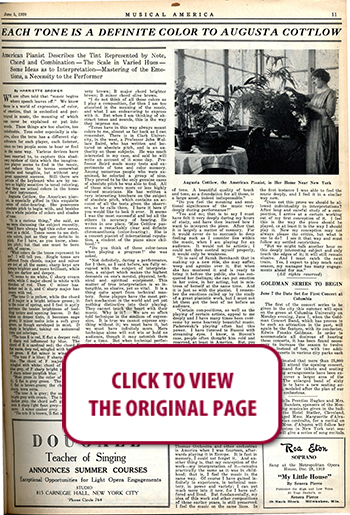 |
American Pianist Describes the Tint Represented by Note, Chord and Combination—The Scale in Varied Hues—Some Ideas as to Interpretation—Mastering of the Emotions, a Necessity to the Performer
|
|
29 MAY 1920
Page 23
Godowsky Goes to Recital by 'Plane |
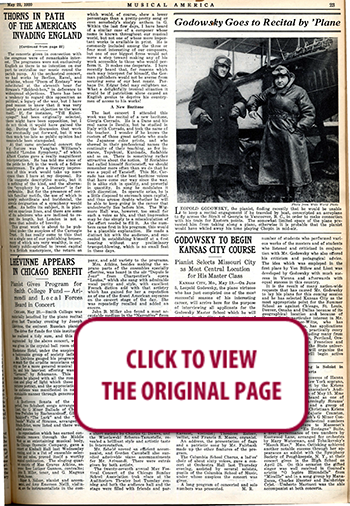 |
LEOPOLD GODOWSKY, the pianist, finding recently that he would be unable to keep a recital engagement if he traveled by boat, conscripted an aeroplane to fly across the Strait of Georgia to Vancouver, B. C., in order to make connection with his train for Eastern points. The somewhat limited space of the plane prevented him from taking along a piano, otherwise it is probable that the pianist would have whiled away his time playing Chopin in mid-air.
|
|
22 MAY 1920
Page 39
Charles T. Griffes: Cut Down in His Prime, a Victim of Our Barbarous Neglect of Genius |
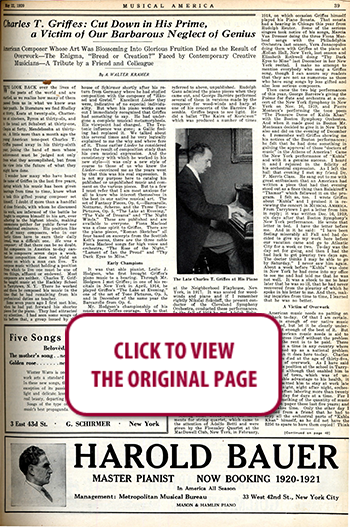 |
American Composer Whose Art Was Blossoming Into Glorious Fruition Died as the Result of Overwork—The Enigma, “Bread or Creation?” Faced by Contemporary Creative Musicians—A Tribute by a Friend and Colleague
|
|
15 MAY 1920
Page 39
When the German Tongue Returned to the London Recital Platform |
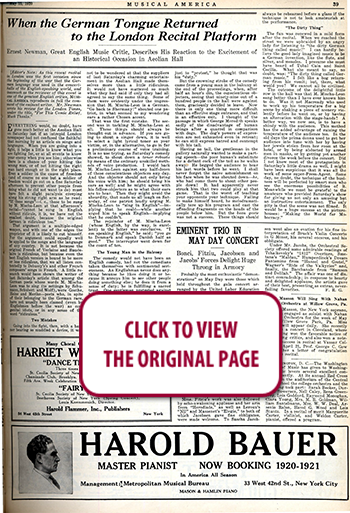 |
Ernest Newman, Great English Music Critic, Describes His Reaction to the Excitement of an Historical Occasion in Aeolian Hall
|
|
15 MAY 1920
Page 17
NASHVILLE SYMPHONY SCORES IN DEBUT |
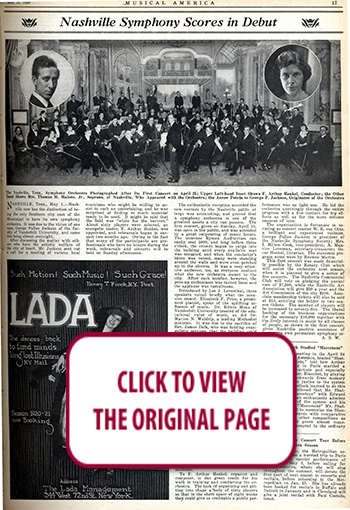 |
NASHVILLE, Tenn., May 1. —Nashville now has the distinction of being the only Southern city east of the Mississippi to have its own symphony orchestra. It was due to the vision of one man, George Pullen Jackson of the faculty of Vanderbilt University, and came into being almost overnight.
|
|
8 MAY 1920
Page 35
How America Has Extended Its Friendship to the Flonzaleys |
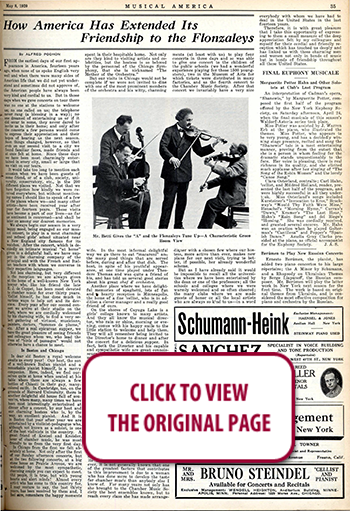 |
|
|
8 MAY 1920
Page 1
OPERA HOUSE SALE MAY ‘WRECK’ MUSIC IN PHILADELPHIA |
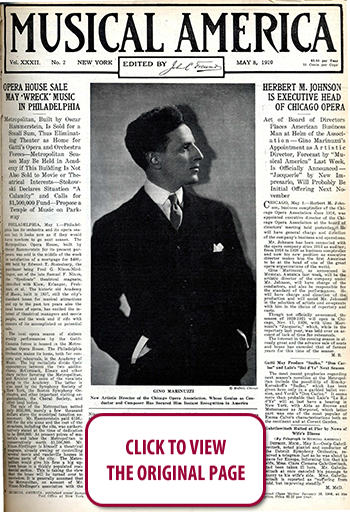 |
Metropolitan, Built by Oscar Hammerstein, Is Sold for a Small Sum, Thus Eliminating Theater as Home for Gatti’s Opera and Orchestra Forces—Metropolitan Season May Be Held in Academy if This Building Is Not Also Sold to Movie or Theatrical Interests—Stokowki Declares Situation “A Calamity” and Calls for 1,500,000 Fund—Propose a Temple of Music on Parkway
|
|
17 APRIL 1920
Page 36
Saint-Saën’s “Musical Memories" |
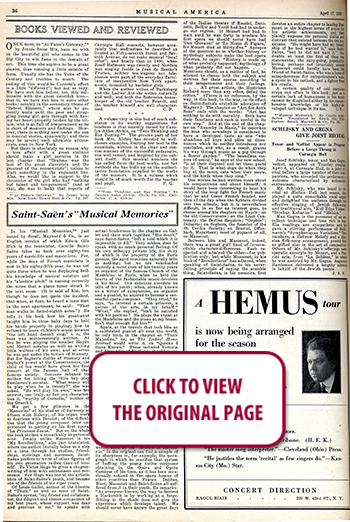 |
In his “Musical Memories,”* just issued by Small, Maynard & Co., in an English version of which Edwin Gile Rich is the translator, Camille Saint-Saëns takes us back over eighty-two years of music-life and music-love.
|
|
3 APRIL 1920
Page 15
Piano of Future Will Have Keyboard of Quarter Tones, Lhevinne Believes |
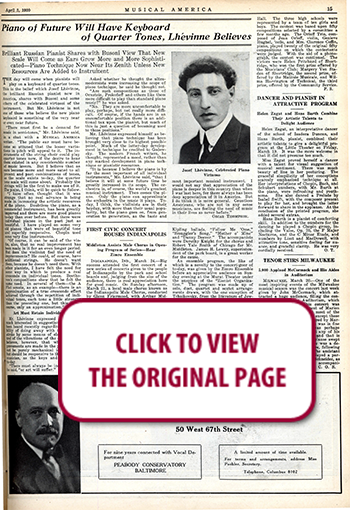 |
Brilliant Russian Pianist Shares with Busoni View That New Scale Will Come as Ears Grow More and More Sophisticated—Piano Technique Now Near Its Zenith Unless New Resources Are Added to Instrument
|
|
20 MARCH 1920
Page 29
Sowerby’s “Comes Autumn Time,” a Brilliant Musical Expression |
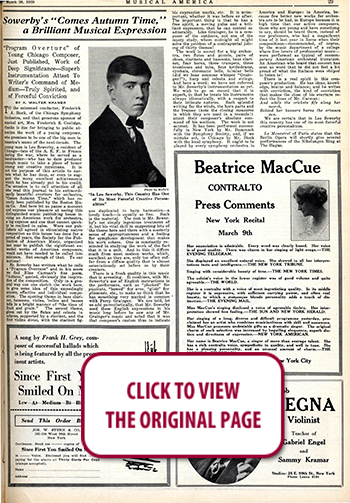 |
“Program Overture” of Young Chicago Composer, Just Published, Work of Deep Significance—Superb Instrumentation Attest To Writer’s Command of Medium—Truly Spirited, and of Forceful Conviction
|
|
20 MARCH 1920
Page 9
Julia Claussen Finds New Spirit in Post-War Music |
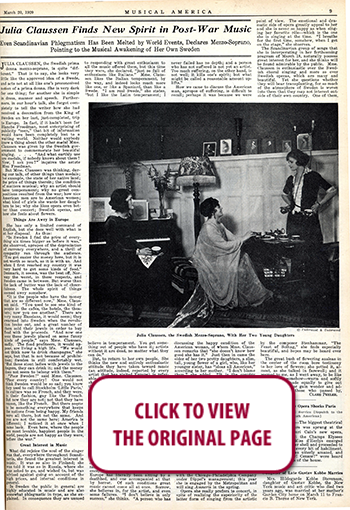 |
Even Scandinavian Phlegmatism Has Been Melted by World Events, Declares Mezzo-Soprano, Pointing to the Musical Awakening of Her Own Sweden
|
|
13 MARCH 1920
Page 5
EXPLORING THE ARTISTIC DEPTHS OF VAUDEVILLE |
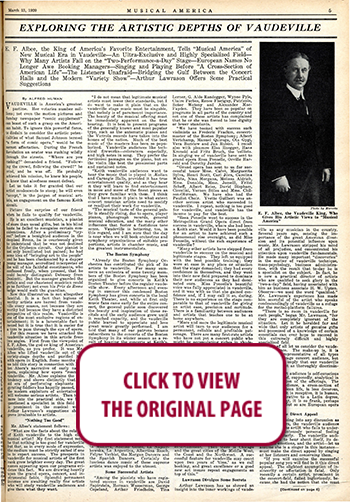 |
E. F. Albee, the King of America’s Favorite Entertainment, Tells “Musical America” of New Musical Era in Vaudeville—An Ultra-Exclusive and Highly Specialized Field—Why Many Artists Fail on the “Two-Performance-a-Day” Stage—European Names No Longer Awe Booking Managers—Singing and Playing Before “A Cross-Section of American Life”—The Listeners Unafraid—Bridging the Gulf Between the Concert Halls and the Modern “Variety Show”—Arthur Lawrason Offers Some Practical Suggestions
|
|
28 FEBRUARY 1920
Page 15
RAVEL AS THE MOLIÈRE OF MUSIC |
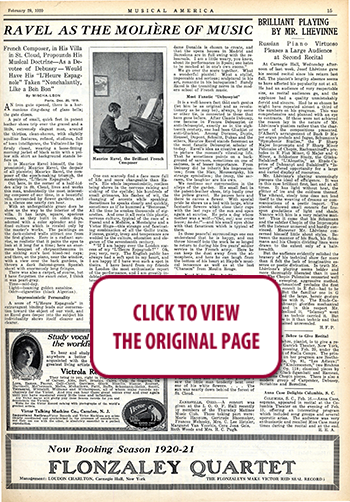 |
French Composer, in His Villa in St. Cloud, Propounds His Musical Doctrine—As a Devotee of Debussy—Would Have His “L’Heure Espagnole” Taken “Nonchalantly, Like a Bon Bon”
|
|
21 FEBRUARY 1920
Page 3
PROVIDING YOUNG GENIUS WITH BED AND BOARD |
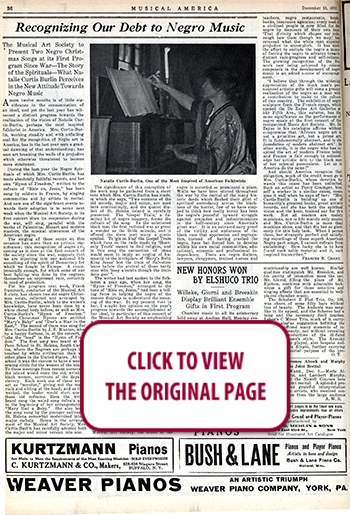 |
New Plan Projected by Florence McMillan, New York Pianist, for Housing Music Students—The Strides Made by the Club After a Year’s Work—Two Apartment Houses Transformed into Dwellings
|
|
14 FEBRUARY 1920
Page 33
NOTHING NEW ABOUT PAID-FOR APPLAUSE |
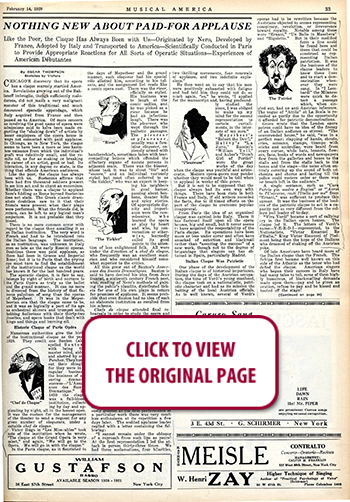 |
Like the poor, the Claque Has Always Been with Us—Originated by Nero, Developed by France, Adopted by Italy and Transported to America—Scientifically Conducted in Paris to Provide Appropriate Reactions for All Sorts of Operatic Situations—Experiences of American Debutantes
|
|
7 FEBRUARY 1920
Page 23
Lobbying as It Appears on Opening Night |
 |
Being Some Observations On the Professional Lobbyist at Work When the Chicago Opera Company Arrives in Town—Some Types That Haunt the Lobby When Opening Night Arrives—Kindly Gods That Rule in the World of Opera—Concerning the Lady From the Movies—The Chronic First Nighter Gives His Views—The Glamor That Memory Gives
|
|
31 JANUARY 1920
Page 3
Feverish Pace of Life in America Retards Our Cultural Advance, Says Richard Hageman |
 |
“We Live in a Perpetual Hurry,” Observes the Metropolitan Conductor—Urges a Federal Conservatory Where All Will Have Opportunity to Gain Careful Training—Appreciation of Best Drama and Literature a Crying Need—America Rich in Vocal Talent
|
|
24 JANUARY 1920
Page 9
GODOWSKY LAUDS RUSSIANS’ MUSICAL BROTHERHOOD |
 |
Good Fellowship of the Slav Artists Might Well Be Emulated, Declares the Famous Piano Master—His Friendship with Hofmann, de Pachmann and Other Eminent Musicians
|
|
17 JANUARY 1920
Page 39
Prague in the Blackest Years of the War, and How Two Opera Singers Fared Within Its Confines |
 |
The Exciting Experiences of Mary Cavan and Otakar Marak in the Czech Capital—Utilizing a Score to Carry Message to Allies—Meeting a German “Colleague” —A Stove as Singer’s Fee
|
|
17 JANUARY 1920
Page 37
Building Teachers Who Make Music Live for the Young; Is Steadfast Ideal of Julia Crane |
 |
Founder of Crane Normal Institute of Music Has Always Held to Belief that Music Study in Public Schools be on Par with Other Studies—Prospective Teacher Has Opportunity to Observe Every Phase of Public School Music Work—A Genuine Progressive
|
|
17 JANUARY 1920
Page 35
Making Organ-Playing for the Movies an Art |
 |
What a Church Organist Needs to Learn to Play for Film-Plays, Told By Edith Lang of Boston—Opera as a Model but Music Must Not be Too Conspicuous—“Highbrow” Music Does Appeal—The Player’s Equipment
|
|
17 JANUARY 1920
Page 1
MAUD POWELL DIES SUDDENLY WHILE ON CONCERT TOUR |
 |
Greatest of Women Violinists Is Victim of Acute Indigestion in Uniontown, Pa. —Every Civilized Country Paid Homage to Her Genius—Toured Europe as Representative of American Musicians and Represented Native Musicians at World’s Fair in Chicago—Introduced Bruch, Tchaikovsky and Other Important Works in the United States
|
|
3 JANUARY 1920
Page 5
WHERE ARE THE PRODIGIES OF YESTERYEAR? |
 |
Appearances of Nine-Year-Old Maria Antonia and Eight-Year-Old Jerome Rappaport Suggest an Examination of the Careers of Other Wonder-Children—Some Notable Child-Geniuses Who Made Good and Have a Recognized Standing in the Musical World
|
|
27 DECEMBER 1919
Page 6
Modernism Effaces Melody and Form, Deplores Mme. Chaminade |
 |
French Composer Finds that “Music is a Negligible Matter in Modern-Day Works”—The Gullibility of the Public—Bringing Back Wagner Without Exaggeration
|
|
20 DECEMBER 1919
Page 18
CAMPANINI DIES AMID THE SCENES OF HIS TRIUMPHS |
 |
Famous Impresario, Champion of Progress in Opera-Giving, Passes Away in Chicago After Long Battle with Death—Fortune Gallo Heads the List of Possible Successors—Campanini’s Eventful Career as a Conductor in this Country and Abroad—Horatio W. Parker, the American Composer, and Luigi Illica, the leading Italian Opera Librettist, Die Within the Week
|
|
20 DECEMBER 1919
Page 2
U. S. GOVERNMENT GIVES OFFICIAL RECOGNITION TO MUSIC’S VITAL ASSISTANCE IN WINNING THE WAR |
 |
Statement Issued by Adjutant-General Harris Cites Indispensable Part Played in Conflict by Music—Plan to Make it Part of All Army Work—Department to Encourage and Promote All Study of Music
|
|
13 DECEMBER 1919
Page 36
Recognizing Our Debt to Negro Music |
 |
The Musical Art Society to Present Two Negro Christmas Songs at its First Program Since War—The Story of the Spirituals—What Natalie Curtis Burlin Perceives in the New Attitude Towards Negro Music
|
|
6 DECEMBER 1919
Page 5
Fokine Describes Creation of Russian Ballet |
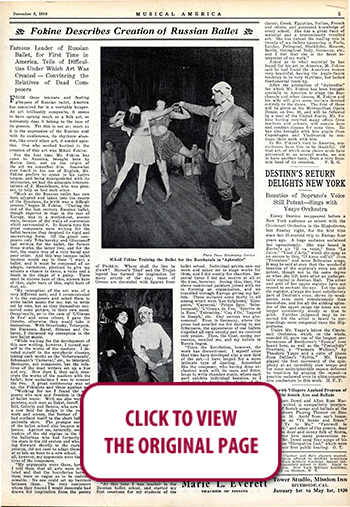 |
Famous Leader of Russian Ballet, for First Russian Time in America, Tells of Difficulties Under Which Art Was Created—Convincing the Relatives of Dead Composers
|
|
6 DECEMBER 1919
Page 3
Tetrazzini Sends Message of Affection to Americans |
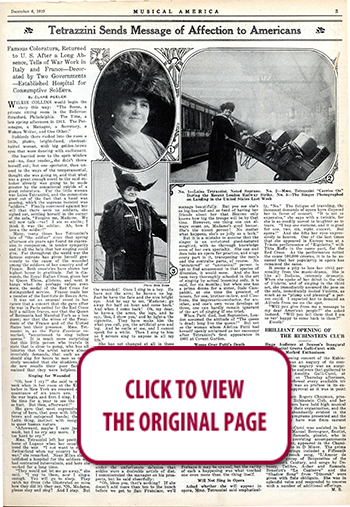 |
Famous Coloratura, Returned to U. S. After a Long Absence, Tells of War Work in Italy and France—Decorated by Two Governments—Established Hospital for Consumptive Soldiers
|
|
22 NOVEMBER 1919
Page 3
"LET SIMPLICITY BE THE COMPOSER’S CONSTANT OBJECTIVE," ADJURES ITALO MONTEMEZZI |
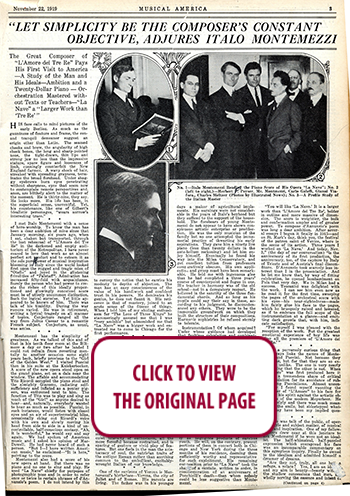 |
The Great Composer of “L’Amore dei Tre Re” Pays His First Visit to America—A Study of the Man and His Ideals—Ambition and a Twenty-Dollar Piano—Orchestration Mastered without Texts or Teachers—“La Nave” a “Larger Work than ‘Tre Re’”
|
|
15 NOVEMBER 1919
Page 5
Managerial Secrets Confided By Charles L. Wagner, America’s Only “Million-Dollar-a-Year” Impresario |
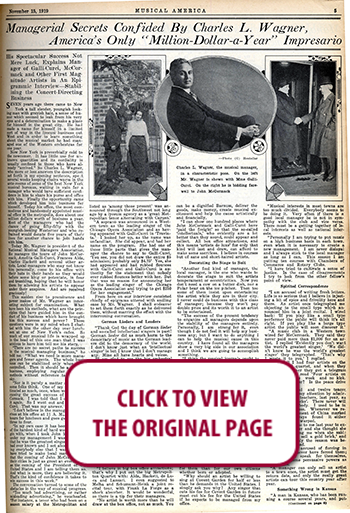 |
His Spectacular Success Not Mere Luck, Explains Manager of Galli-Curci, McCormack and Other First Magnitude Artists in An Epigrammic Interview—Stabilizing the Concert-Directing Business
|
|
1 NOVEMBER 1919
Page 15
LAST ACT OF THE HAMMERSTEIN DRAMA |
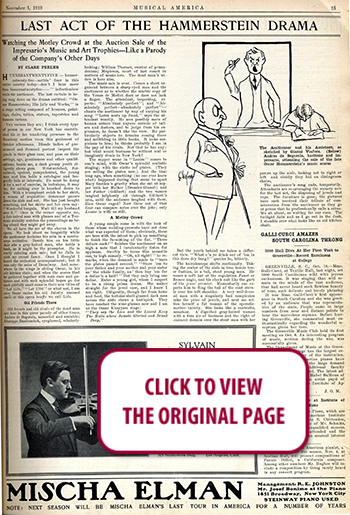 |
Watching the Motley Crowd at the Auction Sale of the Impresario’s Music and Art Trophies—Like a Parody of the Company’s Other Days
|
|
25 OCTOBER 1919
Page 13
THE POLITICIANS AND MUSIC |
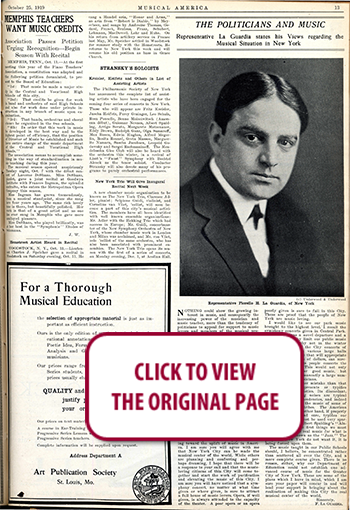 |
Representative La Guardia states his Views regarding the Musical Situation in New York
|
|
11 OCTOBER 1919
Page 32
ARTHUR RUBINSTEIN EXTOLS THE MODERNS |
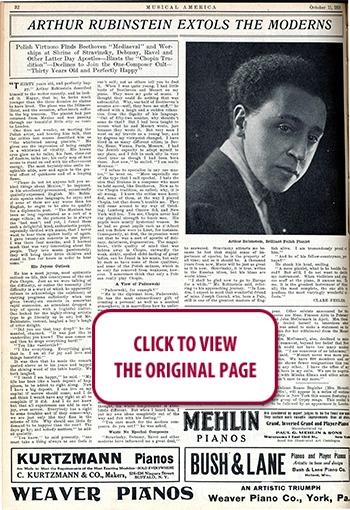 |
Polish Virtuoso Finds Beethoven “Mediaeval” and Worships at Shrine of Stravinsky, Debussy, Ravel and Other Latter Day Apostles—Blasts the “Chopin Tradition”—Declines to Join the One-Composer Cult—“Thirty Years Old and Perfectly Happy
|
|
11 OCTOBER 1919
Page 18
Strauss and Weingartner Face Operatic Battle in Vienna |
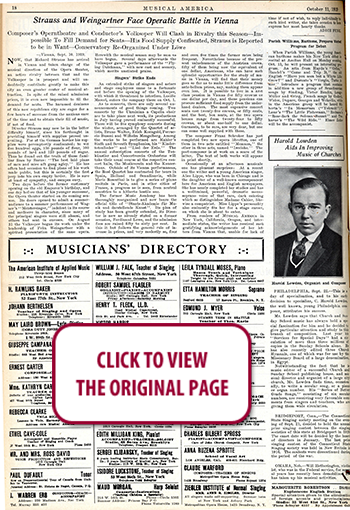 |
Composer’s Operntheatre and Conductor’s Volksoper Will Clash in Rivalry this Season—Impossible To Fill Demand for Seats—His Food Supply Confiscated, Strauss is Reported to be in Want—Conservatory Re-Organized Under Löwe
|
|
4 OCTOBER 1919
Page 4
Emmy Destinn, Patriot, Tells of Life as Political Prisoner |
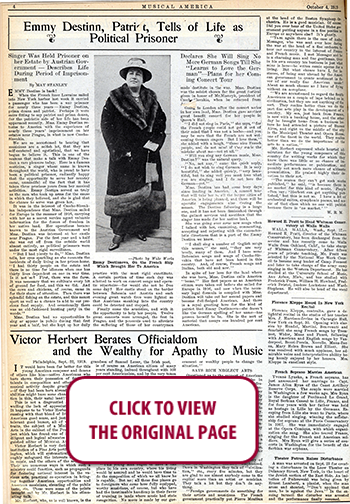 |
Singer Was Held Prisoner on her Estate by Austrian Government—Describes Life During Period of Imprisonment Declares She Will Sing No More German Songs Till She “Learns to Love the German” —Plans for her Coming Concert Tour
|
|
27 SEPTEMBER 1919
Page 30
ENRICO CARUSO WRITES TO MEPHISTO |
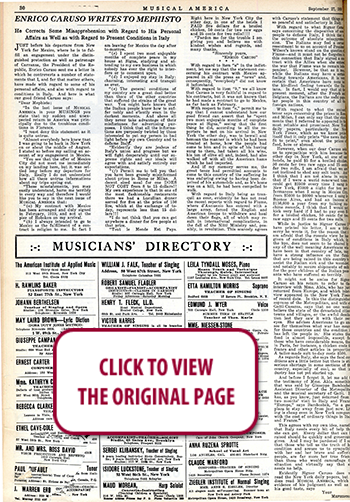 |
He Corrects Some Misapprehension with Regard to His Personal Affairs as Well as with Regard to Present Conditions in Italy
|
|
20 SEPTEMBER 1919
Page 5
How Puccini Got His Start, Related by His Schoolmate Tirindelli |
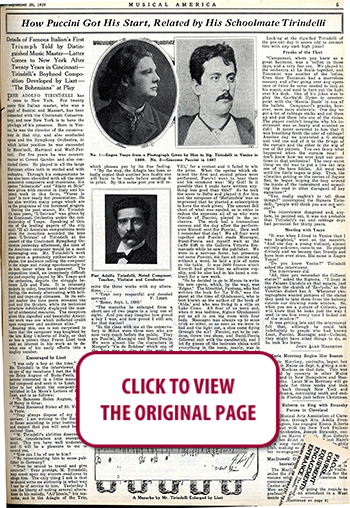 |
Details of Famous Italian’s First Triumph Told by Distinguished Music Master—Latter Comes to New York After Twenty Years in Cincinnati—Tirindelli’s Boyhood Composition Developed, by Liszt—“The Bohemians” at Play
|
|
20 SEPTEMBER 1919
Page 3
Concert-Managing as Catharine Bamman Sees It |
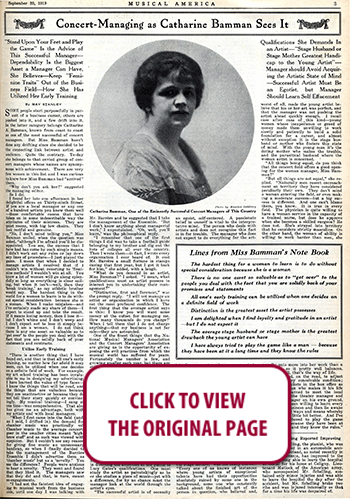 |
Stand Upon Your Feet and Play the Game” Is the Advice of This Successful Manager—Dependability Is the Biggest Asset a Manager Can Have, She Believes—Keep “Feminine Traits” Out of the Business Field—How She Has Utilized Her Early Training—Qualifications She Demands In an Artist—“Stage Husband or Stage Mother Greatest Handicap to the Young Artist” —Manager should A void Acquiring the Artistic State of Mind—Successful Artist Must Be an Egotist, but Manager Should Learn Self Effacement
|
|
13 SEPTEMBER 1919
Page 11
SHE “FLEW TO KEEP AN ENGAGEMENT” |
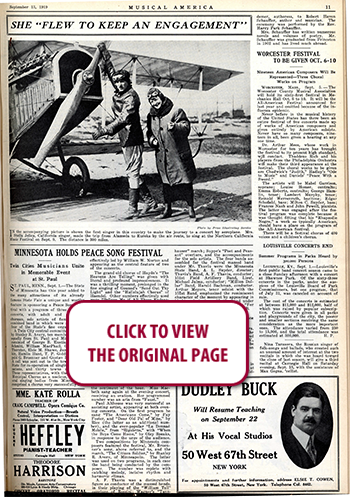 |
In the accompanying picture is shown the first singer in this country to make the journey to a concert by aeroplane. Mrs. Stella Jelica, California singer, made the trip from Alameda to Eureka by the air route, to sing at the Northern California Music Festival on Sept. 9. The distance is 300 miles.
|
|
6 SEPTEMBER 1919
Page 16
American Music Has Not Yet “Arrived,” Declares New Leader of Boston Symphony |
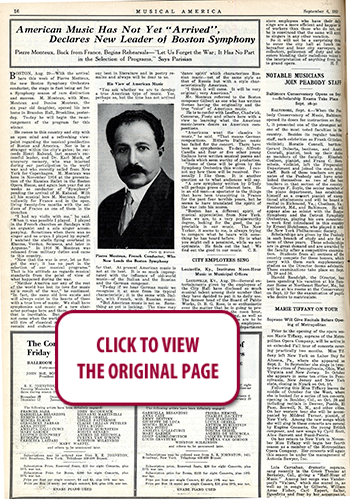 |
Pierre Monteux, Back from France, Begins Rehearsals—“Let Us Forget the War; It Has No Part in the Selection of Programs,” Says Parisian
|
|
23 AUGUST 1919
Page 29
Studying the Physical Aspect of Overtones |
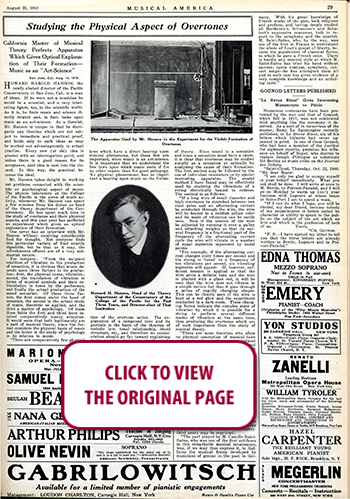 |
California Master of Musical Theory [Howard Hanson] Perfects Apparatus Which Gives Optical Explanation of Their Formation—Music as an “Art-Science”
|
|
16 AUGUST 1919
Page 24
Modern Calvinists and Their Pernicious Influence Upon Art |
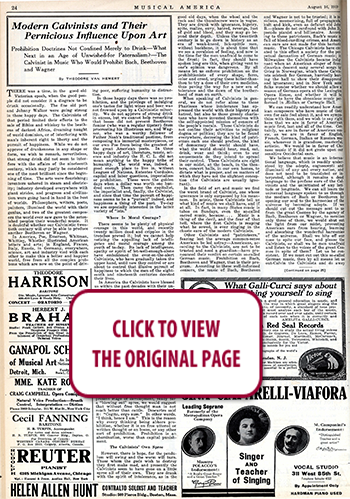 |
Prohibition Doctrines Not Confined Merely to Drink—What Next in an Age of Unwished-for Paternalism?—The Calvinist in Music Who Would Prohibit Bach, Beethoven and Wagner
|
|
16 AUGUST 1919
Page 6
EASTMAN’S BOUNTY GIVES ROCHESTER $3,700,000 SCHOOL |
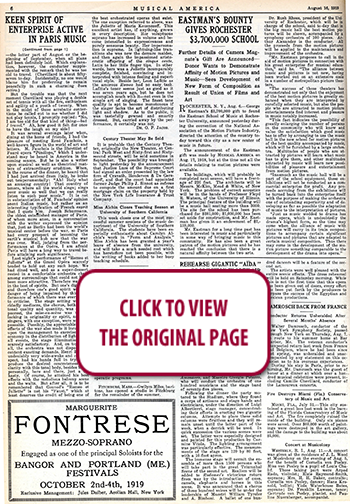 |
Further Details of Camera Magnate's Gift Are Announced—Donor Wants to Demonstrate Affinity of Motion Pictures and Music—Sees Development of New Form of Composition as Result of Union of Films and Art
|
|
2 AUGUST 1919
Page 37
Vladimir Resnikoff, Subtle Interpreter of Russia’s Unfamiliar Musical Strata |
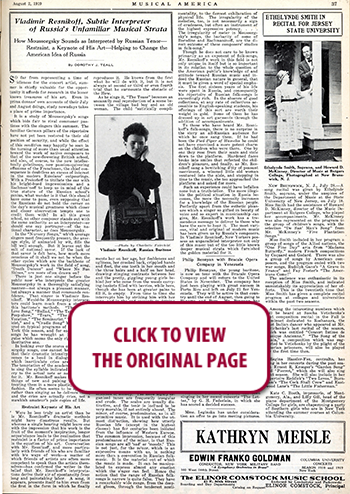 |
How Moussorgsky Sounds as Interpreted by Russian Tenor—Restraint, a Keynote of His Art—Helping to Change the American Idea of Russia
|
|
2 AUGUST 1919
Page 19
Covent Garden Opera “at Sixes and Sevens,” Asserts Maxwell |
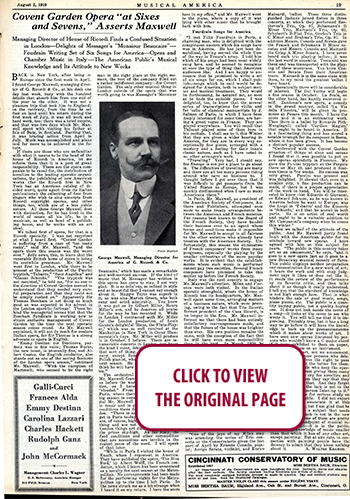 |
Managing Director of House of Ricordi Finds a Confused Situation in London—Delights of Messager’s “Monsieur Beaucaire” Fourdrain Writing Set of Six Songs for America—Opera and Chamber Music in Italy—The American Public’s Musical Knowledge and Its Attitude to New Works
|
|
2 AUGUST 1919
Page 16
STOKOWSKI AND THE AMERICAN COMPOSER |
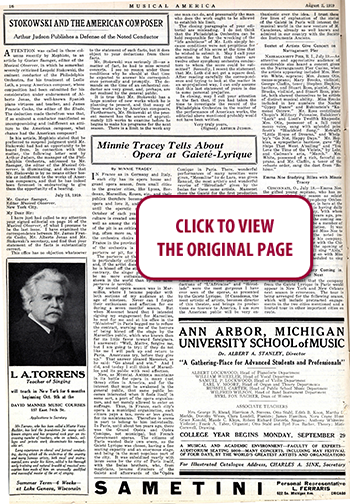 |
Arthur Judson Publishes a Defense of the Noted Conductor
|
|
2 AUGUST 1919
Page 3
Musicians and Their Handwriting—An Index to Character |
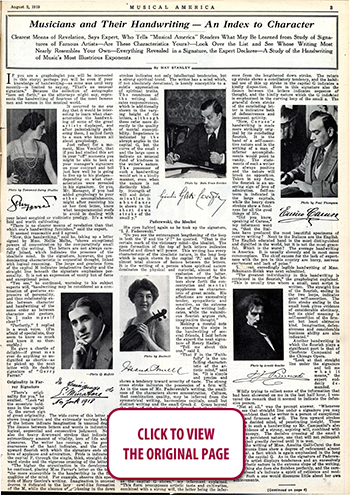 |
Clearest Means of Revelation, Says Expert, Who Tells “Musical America” Readers What May Be Learned from Study of Signatures of Famous Artists—Are These Characteristics Yours?—Look Over the List and See Whose Writing Most Nearly Resembles Your Own—Everything Revealed in a Signature, the Expert Declares—A Study of the Handwriting of Music’s Most Illustrious Exponents
|
|
26 JULY 1919
Page 23
Flees from Russian Bolshevism to Resume Her Musical Career |
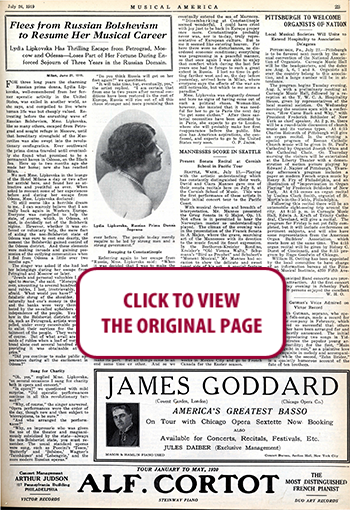 |
Lydia Lipkovska Has Thrilling Escape from Petrograd, Moscow and Odessa—Loses Part of Her Fortune During Enforced Sojourn of Three Years in the Russian Domain
|
|
19 JULY 1919
Page 13
INSTILLING IDEALISM INTO CONCERT MANAGEMENT |
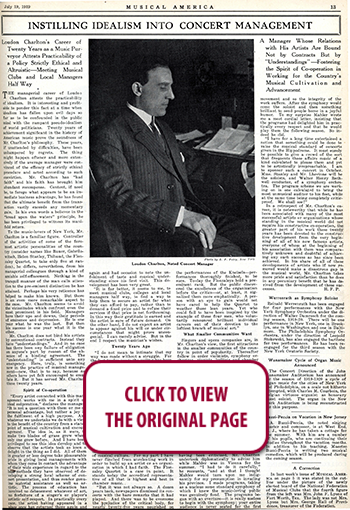 |
Loudon Charlton’s Career of Twenty Years as a Music Purveyor Attests Practicability of a Policy Strictly Ethical and Altruistic—Meeting Musical Clubs and Local Managers Half Way—A Manager Whose Relations with His Artists Are Bound Not by Contracts But by “Understandings” —Fostering the Spirit of Co-operation in Working for the Country’s Musical Cultivation and Advancement
|
|
12 JULY 1919
Page 25
HOFMANN SEES NO INSPIRATION IN MUSIC OF MODERNS: RUSSIAN SCHOOL THE RICHEST |
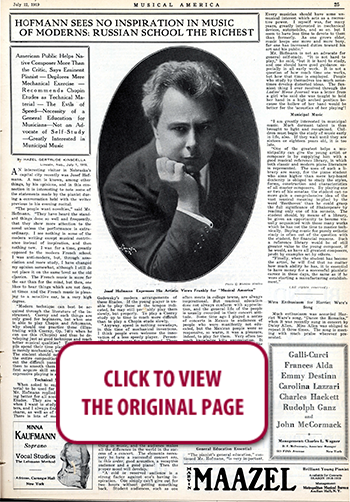 |
American Public Helps Native Composer More Than the Critic, Says Eminent Pianist—Deplores Mere Mechanical Exercise—Recommends Chopin Etudes as Technical Material—The Evils of Speed—Necessity of a General Education for Musicians—Not an Advocate of Self-Study—Greatly Interested in Municipal Music
|
|
5 JULY 1919
Page 5
TOSCANINI ANXIOUS TO RETURN, DECLARES SPALDING |
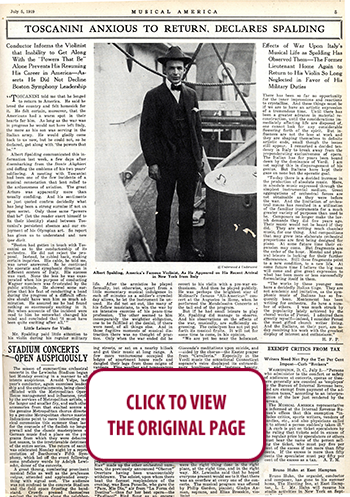 |
Conductor Informs the Violinist that Inability to Get Along With the “Powers That Be” Alone Prevents His Resuming His Career in America—Asserts He Did Not Decline Boston Symphony Leadership—Effects of War Upon Italy’s Musical Life as Spalding Has Observed Them—The Former Lieutenant Home Again to Return to His Violin So Long Neglected in Favor of His Military Duties
|
|
5 JULY 1919
Page 1
WILL OF A. D. JUILLIARD BEQUEATHS $20,000,000 FOR ESTABLISHMENT OFMUSICAL FOUNDATION IN AMERICA |
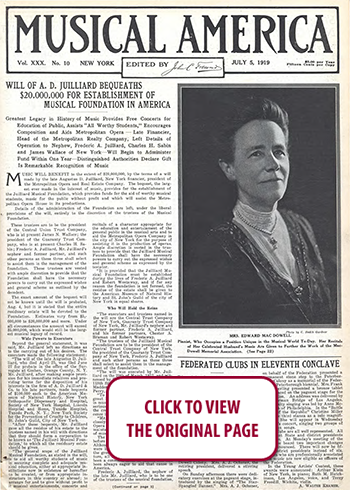 |
Greatest Legacy in History of Music Provides Free Concerts for Education of Public, Assists “All Worthy Students,” Encourages Composition and Aids Metropolitan Opera—Late Financier, Head of the Metropolitan Realty Company; Left Details of Operation to Nephew, Frederic A. Juilliard, Charles H. Sabin and James Wallace of New York—Will Begin to Administer Fund Within One Year—Distinguished Authorities Declare Gift Is Remarkable Recognition of Music
|
|
28 JUNE 1919
Page 37
STRAUSS CENTER OF TEMPEST THAT SHOOK VIENNA OPERA |
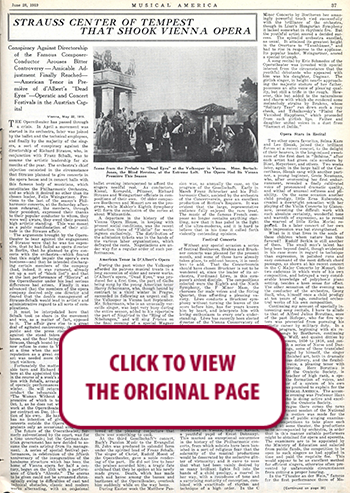 |
Conspiracy Against Directorship of the Famous Composer Conductor Arouses Bitter Controversy—Amicable Adjustment Finally Reached—American Tenor in Premiere of d’Albert’s “Dead Eyes” —Operatic and Concert Festivals in the Austrian Capital
|
|
28 JUNE 1919
Page 14
FINDING THE ELUSIVE SOUL OF THE PIANO |
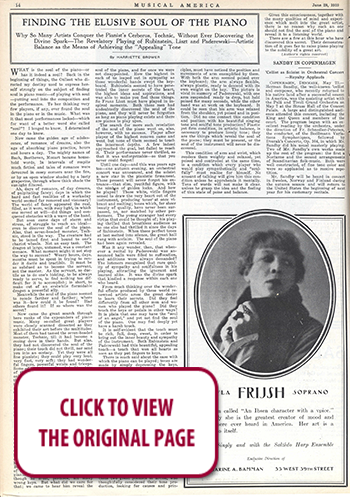 |
Why So Many Artists Conquer the Pianist’s Cerberus, Technic, Without Ever Discovering the Divine Spark—The Revelatory Playing of Rubinstein, Liszt and Paderewski—Artistic Balance as the Means of Achieving the “Appealing” Tone
|
|
28 JUNE 1919
Page 3
HOW MILTON ABORN BATTLED FOR AMERICAN OPERA |
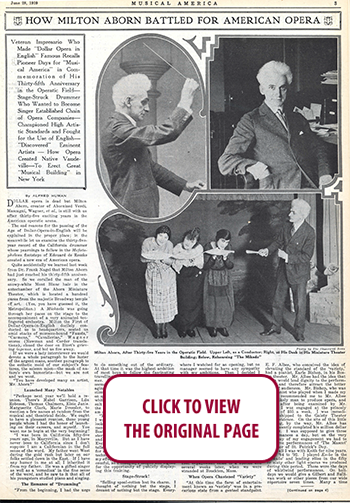 |
Veteran Impresario Who Made “Dollar Opera in English” Famous Recalls pioneer Days for “Musical America” in Commemoration of His Thirty-fifth Anniversary inthe Operatic Field—Stage-Struck Drummer Who Wanted to Become Singer Established Chain of Opera Companies—Championed High Artistic Standards and Fought for the Use of English—”Discovered” Eminent Artists—How Opera Created Native Vaudeville—To Erect Great “Musical Building” in New York
|
|
21 JUNE 1919
Page 34
Rubinstein: Almost a Classic Composer |
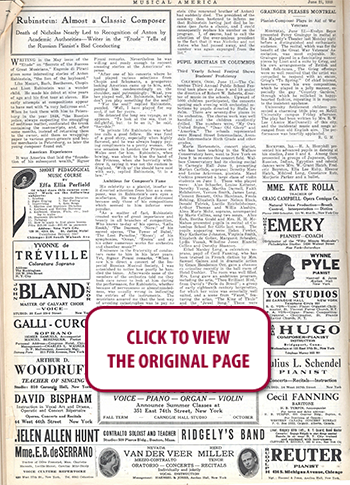 |
Death of Nicholas Nearly Led to Recognition of Anton by Academic Authorities—Writer in the “Etude” Tells of the Russian Pianist’s Bad Conducting
|
|
14 JUNE 1919
Page 16
Coaching—An Arduous Art |
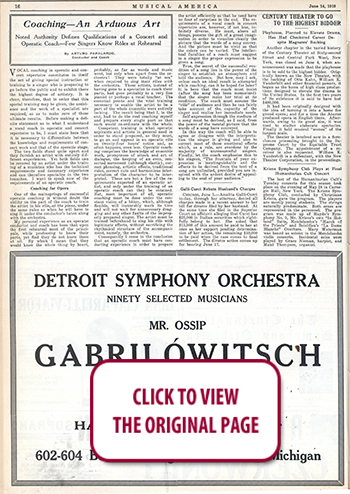 |
Noted Authority Defines Qualifications of a Concert and Operatic Coach—Few Singers Know Rôles at Rehearsal
|
|
7 JUNE 1919
Page 30
APPLYING RELAXATION PRINCIPLES |
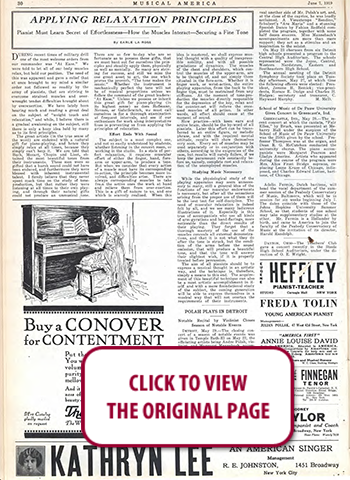 |
Pianist Must Learn Secret of Effortlessness—How the Muscles Interact—Securing a Fine Tone
|
|
31 MAY 1919
Page 19
Says Russian Bolsheviki Revel in Music of Ultra-Modern Type |
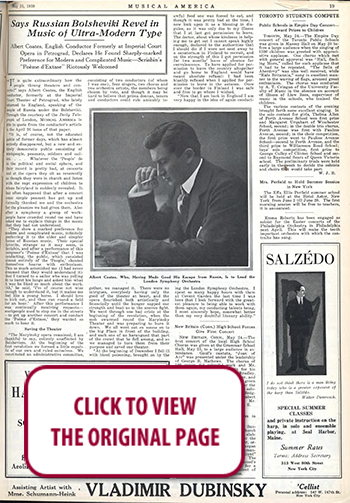 |
Albert Coates, English Conductor Formerly at Imperial Court Opera in Petrograd, Declares He Found Sharply-marked Preference for Modern and Complicated Music—Scriabin’s “Poème d’Extase” Riotously Welcomed
|
|
24 MAY 1919
Page 52
Galli-Curci Declares Her Faith in the American Song Composer |
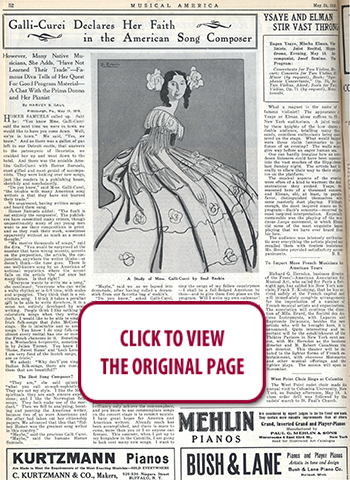 |
However, Many Native Musicians, She Adds, “Have Not Learned Their Trade”—Famous Diva Tells of Her Quest For Good Program Material—A Chat With the Prima Donna and Her Pianist
|
|
26 APRIL 1919
Page 5
International Ideals to Rule Programs, Says Monteux, New Conductor of the Boston Symphony Orchestra |
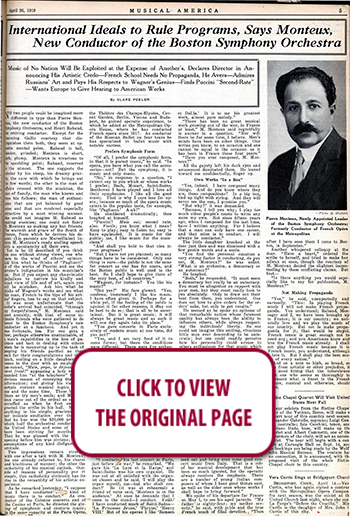 |
Music of No Nation Will Be Exploited at the Expense of Another’s, Declares Director in Announcing His Artistic Credo—French School Needs No Propaganda, He Avers—Admires Russians’ Art and Pays His Respects to Wagner’s Genius—Finds Puccini “Second-Rate”—Wants Europe to Give Hearing to American Works Barefoot, Unclad Soldiers Beating Back Foes—Ernest Schelling Working Side by Side with His Colleague
|
|
12 APRIL 1919
Page 32
“All Poland Entrusts Its Destiny Into Hands of Paderewski, the Non-Partisan” |
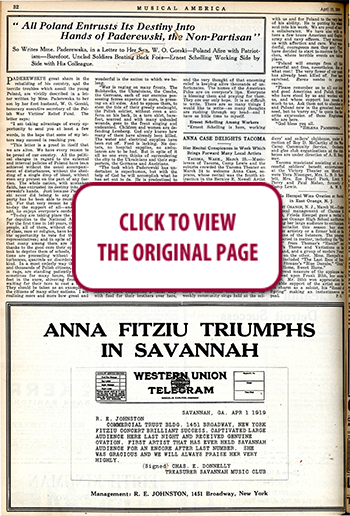 |
So Writes Mme. Paderewska, in a Letter to Her Son, W. 0. Gorski—Poland Afire with Patriotism—Barefoot, Unclad Soldiers Beating Back Foes—Ernest Schelling Working Side by Side with His Colleague
|
|
5 APRIL 1919
Page 15
Music’s Future Belongs to the Extremists, Declares Alfredo Casella |
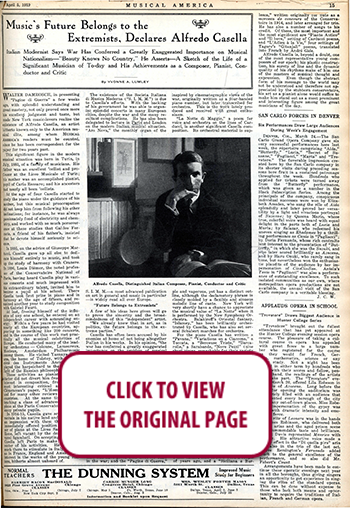 |
Italian Modernist Says War Has Conferred a Greatly Exaggerated Importance on Musical Nationalism—“Beauty Knows No Country,” He Asserts—A Sketch of the Life of a Significant Musician of To-day and His Achievements as a Composer, Pianist, Conductor and Critic
|
|
5 APRIL 1919
Page 9
Reveals Hofmann as Skilled Machinist and Inventor of Shock-Absorber |
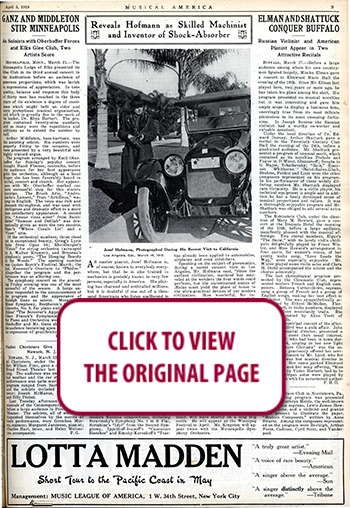 |
As master pianist, Josef Hofmann is, of course, known to everybody everywhere, but that he is also trained in mechanics is probably known to very few persons, especially in America....
|
|
29 MARCH 1919
Page 1
CHEERS FOR CARUSO AS HE CELEBRATES HIS SILVER JUBILEE |
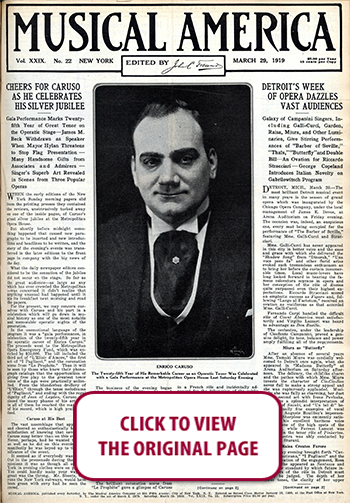 |
Gala Performance Marks Twenty-fifth Year of Great Tenor on the Operatic Stage—James M. Beck Withdraws as Speaker When Mayor Hylan Threatens to Stop Flag Presentation—Many Handsome Gifts from Associates and Admirers—Singer’s Superb Art Revealed in Scenes from Three Popular Operas
|
|
22 MARCH 1919
Page 21
Practical Problems of Music Students’ Life in Paris During the Ante-Bellum Days |
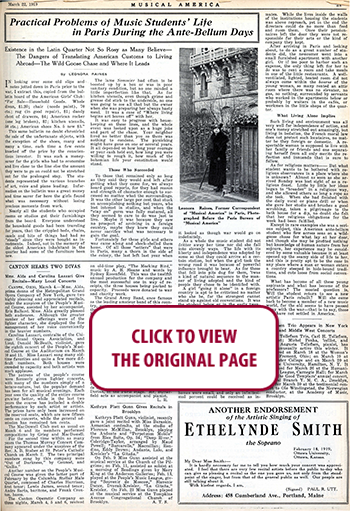 |
Existence in the Latin Quarter Not So Rosy as Many Believe—The Dangers of Translating American Customs to Living Abroad—The Wild Goose Chase and Where It Leads
|
|
8 MARCH 1919
Page 13
Criticism a More Serious Art in Russia Than Here, Says Prokofieff |
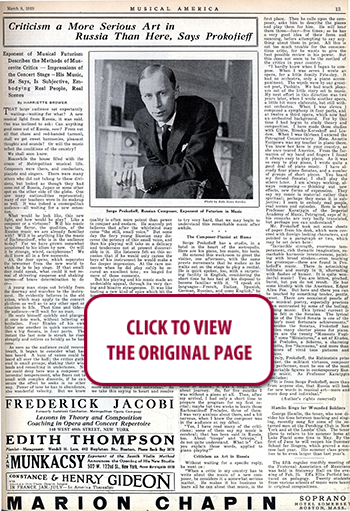 |
Exponent of Musical Futurism Describes the Methods of Muscovite Critics—Impressions of the Concert Stage—His Music, He Says, Is Subjective, Embodying Real People, Real Scenes
|
|
15 FEBRUARY 1919
Page 48
SPANISH MUSRC, A BRILLIANT, UNEXPLORED FIELD, DECLARES ARTHUR RUBINSTEIN |
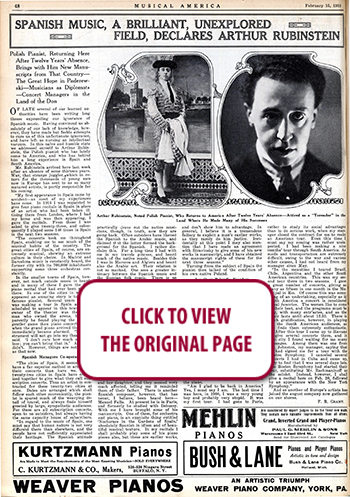 |
Polish Pianist, Returning Here After Twelve Years’ Absence, Brings with Him New Manuscripts from That Country—The Great Hope in Paderewski—Musicians as Diplomats—Concert Managers in the Land of the Don
|
|
15 FEBRUARY 1919
Page 15
RE-CREATING FAMILIAR PIANO PIECES |
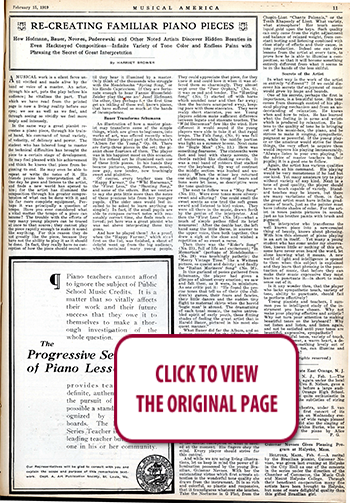 |
How Hofmann, Bauer, Novaes, Paderewski and Other Noted Artists Discover Hidden Beauties in Even Hackneyed Compositions—Infinite Variety of Tone Color and Endless Pains with Phrasing the Secret of Great Interpretation
|
|
15 FEBRUARY 1919
Page 5
PIANISTS BECOME PRIME MINISTERS—WHAT NEXT? ASKS MR. GODOWSKY |
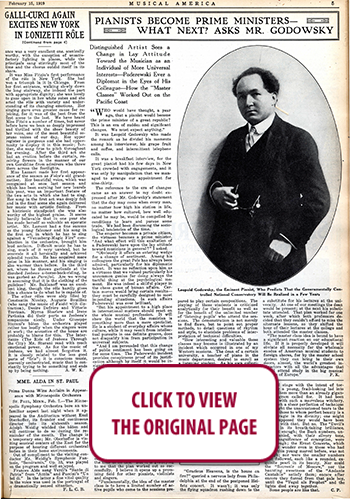 |
Distinguished Artist Sees a Change in Lay Attitude Toward the Musician as an Individual of More Universal Interests—Paderewski Ever a Diplomat in the Eyes of His Colleague—How the “Master Classes” Worked Out on the Pacific Coast
|
|
15 FEBRUARY 1919
Page 3
Watching Mary Garden, the Many-Sided, As She Rehearses Her “Mélisande” |
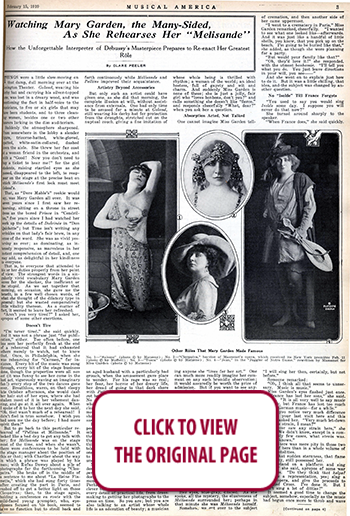 |
How the Unforgettable Interpreter of Debussy’s Masterpiece Prepares to Re-enact Her Greatest Rôle
|
|
18 JANUARY 1919
Page 9
DEVELOPMENT OF RHYTHMIC SENSE POSSIBLE TO ALL |
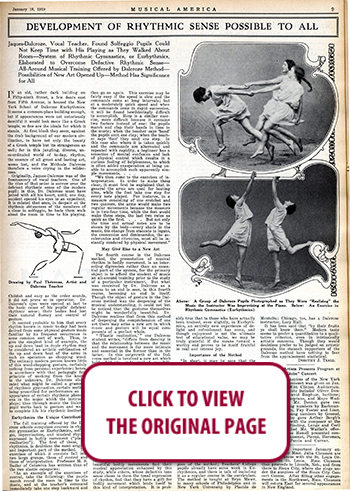 |
Jaques-Dalcroze, Vocal Teacher, Found Solfeggio Pupils Could Not Keep Time with His Playing as They Walked About Room—System of Rhythmic Gymnastics, or Eurhythmics, Elaborated to Overcome Defective Rhythmic Sense—All-Around Musical Training Offered by Dalcroze Method—Possibilities of New Art Opened Up—Method Has Significance for All
|
|
4 JANUARY 1919
Page 17
What a Steel King is Doing for British Music |
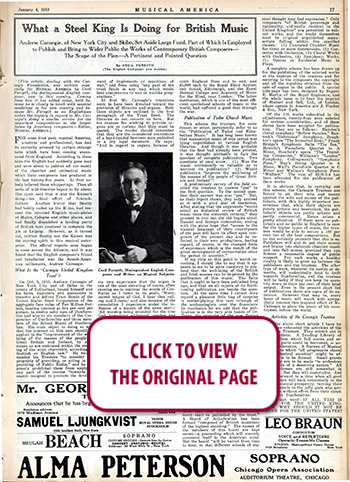 |
Andrew Carnegie, of New York City and Skibo, Set Aside Large Fund, Part of Which Is Employed to Publish and Bring to Wider Public the Works of Contemporary British Composers—The Scope of the Plan—A Pertinent and Pointed Question
|
|
28 DECEMBER 1918
Page 4
War Has Set Women Free, Says Mary Garden, Back From France |
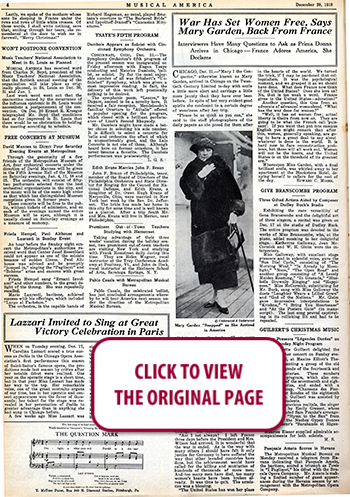 |
Interviewers Have Many Questions to Ask as Prima Donna Arrives in Chicago—France Adores America, She Declares
|
|
28 DECEMBER 1918
Page 3
“All Would Be Prima Donnas—But Do They Realize What It Means?’’—Schumann-Heink |
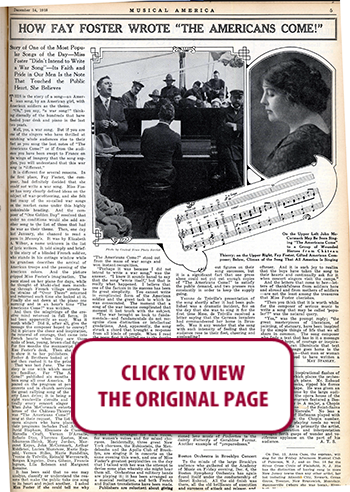 |
A Chapter from Her Own Life Tells of the Infinite Struggle, the Self-Restraint Which Alone Can Lead to Success—Noted Diva in Heart-to-Heart Talk Reveals Her Philosophy as to Life and Art— What the Coming of Peace Has Brought Her
|
|
21 DECEMBER 1918
Page 13
The Duncan Disciples at Home and at Rehearsal |
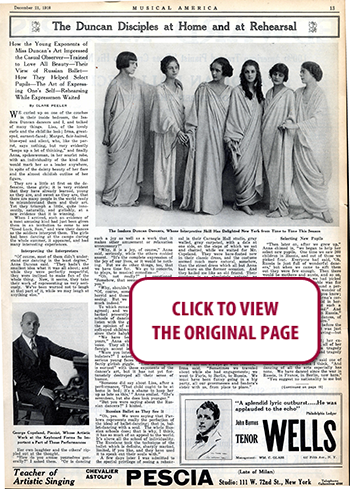 |
How the Young Exponents of Miss Duncan’s Art Impressed the Casual Observer—Trained to Love All Beauty—Their View of Russian Ballet—How They Helped Select Pupils—The Art of Expressing One’s Self—Rehearsing While Expressmen Waited
|
|
21 DECEMBER 1918
Page 5
“Singing with the A.E.F.,” Described By Amparito Farrar |
 |
Young American Soprano Tells of Her Experiences on Tour for the Overseas Theater League—“Concert Halls” Were “Any Place One Found Men to Sing To—How She Sang for the Crowds in Paris When the Armistice News Came
|
|
14 DECEMBER 1918
Page 5
HOW FAY FOSTER WROTE “THE AMERICANS COME!” |
 |
Story of One of the Most Popular Songs of the Day—Miss Foster “Didn’t Intend to Write a War Song” —Its Faith and Pride in Our Men Is the Note That Touched the Public Heart, She Believes
|
|
7 DECEMBER 1918
Page 3
RACHMANINOFF CHAMPIONS MUSIC OF NATIVE LAND |
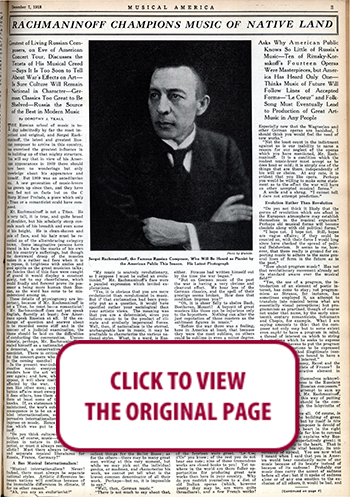 |
Greatest of Living Russian Composers, on Eve of American Concert Tour, Discusses the Tenets of His Musical Creed—Says It Is Too Soon to Tell About War’s Effects on Art—Sure Culture Will Remain National in Character—German Classics Too Great to Be Shelved—Russia the Source of the Best in Modern Music—Asks Why American Public Knows So Little of Russia’s Music—Ten of Rimsky-Korsakoff’s Fourteen Operas Were Masterpieces, but America Has Heard Only One—Thinks Music of Future Will Follow Lines of Accepted Forms—“Le Coeur” and Folk-Song Must Eventually Lead to Production of Great Art-Music in Any People
|
|
23 NOVEMBER 1918
Page 48
Life During Russian Revolution Described by Thelma Given |
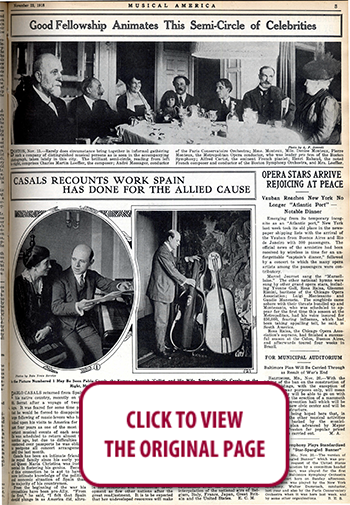 |
Brilliant Young Violinist Tells of the Eventful Days When Russia Threw Off the Romanoff Yoke—How Trotzky Rode About in the Czar’s Gold Chariot—Student Days with Leopold Auer at the Petrograd Conservatory—In Red Cross Garb Miss Given Lived Through First Week of Revolution—Russia Ideal Place for Study, She Says—Children Begin Musical Work When Five Years Old
|
|
23 NOVEMBER 1918
Page 3
CASALS RECOUNTS WORK SPAIN HAS DONE FOR THE ALLIED CAUSE |
 |
...From the beginning of the war his sympathies have been pro-Ally. “From the first,” he said, “I felt that Spain should plunge in as America did, altruistically, although the sinking of her ships was quite sufficient to have made her participation a defensive measure....
|
|
19 October 1918
Page 8
SUPERSTITIOUS? NEVER!—THAT IS—HARDLY EVER |
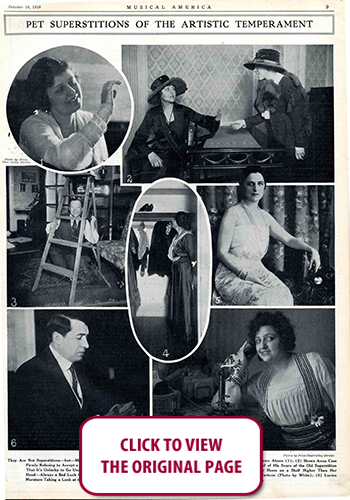 |
Your Operatic Star Doesn’t Believe in the Magic of Signs; But Then, It’s Always Better to Be on the Safe Side! Step Ladders. Shoes on the Shelf. The Whistler in the Dressing Room, the Charmed Ring and Other Bêtes Noires of Stagedom
|
|
28 September August 1918
Page 9
REPORTS FINE ARTS FLOURISHING IN “RED RUSSIA” |
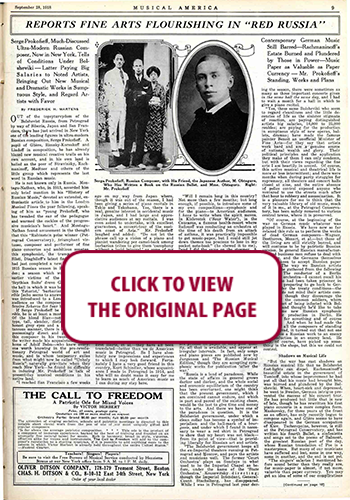 |
Serge Prokofieff, Much-Discussed Ultra-Modern Russian Composer, Now in New York, Tells of Conditions Under Bolsheviki—Latter Paying Big Salaries to Noted Artists, Bringing Out New Musical and Dramatic Works in Sumptuous Style, and Regard Artists with Favor—Contemporary German Music Still Barred—Rachmaninoff’s Estate Burned and Plundered by Those in Power—Music Paper as Valuable as Paper Currency—Mr. Prokofieff’s Standing, Works and Plans
|
|
7 September 1918
Page 5
America the Land of Promise and Fulfillment for One of Switzerland’s Most Gifted Sons— Ernest Bloch |
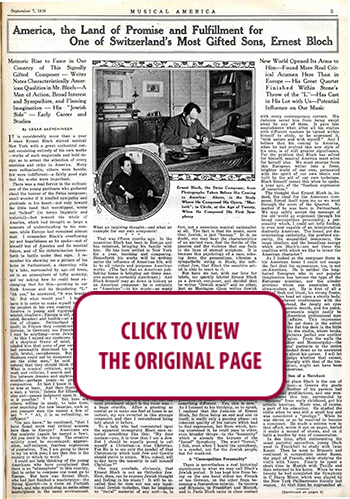 |
Meteoric Rise to Fame in Our Country of This Signally Gifted Composer—Writer Notes Characteristically American Qualities in Mr. Bloch—A Man of Action, Broad Interest and Sympathies, and Flaming Imagination—His “Jewish Side”—Early Career and Studies—New World Opened Its Arms to Him—Found More Real Critical Acumen Here Than in Europe—His Great Quartet Finished Within Stone’s Throw of the “L”—Has Cast in His Lot with Us—Potential Influence on Our Music
|
|
31 August 1918
Page 4
Caruso and His Bride Spend Honeymoon in New York |
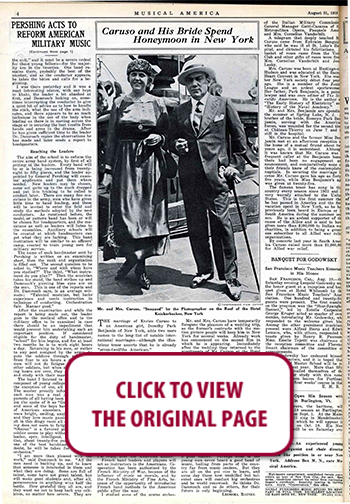 |
THE marriage of Enrico Caruso to an American girl, Dorothy Park Benjamin of New York, adds two more names to the long list of notable international marriages—although the illustrious tenor asserts that he is already “seven-twelfths American.”
|
|
17 August 1918
Page 32
“Camera!’’ Shouts Director as Caruso Enacts “Canio” |
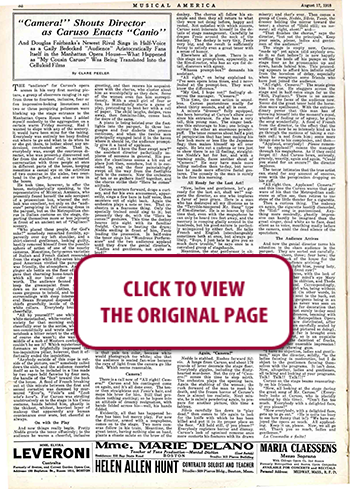 |
And Douglas Fairbanks’s Newest Rival Sings in Half-Voice as a Gaily Bedecked “Audience” Aristocratically Fans Itself in the Manhattan Opera House—What Happened as “My Cousin Caruso” Was Being Translated Into the Celluloid Films
|
|
10 August 1918
Page 9
What Music Means to Adolph Lewisohn, Patron Saint of the Stadium Series |
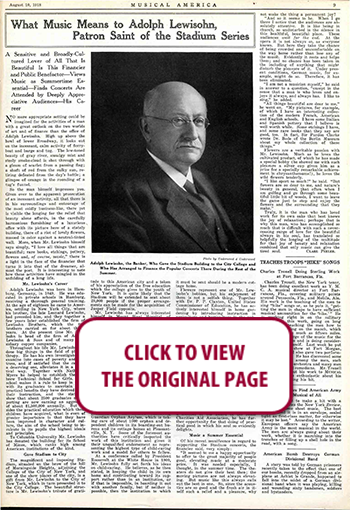 |
A Sensitive and Broadly Cultured Lover of All That Is Beautiful Is This Financier and Public Benefactor—Views Music as Summertime Essential—Finds Concerts Are Attended by Deeply Appreciative Audiences—His Career
|
|
3 August 1918
Page 32
PABLO CASALS ON SPANISH MUSIC |
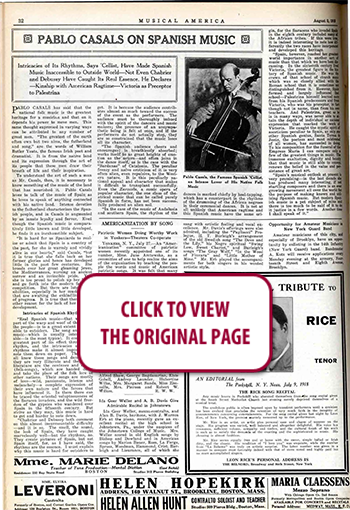 |
Intricacies of Its Rhythms, Says ‘Cellist, Have Made Spanish Music Inaccessible to Outside World—Not Even Chabrier and Debussy Have Caught Its Real Essence, He Declares—Kinship with American Ragtime—Victoria as Preceptor to Palestrina
|
|
3 August 1918
Page 16
Interpreting Music in Pastels Is George Barrère’s Art |
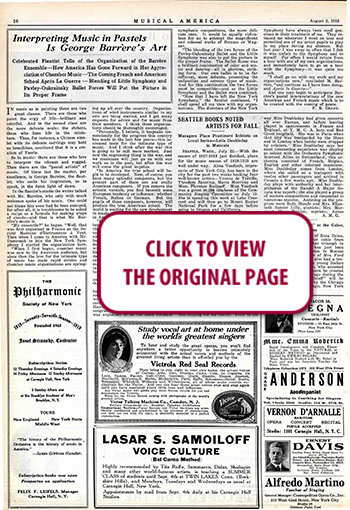 |
Celebrated Flautist Tells of the Organization of the Barrère Ensemble—How America Has Gone Forward in Her Appreciation of Chamber Music—The Coming French and American School Après La Guerre—Blending of Little Symphony and Pavley-Oukrainsky Ballet Forces Will Put the Picture in Its Proper Frame
|
|
3 August 1918
Page 3
CARUSO AROUSES SEASHORE THRONG WITH HIS SINGING |
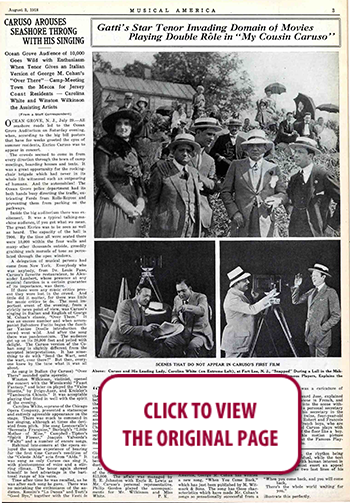 |
Ocean Grove Audience of 10,000 Goes Wild with Enthusiasm When Tenor Gives an Italian Version of George M. Cohan’s “Over There”—Camp-Meeting Town the Mecca for Jersey Coast Residents—Carolina White and Winston Wilkinson the Assisting Artists
|
|
27 July 1918
Page 4
Musician-Patriots Who Typify Their Countries in the War |
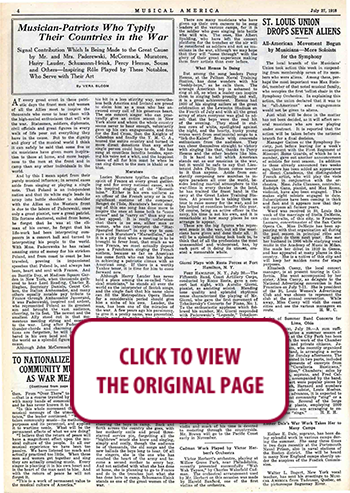 |
Signal Contribution Which Is Being Made to the Great Cause by Mr. and Mrs. Paderewski, McCormack, Muratore, Harry Lauder, Schumann-Heink, Percy Hemus, Sousa and Others—Inspiring Role Played by These Notables, Who Serve with Their Art
|
|
20 July 1918
Page 14
A Master Pianist on Music Study |
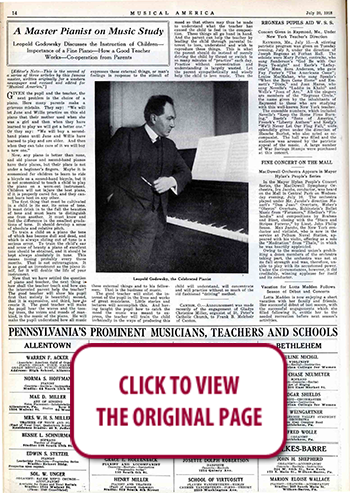 |
Leopold Godowsky Discusses the Instruction of Children—Importance of a Fine Piano—How a Good Teacher Works—Co-operation from Parents
|
|
20 July 1918
Page 5
Marked Musical Activity in Italy, Reports Ugo Ara, Back on Furlough |
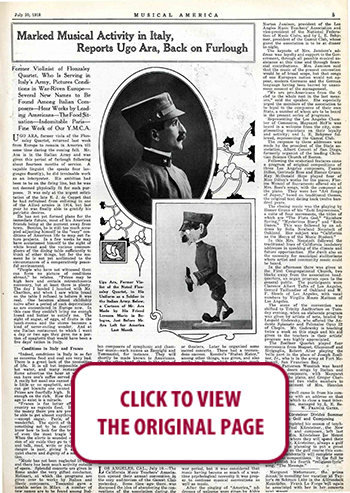 |
Former Violinist of Flonzaley Quartet, Who Is serving in Italy’s Army, Pictures Conditions in War-Riven Europe—Several New Names to Be Found Among Italian Composers—Hear Works by Leading Americans—the Food Situation—Indomitable Paris—Fine Work of Our Y.M.C.A.
|
|
13 July 1918
Page 30
When the Fiddler and Singing Master Provided Joy in the South of Long Ago |
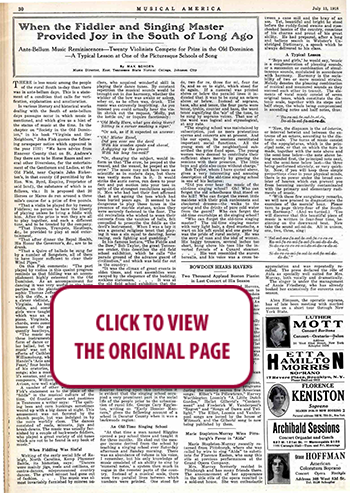 |
Ante-Bellum Music Reminicences—Twenty Violinists Compete for Prize in the Old Dominion—A Typical Lesson at One of the Picturesque Schools of Song
|
|
8 June 1918
Page 25
GENNARO CURCI RECALLS THE DISCOVERY OF HIS FAMED SISTER-IN-LAW—GALLI-CURCI |
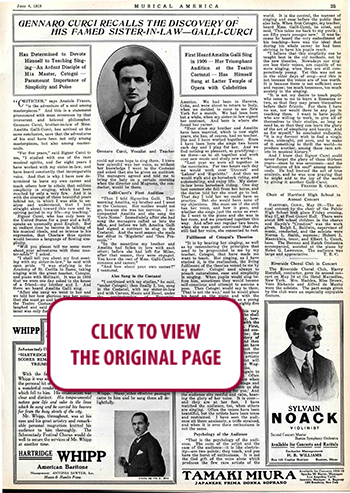 |
Has Determined to Devote Himself to Teaching Singing—An Ardent Disciple of His Master, Cotogni—Paramount Importance of Simplicity and Poise—First Heard Amelita Galli Sing in 1909—Her Triumphant Audition at the Teatro Costanzi—Has Himself Sung at Latter Temple of Opera with Celebrities
|
|
8 June 1918
Page 5
Hints on Building and Interpreting Song Programs, Proffered by Frank LaForge |
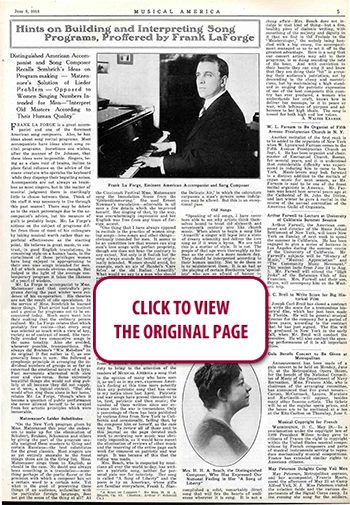 |
Distinguished American Accompanist and Song Composer Recalls Sembrich’s Ideas on Program-making—Matzenauer’s Solution of Lieder Problem—Opposed to Women Singing Numbers Intended for Men—“lnterpret Old Masters According to Their Human Quality”
|
|
25 May 1918
Page 31
Chief of Claque Defends His Calling; Says Public Is Too Apathetic to Applaud |
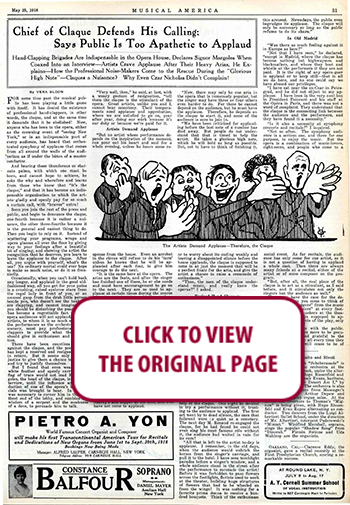 |
Hand-Clapping Brigades Are Indispensable in the Opera House, Declares Signor Margoles When Coaxed Into an Interview—Artists Crave Applause After Their Heavy Arias, He Explains—How the Professional Noise~Makers Come to the Rescue During the “Glorious High Note”—Claques a Nuisance? Why Even Czar Nicholas Didn’t Complain!
|
|
18 May 1918
Page 45
Leaves from Diary of Guy Maier, Pianist, with Our Forces Overseas |
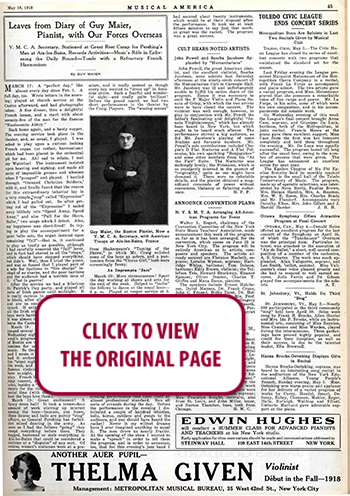 |
Y. M. C. A. Secretary, Stationed at Great Rest Camp for Pershing’s Men at Aix-les-Bains, Records Activities—Music’s Rôle in Enlivening the Daily Round—Tussle with a Refractory French Harmonium
|
|
18 May 1918
Page 27
A Casals’s Summer Retreat on the Shores of the Mediterranean |
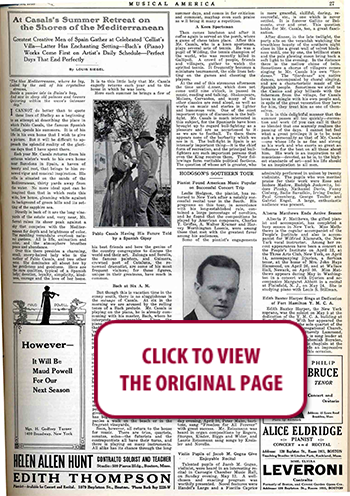 |
Greatest Creative Men of Spain Gather at Celebrated ‘Cellist’s Villa—Latter Has Enchanting Setting—Bach’s (Piano) Works Come First on Artist’s Daily Schedule—Perfect Days That End Perfectly
|
|
11 May 1918
Page 31
Bailly Recalls the First Rehearsals of “Pelléas et Mélisande” |
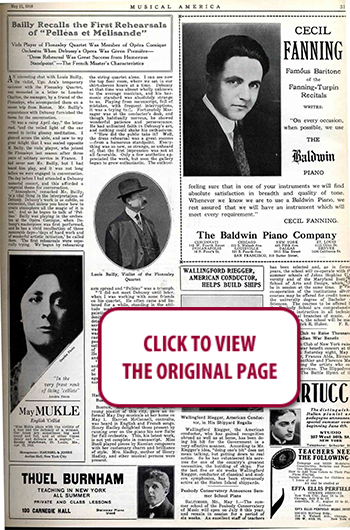 |
Viola Player of Flonzaley Quartet Was Member of Opéra Comique Orchestra When Debussy’s Opera Was Given Première—”Dress Rehearsal Was Great Success from Humorous Standpoint”—The French Master’s Characteristics
|
|
27 April 1918
Page 17
Men Defending France Refuse to Ban German Music Masters of the Past |
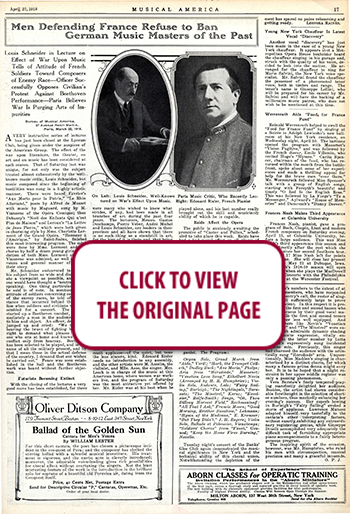 |
Louis Schneider in Lecture on Effect of War Upon Music Tells of Attitude of French Soldiers Toward Composers of Enemy Race—Officer Successfully Opposes Civilian’s Protest Against Beethoven Performance—Paris Believes War Is Purging Arts of Impurities
|
|
27 April 1918
Page 15
ECHOES OF MUSIC ABROAD |
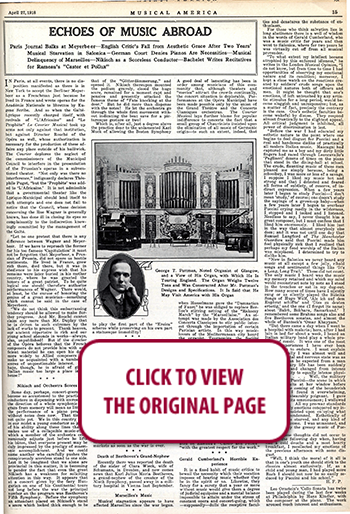 |
Paris Journal Balks at Meyerbeer—English Critic’s Fall from Aesthetic Grace After Two Years’ Musical Starvation in Salonica—German Court Denies Pianos Are Necessities—Musical Delinquency of Marseilles—Nikisch as a Scoreless Conductor—Bachelet Writes Recitatives for Rameau’s “Castor et Pollux”
|
|
27 April 1918
Page 2
WHO WILL BE DR. MUCK’S SUCCESSOR? |
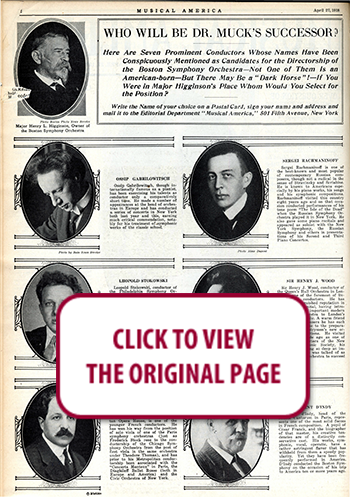 |
Here Are Seven Prominent Conductors Whose Names Have Been Conspicuously Mentioned as Candidate for the Directorship of the Boston Symphony Orchestra—Not One of Them Is an American-born—But There May Be a “Dark Horse”!—If You Were in Major Higginson’s Place Whom Would You Select for the Position?
|
|
13 April 1918
Page 15
Classic Walls of La Scala Resound with American Airs at Allies’ Concert |
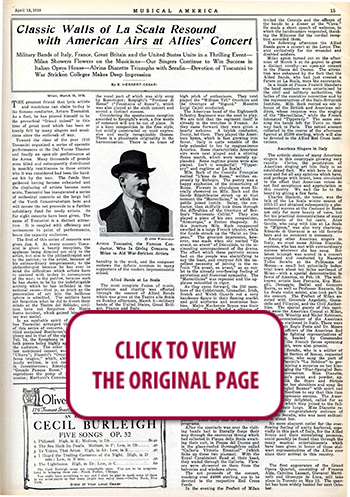 |
Military Bands of Italy, France, Great Britain and the United States Unite in a Thrilling Event—Milan Showers Flowers on the Musicians—Our Singers Continue to Win Success in Italian Opera House—Alvina Dianette Triumphs with Serafin—Devotion of Toscanini to War-Stricken Colleges Makes Deep Impression
|
|
13 April 1918
Page 5
DEBUSSY THE MAN, AS MAGGIE TEYTE KNEW HI |
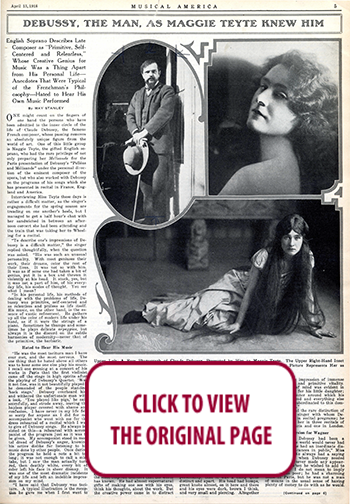 |
English Soprano Describes Late Composer as “Primitive, Self-Centered and Relentless,” Whose Creative Genius for Music Was a Thing Apart from His Personal Life—Anecdotes That Were Typical of the Frenchman’s Philosophy—Hated to Hear His Own Music Performed
|
|
30 March 1918
Page 11
Pasquale Amato Tells How He Obtained First Engagement |
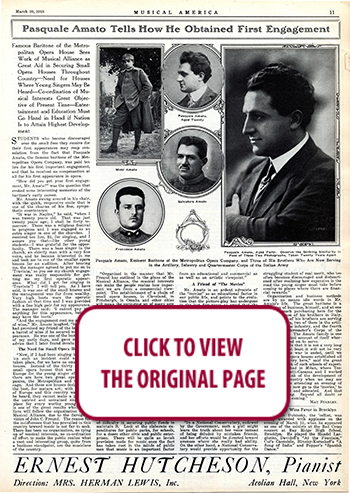 |
Famous Baritone of the Metropolitan Opera House Sees Work of Musical Alliance as Great Aid in Securing Small Opera Houses Throughout Country—Need for Houses Where Young Singers May Be Heard—Co-ordination of Musical Interests Great Objective of Present Time—Entertainment and Education Must Go Hand in Hand if Nation Is to Attain Highest Development
|
|
30 March 1918
Page 9
Opera’s Oldest Usher Discusses the “Good Old Days” |
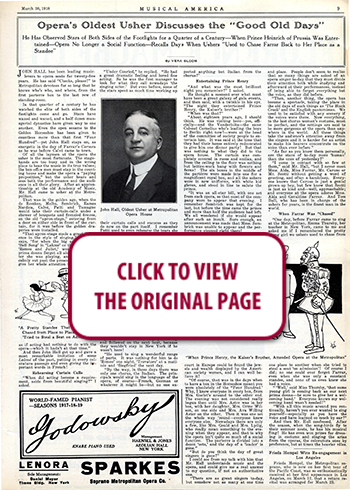 |
He Has Observed Stars of Both Sides of the Footlights for a Quarter of a Century—When Prince Heinrich of Prussia Was Entertained—Opera No Longer a Social Function—Recalls Days When Ushers “Used to Chase Farrar Back to Her Place as a Standee”
|
|
9 March 1918
Page 11
When Campanini and Maurel Stirred New York; “Touring the Provinces” With a Noted Troupe |
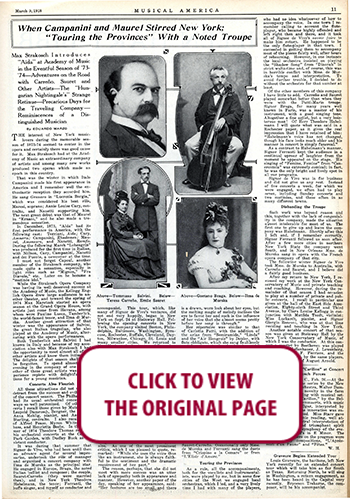 |
Max Strakosch Introduces “Aida” at Academy of Music in the Eventful Season of ‘73-74—Adventures on the Road with Carreño, Sauret and Other Artists—The “Hungarian Nightingale’s” Strange Retinue—Precarious Days for the Traveling Company—Reminiscences of a Distinguished Musician
|
|
2 March 1918
Page 5
Pupils, Prodigies and His American Visit as Viewed by Auer |
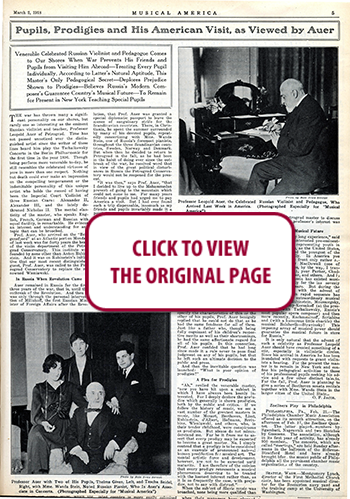 |
Venerable Celebrated Russian Violinist and Pedagogue Comes to Our Shores When War Prevents His Friends and Pupils from Visiting Him Abroad—Treating Every Pupil Individually, According to Latter’s Natural Aptitude, This Master’s Only Pedagogical Secret—Deplores Prejudice Shown to Prodigies—Believes Russia’s Modern Composer’s Guarantee Country’s Musical Future—To Remain for Present in New York Teaching Special Pupils
|
|
23 February 1918
Page 3
AN OPERATIC CHILD WHOSE DREAMS CAME TRUE |
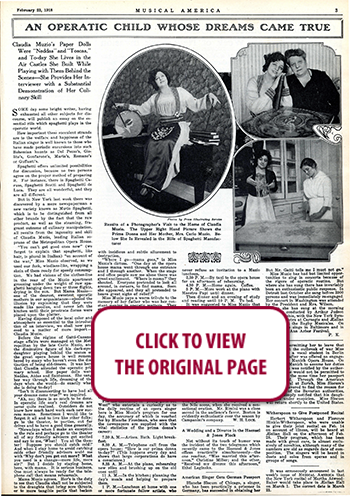 |
Claudia Muzio’s Paper Dolls Were “Neddas” and “Toscas,” and To-day She Lives in the Air Castles She Built While Playing with Them Behind the Scenes—She Provides Her Interviewer with a Substantial Demonstration of Her Culinary Skill
|
|
16 February 1918
Page 29
ECHOES OF MUSIC ABROAD |
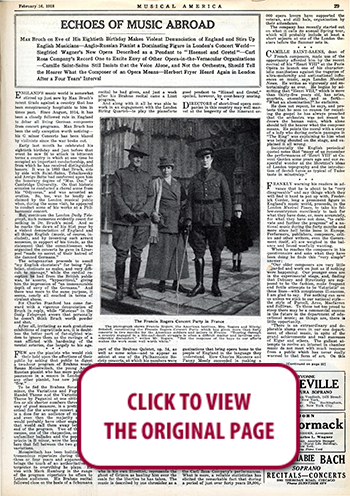 |
Max Bruch on Eve of His Eightieth Birthday Makes Violent Denunciation of England and Stirs Up English Musicians—Anglo-Russian Pianist a Dominating Figure in London's Concert World—Siegfried Wagner's New Opera Described as a Pendant to “Haensel and Gretel”—Carl Rosa Company's Record One to Excite Envy of Other Opera-in-the-Vernacular Organizations—Camille Saint-Saëns Still Insists that the Voice Alone, and Not the Orchestra, Should Tell the Hearer What the Composer of an Opera Means—Herbert Fryer Heard Again in London After a Four Years' Interval
|
|
9 February 1918
Page 44
Boston Première of Mahler ‘Resurrection’ Symphony Heard in ‘Classic Week’ |
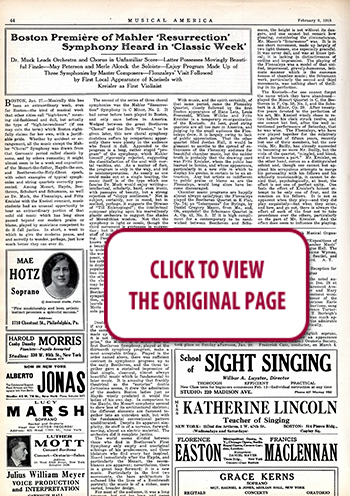 |
Dr. Muck Leads Orchestra and Chorus in Unfamiliar Score—Latter Possesses Movingly Beautiful Finale—May Peterson and Merle Alcock the Soloists—Enjoy Program Made Up of Three Symphonies by Master Composers—Flonzaleys’ Visit Followed by First Local Appearance of Kneisels with Kreisler as First Violinist
|
|
9 February 1918
Page 41
Fourteen Years of Hardships and Then—“A Perfect Day” |
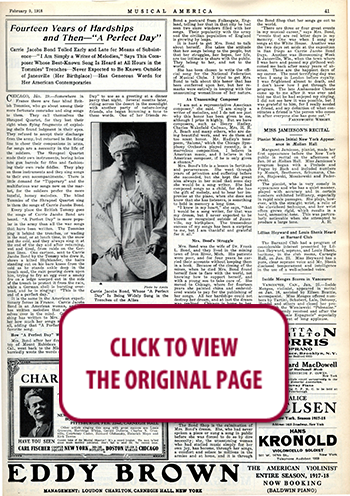 |
Carrie Jacobs Bond Toiled Early and Late for Means of Subsistence-”—I Am Simply a Writer of Melodies,” Says This Composer Whose Best-Known Song Is Heard at All Hours in the Tommies’—Trenches- Never Expected to Be Known Outside of Janesville (Her Birthplace) —Has Generous Words for Her American Contemporaries
|
|
26 January 1918
Page 5
DRAMATIC DETAILS AS ESSENTIAL AS SINGING IN OPERA, SAYS MURATORE |
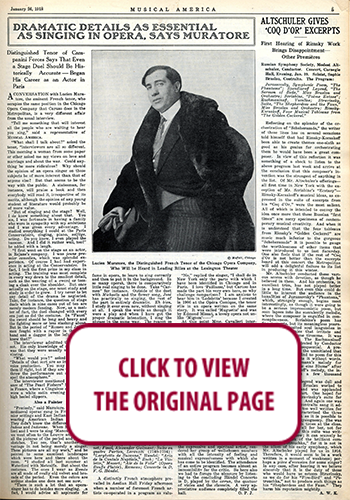 |
Distinguished Tenor of Campanini Forces Says That Even a Stage Duel Should Be Historically Accurate—Began His Career as an Actor in Paris
|
|
12 January 1918
Page 19
“My Homecoming Is Like a Dream!” Cries Max Rosen, the “Newest” Violinist |
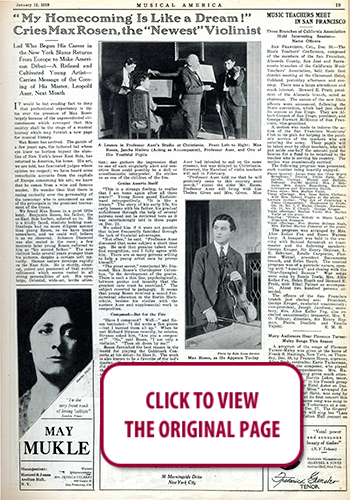 |
Lad Who Began His Career in the New York Slums Returns From Europe to Make American Début—A. Refined and Cultivated Young Artist—Carries Message of the Coming of His Master, Leopold Auer, Next Month
|
|
12 January 1918
Page 13
Musical New York at the Time of Sarasate’s Début |
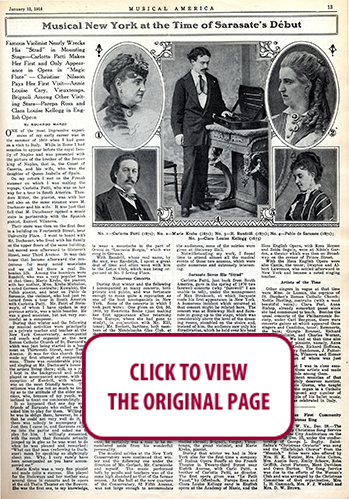 |
Famous Violinist Nearly Wrecks His “Strad” in Mounting Stage—Carlotta Patti Makes Her First and Only Appearance in Opera in “Magic Flute”—Christine Nilsson Pays Her First Visit—Annie Louise Cary, Vieuxtemps, Brignoli Among Other Visiting Stars—Parepa Rosa and Clara Louise Kellogg in English Opera
|
|
5 January 1918
Page 47
Movie-Theaters Find Good Music an Important Asset |
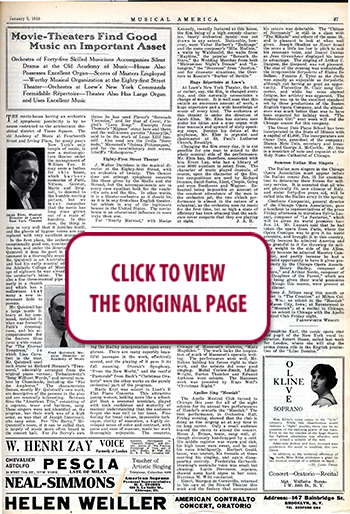 |
Orchestra of Forty-five Skilled Musicians Accompanies Silent Drama at the Old Academy of Music—House Also Possesses Excellent Organ—Scores of Masters Employed—Worthy Musical Organization at the Eighty-first Street Theater—Orchestra at Loew’s New York Commands Formidable Répertoire—Theater Also Has Large Organ and Uses Excellent Music
|
|
5 January 1918
Page 28
Boston Organization Was Pioneer ln the Field of Chamber Music |
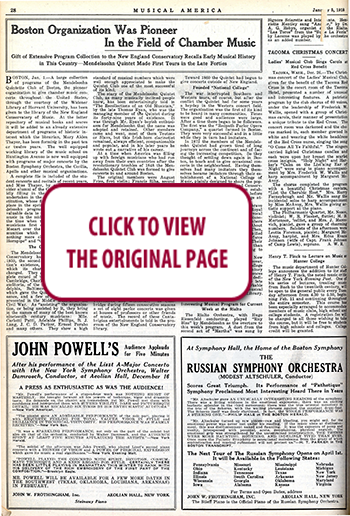 |
Gift of Extensive Program Collection to the New England Conservatory Recalls Early Musical History in This Country—Mendelssohn Quintet Made First Tours in the Late Forties
|
|
29 December 1917
Page 33
MOVIES DISCARD RAGTIME FOR SYMPHONIC MUSIC
|
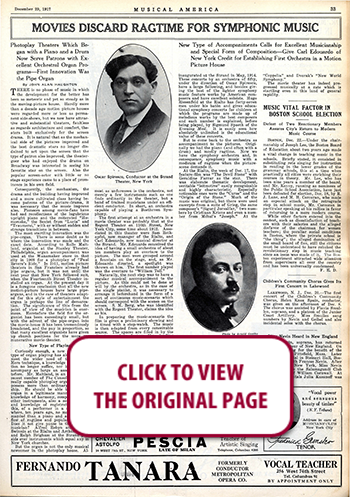 |
Photoplay Theaters Which Began with a Piano and a Drum Now Serve Patrons with Excellent Orchestral Organ Programs—First Innovation Was the Pipe Organ—New Type of Accompaniments Calls for Excellent Musicianship and Special Form of Composition—Give Carl Edouardo of New York Credit for Establishing First Orchestra in a Motion Picture House
|
|
22 December 1917
Page 56
PREMIÈRES OF JEANNE D’ARC AND “BÉATRICE’’ CHIEF EVENTS OF OPERATIC SEASON IN PARIS
|
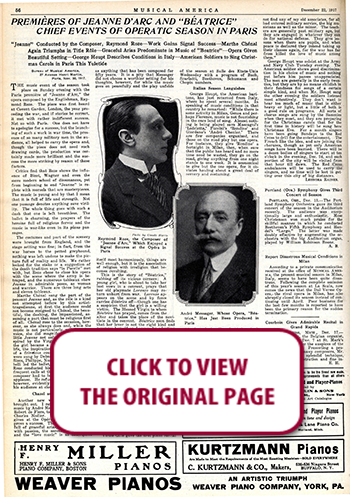 |
“Jeanne” Conducted by the Composer, Raymond Roze—Work Gains Signal Success—Marthe Chenal Again Triumphs in Title Rôle—Graceful Arias Predominate in Music of “Beatrice”—Opera Given Beautiful Setting—George Houpt Describes Conditions in Italy—American Soldiers to Sing Christmas Carols in Paris This Yuletide
|
|
22 December 1917
Page 48
DESCRIBES CONCERTS AT THE FRENCH FRONT
|
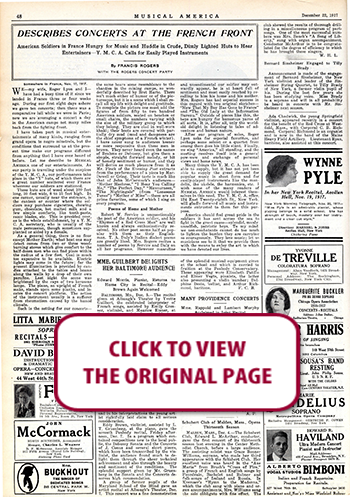 |
American Soldiers in France Hungry for Music and Huddle in Crude, Dimly Lighted Huts to Hear Entertainers—Y. M. C. A. Calls for Easily Played Instruments
|
|
15 December 1917
Page 9
Memories of Concerts Given and Tours Planned in New York Half a Century Ago
|
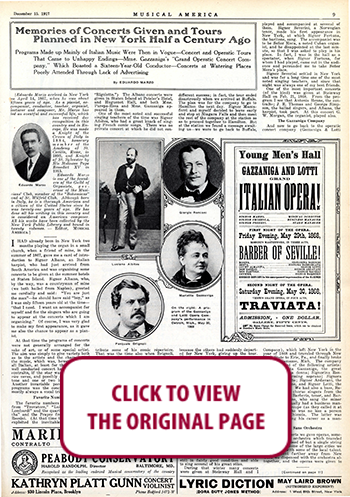 |
Programs Made up Mainly of Italian Music Were Then in Vogue—Concert and Operatic T ours That Came to Unhappy Endings—Mme. Gazzaniga’s “Grand Operatic Concert Company,” Which Boasted a Sixteen-Year-Old Conductor—Concerts at Watering Places Poorly Attended Through Lack of Advertising
|
|
8 December 1917
Page 1
MAY DISBAND THE BOSTON SYMPHONY FOR PERIOD OF WAR
|
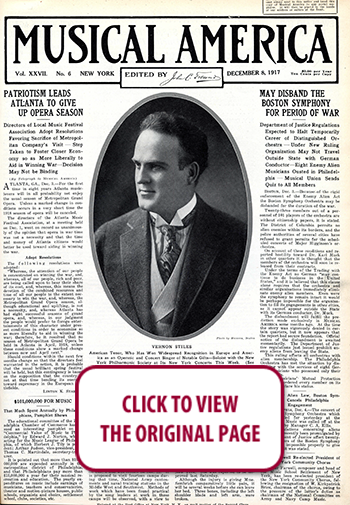 |
Department of Justice Regulations Expected to Halt Temporarily Career of Distinguished Orchestra—Under New Ruling Organization May Not Travel Outside State with German Conductor—Eight Enemy Alien Musicians Ousted in Philadelphia —Musical Union Sends Quiz to All Members
|
|
1 December 1917
Page 3
AT LUNCHEON WITH PIERRE MONTEUX
|
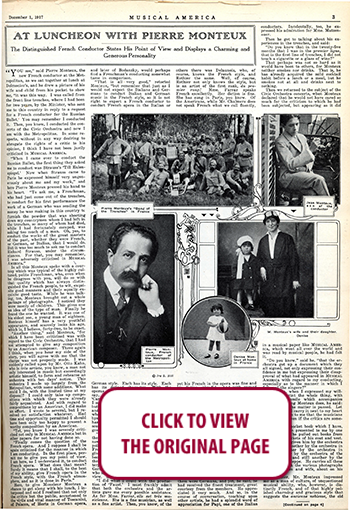 |
The Distinguished French Conductor States His Point of View and Displays a Charming and Generous Personality
|
|
1 December 1917
Page 1
KREISLER, GOADED BY ATTACKS, GIVES UP ALL CONCERTS
|
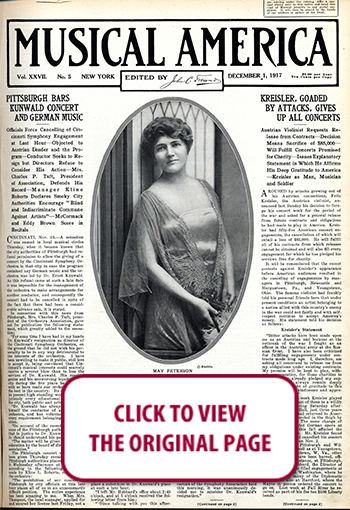 |
Austrian Violinist Requests Release from Contracts—Decision Means Sacrifice of $85,000—Will Fulfill Concerts Promised for Charity—Issues Explanatory Statement in Which He Affirms His Deep Gratitude to America—Kreisler as Man, Musician and Soldier
|
|
10 November 1917
Page 3
Picturing the Home Life of Jascha Heifetz
|
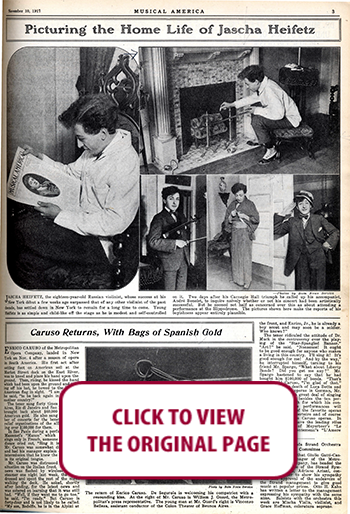 |
JASCHA HEIFETZ, the eighteen-year-old Russian violinist, whose success at his New York debut a few weeks ago surpassed that of any other violinist of the past decade, has settled down in New York to remain for a long time to come....
Caruso Returns, With Bags of Spanish Gold
ENRICO CARUSO of the Metropolitan Opera Company, landed in New York on Nov. 4 after a season of opera in South America. His first act after setting foot on American soil at the Market Street dock on the East River, was to kneel and place his hand upon the ground....
|
|
3 November 1917
Page 21
When Mark Twain “Brought Down the House” at His Daughter’s Recital |
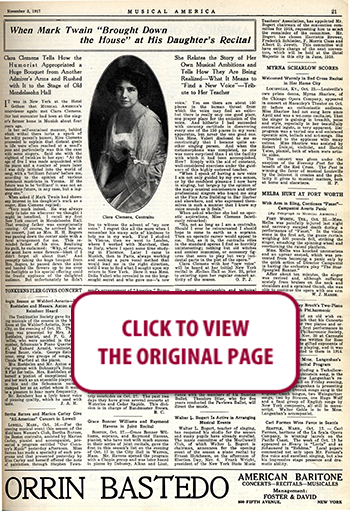 |
Clara Clemens Tells How the Humorist Appropriated a Huge Bouquet from Another Admirer’s Arms and Rushed with It to the Stage of Old Mendelssohn Hall She Related the Story of Her Own Musical Ambitions and Tells How They Are Being Realized—What It Means to “Find a New Voice”—Tribute to Her Teacher
|
|
20 October 1917
Page 15
How the New War Revenue Act Affects Admissions to Concerts and Operas |
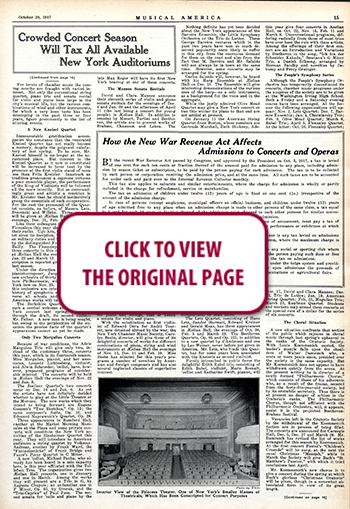 |
BY the recent War Revenue Act passed by Congress, and approved by the President on Oct. 3, 1917, a tax is levied of one cent for each ten cents or fraction thereof of the amount paid for admission to any place, including admission by season ticket or subscription, to be paid by the person paying for such admission. The tax is to be collected by each person or corporation receiving the admission price, and at the same time. All such taxes are to be accounted for under oath and paid over to the Internal Revenue Collector monthly....
|
|
15 September 1917
Page 31
HEIFETZ HERE AFTER A PERILOUS JOURNEY |
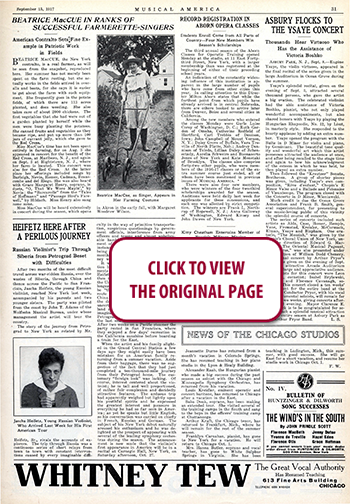 |
Russian Violinist’s Trip Through Siberia from Petrograd Beset with Difficulties
|
|
18 August 1917
Page 12
How the Musical Public Can Help In the Matter of Food Conservation |
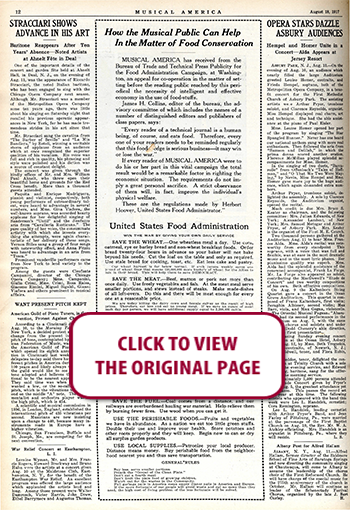 |
MUSICAL AMERICA has received from the Bureau of Trade and Technical Press Publicity for the Food Administration Campaign, at Washington, an appeal for co-operation in the matter of setting before the reading public reached by this periodical the necessity of intelligent and effective economy in the use of food-stuffs.
|
|
11 August 1917
Page 11
A Modern Woman From “Old Japan’’ Is Tamaki Miura |
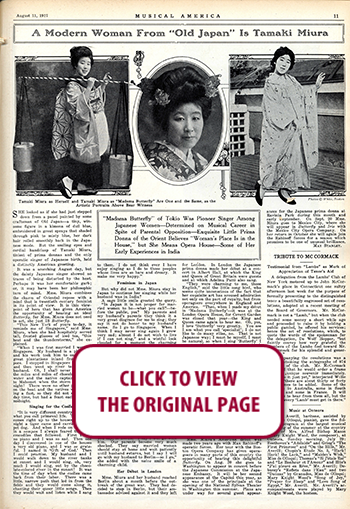 |
“Madama Butterfly” of Tokio Was Pioneer Singer Among Japanese Women—Determined on Musical Career in Spite of Parental Opposition—Exquisite Little Prima Donna of the Orient Believes “Woman’s Place Is in the House,” but She Means Opera House—Some of Her Early Experiences in India
|
|
11 August 1917
Page 1
MUSICAL OUTLOOK DEPENDS LARGELY ON MILITARY DRAFT |
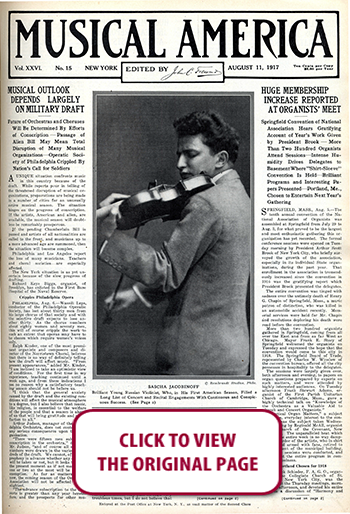 |
Future of Orchestras and Choruses Will Be Determined By Efforts of Conscription—Passage of Alien Bill May Mean Total Disruption of Many Musical Organizations—Operatic Society of Philadelphia Crippled By Nation’s Call for Soldiers
|
|
4 August 1917
Page 1
DRAFT CALLS MANY MUSICIANS TO ARMS OVER THE COUNTRY |
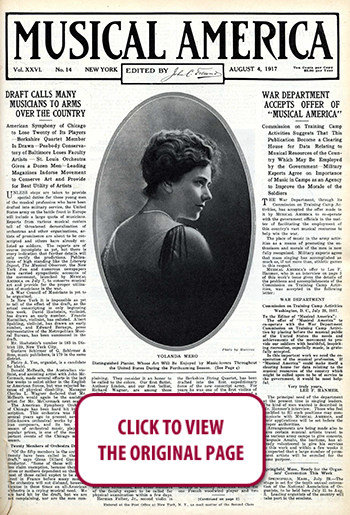 |
American Symphony of Chicago to Lose Twenty of Its Players—Berkshire Quartet Member Is Drawn—Peabody Conservatory of Baltimore Loses Faculty Artists—St. Louis Orchestra Gives a Dozen Men—Leading Magazines Indorse Movement to Conserve Art and Provide for Best Utility of Artists
|
|
21 July 1917
Page 21
America Wins a New Composer from Foreign Prison Camp |
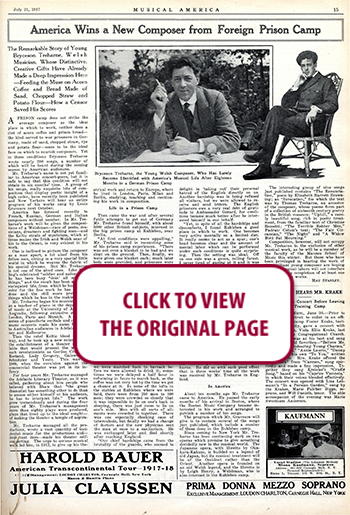 |
The Remarkable Story of Young Bryceson Treharne, Welsh Musician, Whose Distinctive, Creative Gifts Have Already Made a Deep Impression Here—Feeding the Muse on Acorn Coffee and Bread Made of Sand, Chopped Straw and Potato Flour—How a Censor Saved His Scores
|
|
14 July 1917
Page 14
MEMORIES OF STUDY UNDER CARREÑO |
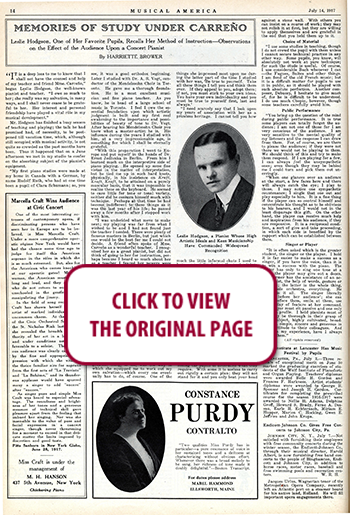 |
Leslie Hodgson, One of Her Favorite Pupils, Recalls Her Method of Instruction—Observations on the Effect of the Audience Upon a Concert Pianist
|
|
14 July 1917
Page 3
CHARLIE CHAPLIN PLEADS FOR MORE FUN IN MUSIC |
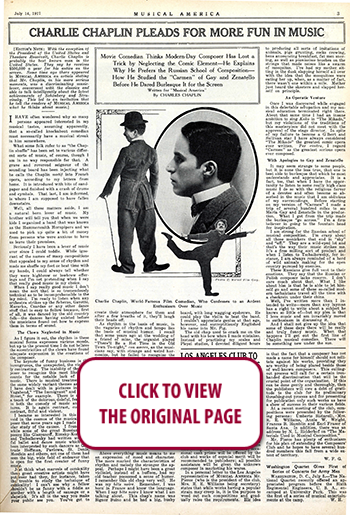 |
Movie Comedian Thinks Modern-Day Composer Has Lost a Trick by Neglecting the Comic Element—He Explains Why He Prefers the Russian School of Composition—How He Studied the “Carmen” of Gay and Zenatello Before He Dared Burlesque It for the Screen
|
|
7 July 1917
Page 23
WHAT THE REVOLUTION WILL MEAN TO CREATIVE MUSICAL ART IN RUSSIA |
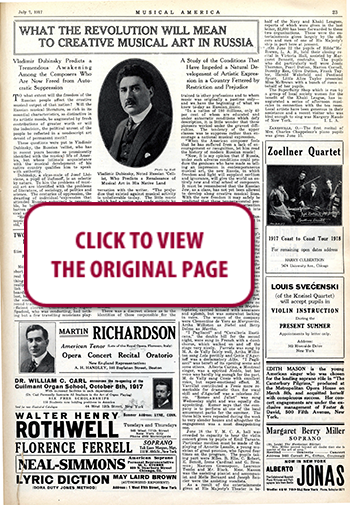 |
Vladimir Dubinsky Predicts a Tremendous Awakening Among the Composers Who Are Now Freed from Autocratic Suppression—A Study of the Conditions That Have Impeded a Natural Development of Artistic Expression in a Country Fettered by Restriction and Prejudice
|
|
7 July 1917
Page 3
HOW MAY THE MUSICIAN BE UTILIZED IN WAR? |
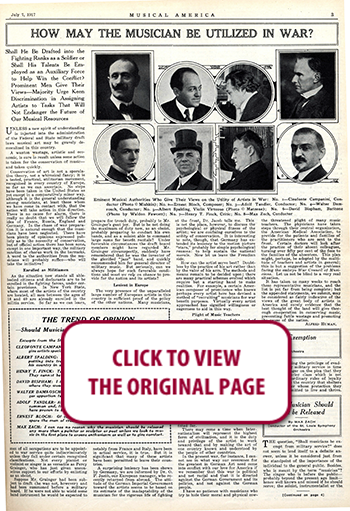 |
Shall He Be Drafted into the Fighting Ranks as a Soldier or Shall His Talents Be Employed as an Auxiliary Force to Help Win the Conflict? Prominent Men Give Their Views—Majority Urge Keen Discrimination in Assigning Artists to Tasks That Will Not Endanger the Future of Our Musical Resources
|
|
30 June 1917
Page 2
AMERICAN CONDUCTOR TELLS OF FOOD SCARCITY IN GERMANY
|
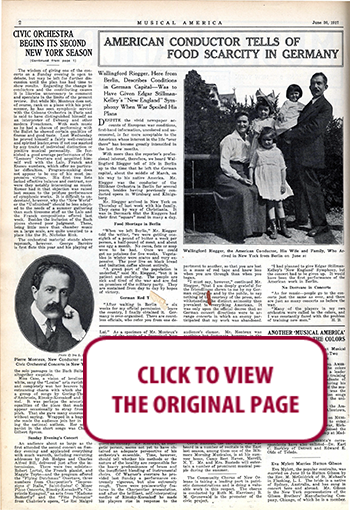 |
Wallingford Riegger, Here from Berlin, Describes Conditions in German Capital—Was to Have Given Edgar Stillman-Kelley’s “New England” Symphony When War Spoiled His Plans
|
|
23 June 1917
Page 13
TERESA CARREÑO’S DEATH ENDS NOTABLE CAREER
|
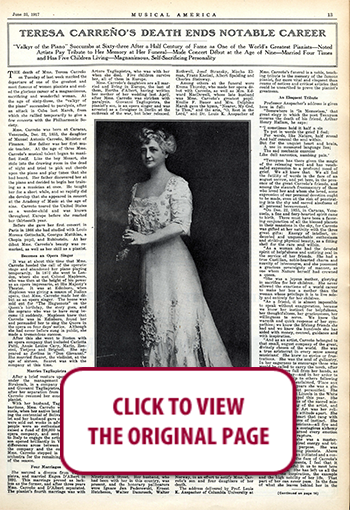 |
“Valkyr of the Piano” Succumbs at Sixty-three After a Half Century of Fame as One of the World’s Greatest Pianists—Noted Artists Pay Tribute to Her Memory at Her Funeral—Made Concert Debut at the Age of Nine—Married Four Times and Has Five Children Living—Magnanimous, Self-Sacrificing Personality
|
|
23 June 1917
Page 10
HOW WILL THE WAR AFFECT BUSINESS
|
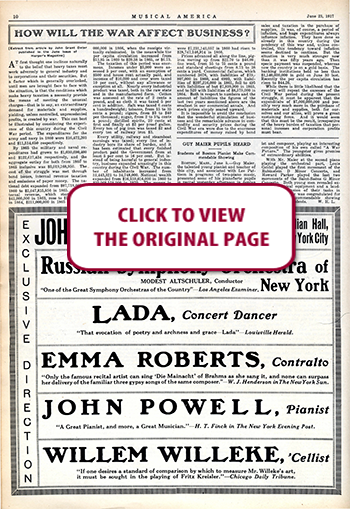 |
... But a factor which is generally overlooked, until men are brought face to face with the situation, is that the conditions which make heavy taxation a necessity provide the means of meeting the unusual charges—that is to say, an extraordinary demand for materials and supplies, yielding, unless controlled, unprecedented profits, is created by war. This can best be illustrated by considering the experience of this country during the Civil War period. The expenditures for the army and navy in 1860 were $16,472,203 and $11,514,650 respectively....
|
|
16 June 1917
Page 48
RESENTS CHAUVINISM IN MAKING OF SONG PROGRAMS
|
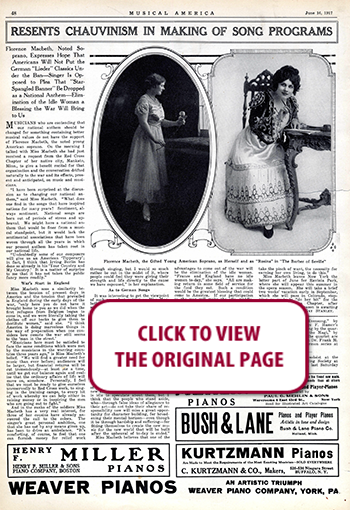 |
Florence Macbeth, Noted Soprano, Expresses Hope That Americans Will Not Put the German “Lieder” Classics Under the Ban—Singer Is Opposed to Plea That “Star-Spangled Banner” Be Dropped as a National Anthem—Elimination of the Idle Woman a Blessing the War Will Bring to Us
|
|
16 June 1917
Page 42
Why So Many Women Fall In Love with Musicians
|
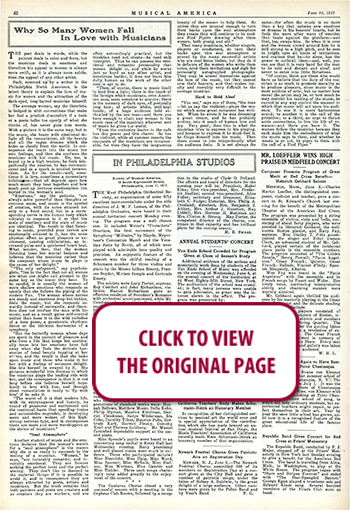 |
THE poet deals in words, while the painter deals in color and form, but the musician deals in emotions and therefore his appeal to women is always more swift, as it is always more subtle, than the appeal of any other artist.
|
|
16 June 1917
Page 26
Consider the Swan's Neck If You Would Sing Well
|
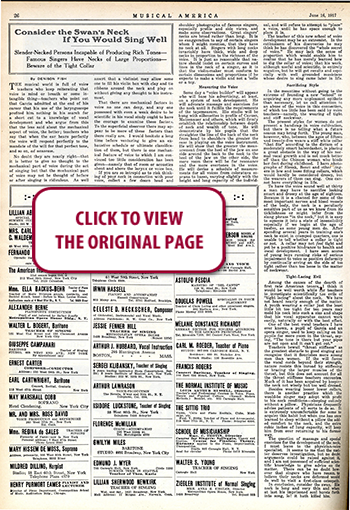 |
Slender-Necked Persons Incapable of Producing Rich Tones—Famous Singers Have Necks of Large Proportions—Beware of the Tight Collar
|
|
16 June 1917
Page 22
NOT CARUSO BUT McCORMACK MUSIC’S GREATEST MONEY-MAKER
|
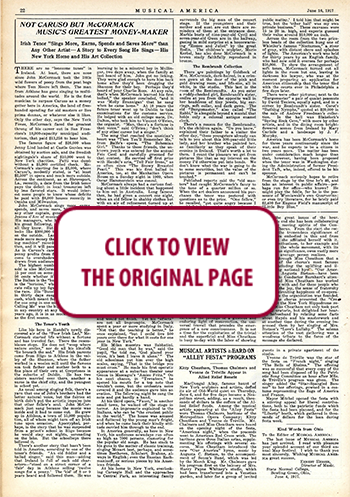 |
Irish Tenor “Sings More, Earns, Spends and Saves More” than Any Other Artist—A Story to Every Song He Sings—His New York Home and His Art Collection
|
|
16 June 1917
Page 5
“Off-Stage” With Caruso on a Week’s Tour
|
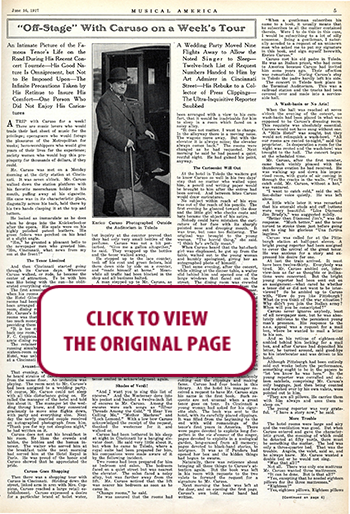 |
An Intimate Picture of the Famous Tenor’s Life on the Road During His Recent Concert Tournée—His Good Nature Is Omnipresent, but Not to Be Imposed Upon—The Infinite Precautions Taken by His Retinue to Insure His Comfort—One Person Who Did Not Enjoy His Caricatures—A Wedding Party Moved Nine Flights Away to Allow the Noted Singer to Sleep—Twelve-lnch List of Request Numbers Handed to Him by Art Admirer in Cincinnati Street—His Rebuke to a Collector of Press Clippings—The Ultra-Inquisitive Reporter Snubbed
|
|
16 June 1917
Page 3
BUY LIBERTY BONDS IS PLEA OF OPERA STARS
|
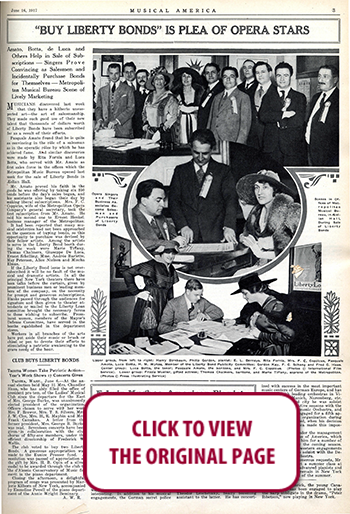 |
Amato, Botta, de Luca and Others Help in Sale of Subscriptions—Singers Prove Convincing as Salesmen and Incidentally Purchase Bonds for Themselves—Metropolitan Musical Bureau Scene of Lively Marketing
|
|
9 June 1917
Page 9
Contest Instituted by “Globe” for a New National Anthem
|
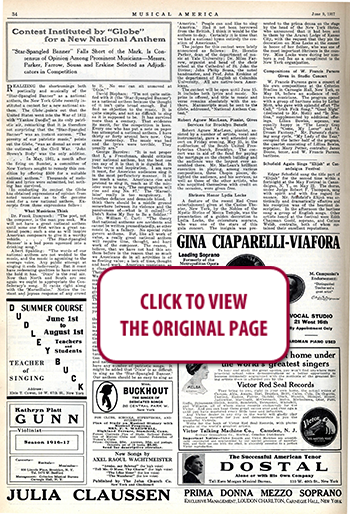 |
“Star-Spangled Banner” Falls Short of the Mark, Is Consensus of Opinion Among Prominent Musicians—Messrs. Parker, Farrow, Sousa and Erskine Selected as Adjudicators in Competition
|
|
9 June 1917
Page 9
Lada’s Destiny Strangely Linked with the Russians
|
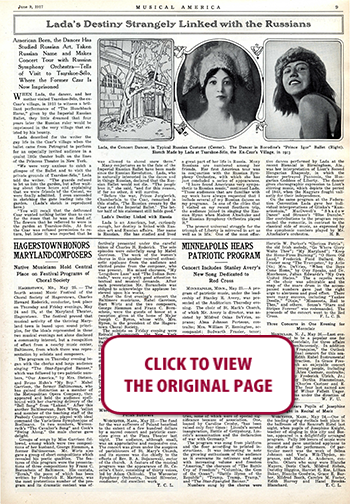 |
American Born, the Dancer Has Studied Russian Art, Taken Russian Name and Makes Concert Tour with Russian Symphony Orchestra—Tells of Visit to Tsarskoe-Sélo, Where the Former Czar Is Now Imprisoned
|
|
21 April 1917
Page 3
BELIEVES WOMEN COMPOSERS WILL RISE TO GREATER HEIGHTS IN WORLD DEMOCRACY
|
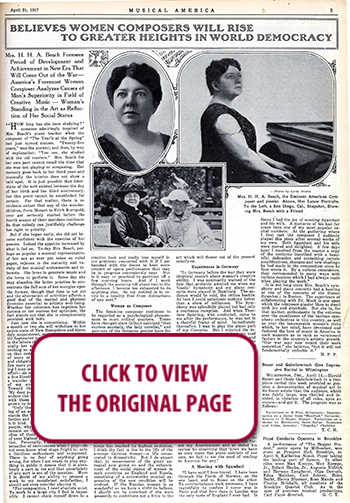 |
Mrs. H. H. A. Beach Foresees Period of Development and Achievement in New Era That Will Come Out of the War—America’s Foremost Woman Composer Analyzes Causes of Man’s Superiority in Field of Creative Music—Woman’s Standing in the Art as Reflection of Her Social Status
|
|
7 April 1917
Page 1
DEMONSTRATION AT OPERA WHEN WAR MESSAGE ARRIVES |
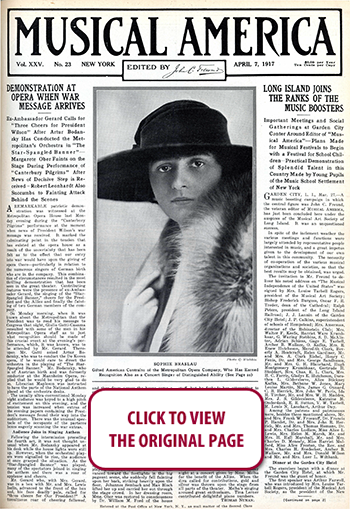 |
Ex-Ambassador Gerard Calls for “Three Cheers for President Wilson” After Artur Bodanzky Has Conducted the Metropolitan’s Orchestra in “The Star-Spangled Banner” Margarete Ober Faints on the Stage During Performance of “Canterbury Pilgrims” After News of Decisive Step is Received—Robert Leonhardt Also Succumbs to Fainting Attack Behind the Scenes
|
|
24 March 1917
Page 21
FRANK LA FORGE GIVES LESCHETIZKY REMINISCENCES |
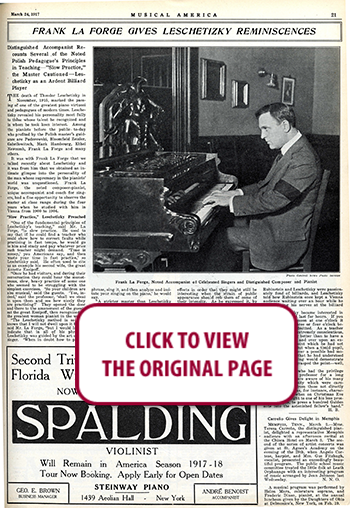 |
Distinguished Accompanist Recounts Several of the Noted Polish Pedagogue’s Principles in Teaching—”Slow Practice,” the Master Cautioned—Leschetizky as an Ardent Billiard Player
|
|
17 March 1917
Page 20
“Star-Spangled Banner” Strains in “Butterfly” Set Enthusiasm of a Paris Audience Ablaze |
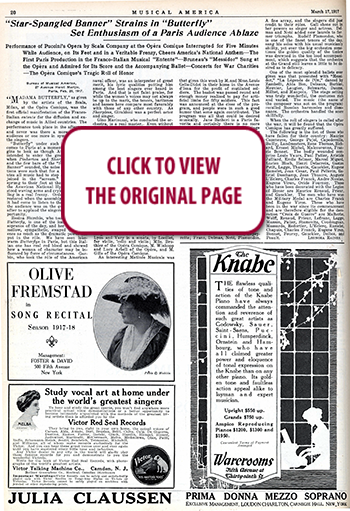 |
Performance of Puccini’s Opera by Scala Company at the Opéra Comique Interrupted for Five Minutes While Audience, on Its Feet and in a Veritable Frenzy, Cheers America’s National Anthem—The First Paris Production in the Franco-Italian Musical “Entente”—Bruneau’s “Messidor” Sung at the Opéra and Admired for Its Score and the Accompanying Ballet—Concerts for War Charities—The Opéra Comique’s Tragic Roll of Honor
|
|
10 March 1917
Page 5
Galli-Curci—A New Star in America’s Musical Firmament |
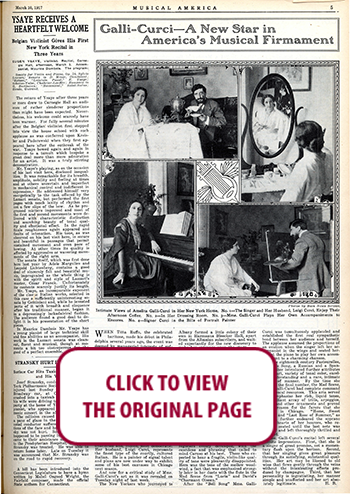 |
... She entered, bowed gracefully and waited for the applause to subside. Exquisitely gowned, stately and refined in carriage, she struck a sympathetic chord in the hearts of the audience before she sang her first note. The opening measures of “Caro mio ben” revealed a warm, liquid tone of remarkable purity that grew in smoothness and steadiness as the singer gained her composure....
|
|
10 February 1917
Page 3
HOW SCOTTI PERFECTS A MASTER RÔLE |
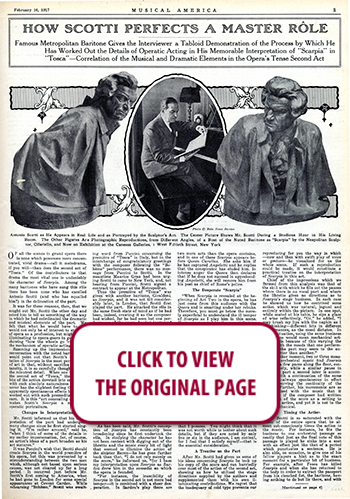 |
Famous Metropolitan Baritone Gives the Interviewer a Tabloid Demonstration of the Process by Which He Has Worked Out the Details of Operatic Acting in His Memorable Interpretation of “Scarpia” in “Tosca”—Correlation of the Musical and Dramatic Elements in the Opera’s Tense Second Act
|
|
3 February 1917
Page 13
Dr. William C. Carl a Staunch Supporter of Publicity for the Musical Artist |
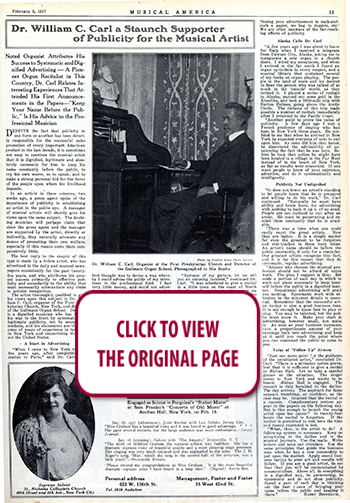 |
Noted Organist Attributes His Success to Systematic and Dignified Advertising—A Pioneer Organ Recitalist in This Country, Dr. Carl Relates Interesting Experiences That Attended His First Announcements in the Papers—”Keep Your Name Before the Public,” Is His Advice to the Professional Musician
|
|
27 January 1917
Page 32
Introducing Mr. Stokowski as Conductor and Diplomat |
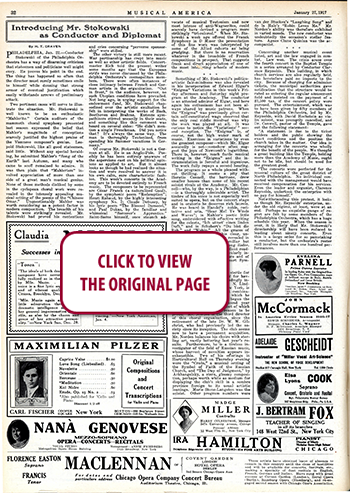 |
Conductor Stokowski of the Philadelphia Orchestra has a way of disarming criticism that statesmen and politicians well might envy. He proves his point in the end. The thing has happened so often that the director must surely sometimes smile to himself while donning that strong armor of eventual justification which easily withstands arrows of preliminary attack....
|
|
20 January 1917
Page 3
America Gradually Coming Into a True Appreciation of Its Greatest Composer |
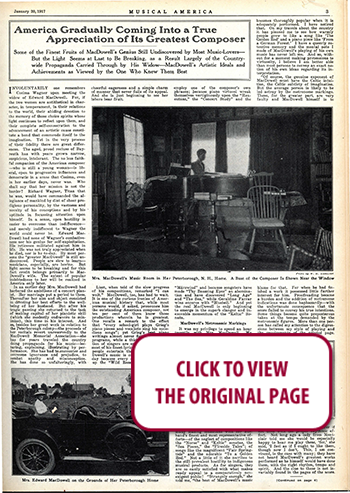 |
Some of the Finest Fruits of MacDowell’s Genius Still Undiscovered by Most Music-Lovers—But the Light Seems at Last to Be Breaking, as a Result Largely of the Country-wide Propaganda Carried Through by His Widow—MacDowell’s Artistic Ideals and Achievements as Viewed by the One Who Knew Them Best
|
|
13 January 1917
Page 48
HOW THE PRESS AGENT CREATES MUSIC LOVERS |
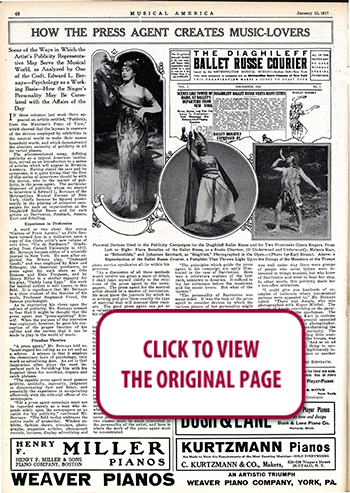 |
Some of the Ways in Which the Artist’s Publicity Representative May Serve the Musical World, as Analyzed by One of the Craft, Edward L. Hernays—Psychology as a Working Basis—How the Singer’s Personality May Be Correlated with the Affairs of the Day
|
|
13 January 1917
Page 3
OUR OLDEST ORCHESTRA REACHES 75TH BIRTHDAY |
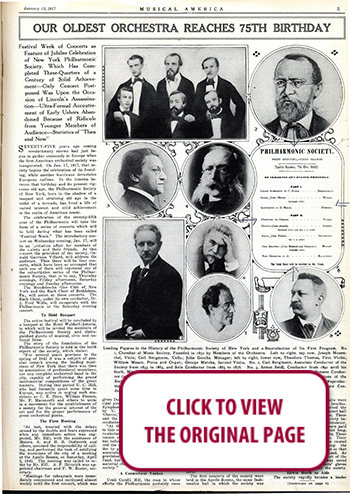 |
Festival Week of Concerts as Feature of Jubilee Celebration of New York Philharmonic Society, Which Has Completed Three-Quarters of a Century of Solid Achievement—Only Concert Postponed Was Upon the Occasion of Lincoln’s Assassination—Ultra-Formal Accoutrement of Early Ushers Abandoned Because of Ridicule from Younger Members of Audience—Statistics of “Then and Now”
|
|
6 January 1917
Page 29
EDUCATORS DISCUSS TIMELY PLANS FOR BETTERING SYSTEMS OF STUDY |
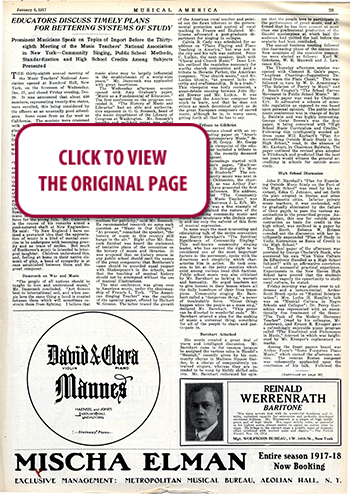 |
Prominent Musicians Speak on Topics of Import Before the Thirty-eighth Meeting of the Music Teachers’ National Association in New York—Community Singing, Public School Methods, Standardization and High School Credits Among Subjects Presented
|
|
6 January 1917
Page 9
How Gatti-Casazza Helped An Old Donizetti Opera Find Its Second Youth |
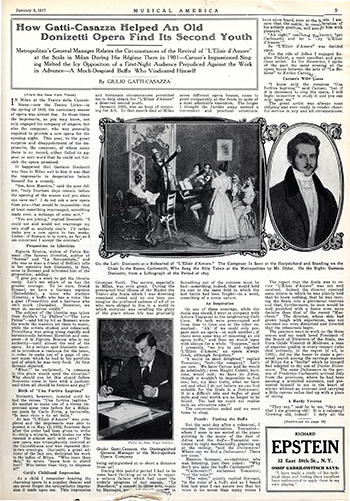 |
Metropolitan’s General Manager Relates the Circumstances of the Revival of “L’Elisir d’Amore” at the Scala in Milan During His Régime There in 1901—Caruso’s Impassioned Singing Melted the Icy Opposition of a First-Night Audience Prejudiced Against the Work in Advance—A Much-Despised Buffo Who Vindicated Himself
|
|
30 December 1916
Page 5
A Half Century of Piano Playing As Viewed Through Teresa Carreño’s Eyes |
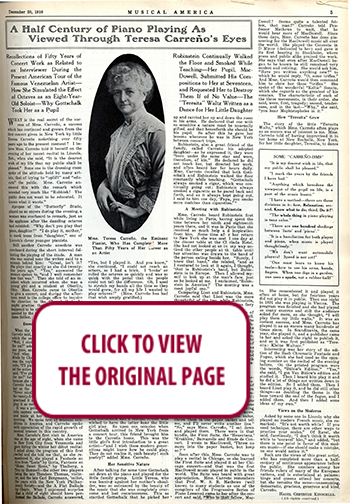 |
Recollections of Fifty Years of Concert Work as Related to an Interviewer During the Present American Tour of the Famous Venezuelan Artist—How She Simulated the Effect of Octaves as an Eight-Year-Old Soloist—Why Gottschalk Took Her as a Pupil—Rubinstein Continually Walked the Floor and Smoked While Teaching—Her Pupil, MacDowell, Submitted His Compositions to Her at Seventeen, and Requested Her to Destroy Them If of No Value—The “Teresita” Waltz Written as a Dance for Her Little Daughter
|
|
16 December 1916
Page 9
NEW SCHOOL LEAVING DEBUSSY AND RAVEL BEHIND |
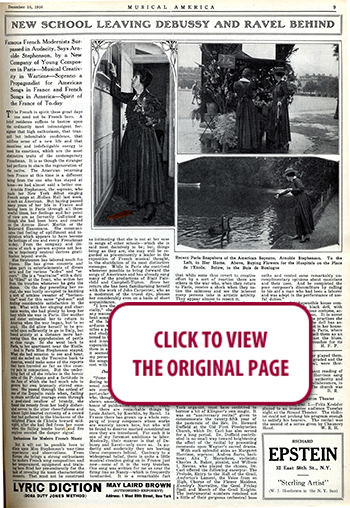 |
Famous French Modernists Surpassed in Audacity, Says Arnolde Stephenson, by a New Company of Young Composers in Paris—Musical Creativity in Wartime—Soprano a Propagandist for American Songs in France and French Songs in America—Spirit of the France of To-day
|
|
2 December 1916
Page 19
PERSECUTION IN RUSSIA DROVE ROSA RAISA TO VOCAL CAREER |
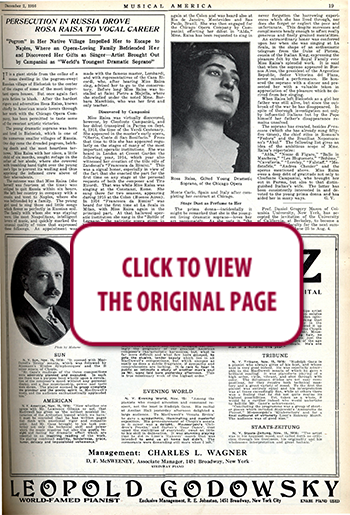 |
“Pogrom” in Her Native Village Impelled Her to Escape to Naples, Where an Opera-Loving Family Befriended Her and Discovered Her Gifts as Singer—Artist Brought Out by Campanini as “World’s Youngest Dramatic Soprano”
|
|
25 November 1916
Page 9
Ernest Bloch Describes His Quartet Which Flonzaleys Are to Introduce |
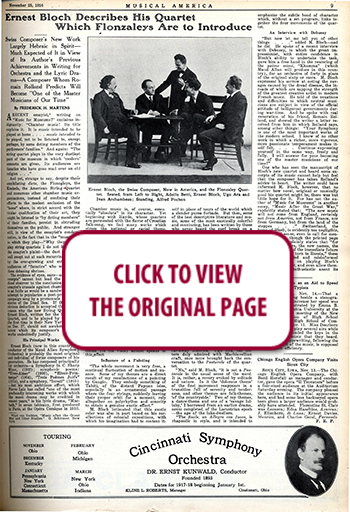 |
Swiss Composer’s New Work Largely Hebraic in Spirit—Much Expected of It in View of Its Author’s Previous Achievements in Writing for Orchestra and the Lyric Drama—A Composer Whom Romain Rolland Predicts Will Become “One of the Master Musicians of Our Time”
|
|
11 November 1916
Page 48
DEVICE FIXES PITCH, ASSURING ORCHESTRA’S “PLAYING IN TUNE” |
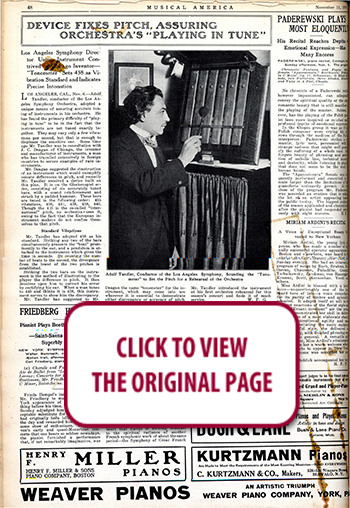 |
Los Angeles Symphony Director Using Instrument Contrived by Chicago Inventor—”Tonometer Sets 438 as Vibration Standard and Indicates Precise Intonation
|
|
11 November 1916
Page 28
STRAUSS ASKS TOLERANCE OF “ENEMY” MUSIC |
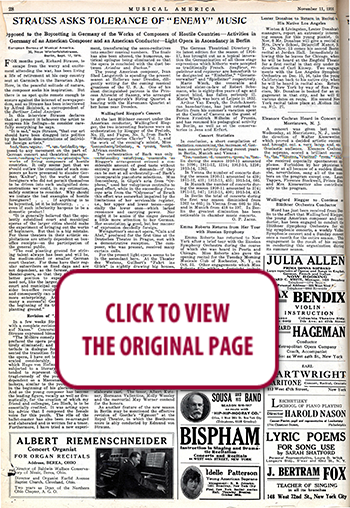 |
Opposed to the Boycotting in Germany of the Works of composers of Hostile Countries—Activities in Germany of an American Composer and an American Conductor—Light Opera in Ascendancy in Berlin
|
|
4 November 1916
Page 28
PASSENGERS ON SHIPS AT SEA TO HEAR MUSIC BY WIRELESS |
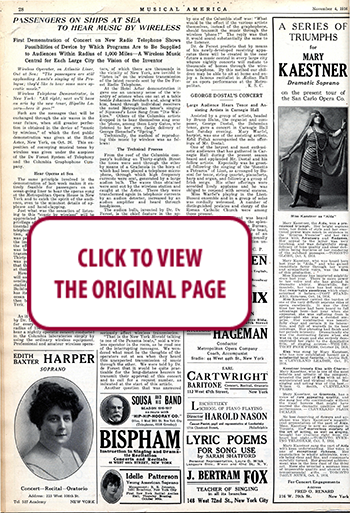 |
First Demonstration of Concert on New Radio Telephone Shows Possibilities of Device by Which Programs Are to Be Supplied to Audiences Within Radius of 1,000 Miles—A Wireless Music Central for Each Large City the Vision of the Inventor
|
|
4 November 1916
Page 19
TO TEACH ABSOLUTE PITCH BY COLOR SENSE |
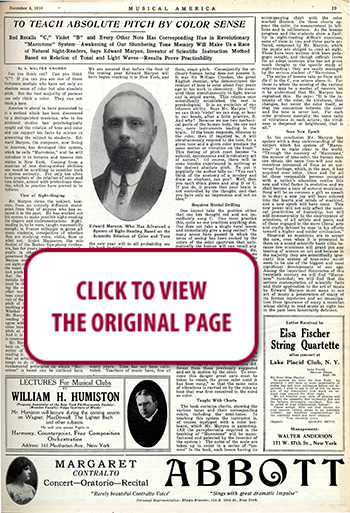 |
Red Recalls “C,” Violet “B” and Every Other Note Has Corresponding Hue in Revolutionary “Marcotone” System—Awakening of Our Slumbering—Tone Memory Will Make Us a Race of Natural Sight-Readers, Says Edward Maryon, Inventor of Scientific Instruction Method Based on Relation of Tonal and Light Waves—Results Prove Practicability
|
|
28 October 1916
Page 36
SUPERANNUATED MUSICIANS |
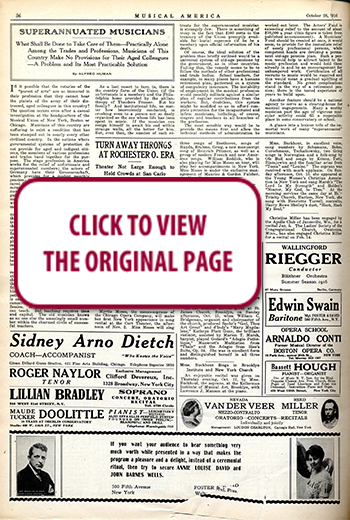 |
What Shall Be Done to Take Care of Them—Practically Alone Among the Trades and Professions, Musicians of This Country Make No Provisions for Their Aged Colleagues—A Problem and Its Most Practicable Solution
|
|
28 October 1916
Page 10
Tchaikowsky’s Personality as Von Sternberg Encountered It |
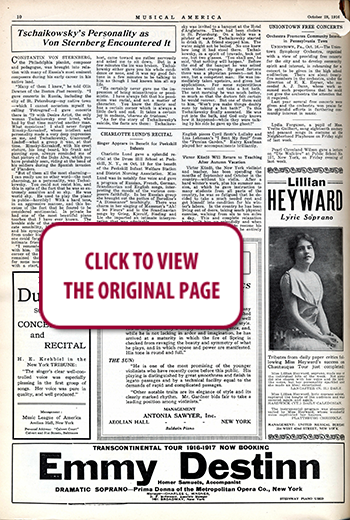 |
CONSTANTIN VON STERNBERG, the Philadelphia pianist, composer and pedagogue, was brought into relation with many of Russia’s most eminent composers during his early career in his native land.
|
|
28 October 1916
Page 2
HORRORS OF WAR SEAR JACQUES THIBAUD’S SOUL |
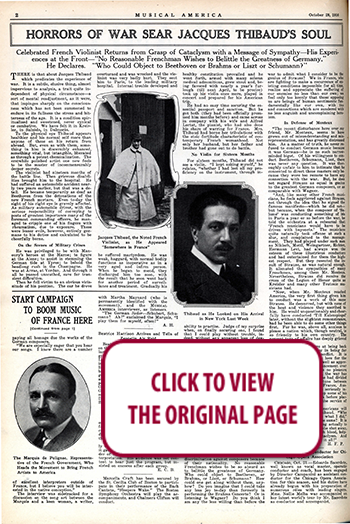 |
Celebrated French Violinist Returns from Grasp of Cataclysm with a Message of Sympathy—His Experiences at the Front—”No Reasonable Frenchman Wishes to Belittle the Greatness of Germany,” He Declares. “Who Could Object to Beethoven or Brahms or Liszt or Schumann?”
|
|
21 October 1916
Page 5
“SADKO” PREMIERE IN RUSSIAN BALLET’S OPENING WEEK |
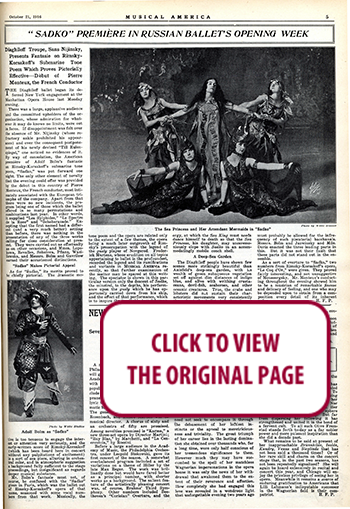 |
Diaghileff Troupe, Sans Nijinsky, Presents Fantasie on Rimsky-Korsakoff’s Submarine Tone Poem Which Proves Pictorially Effective—Debut of Pierre Monteux, the French Conductor
|
|
14 October 1916
Page 43
THE ORGANIST AND THE MOVIES” |
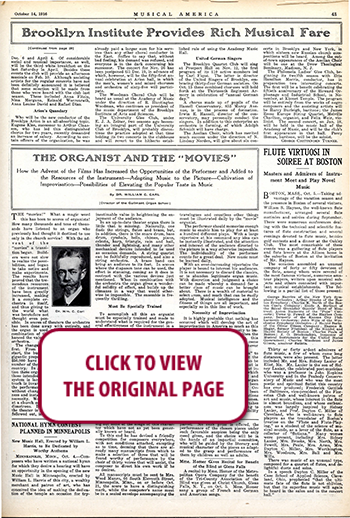 |
How the Advent of the Films Has Increased the Opportunities of the Performer and Added to the Resources of the Instrument—Adapting Music to the Picture—Cultivation of Improvisation—Possibilities of Elevating the Popular Taste in Music
|
|
14 October 1916
Page 10
GROWING DEMAND FOR OPERA SIGNIFICANT FEATURE OF SEASON’S MUSICAL FORECAST |
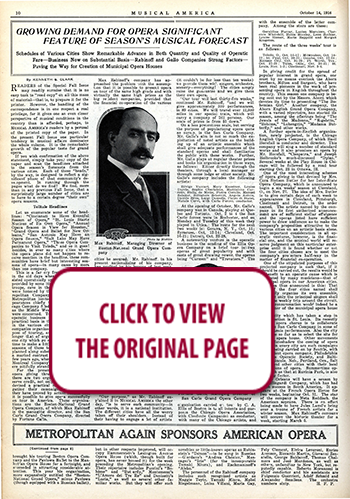 |
Schedules of Various Cities Show Remarkable Advance in Both Quantity and Quality of Operatic Fare—Business Now on Substantial Basis—Rabinoff and Gallo Companies Strong Factors—Paving the Way for Creation of Municipal Opera Houses
|
|
14 October 1916
Page 8
METROPOLITAN AGAIN SPONSORS AMERICAN OPERA |
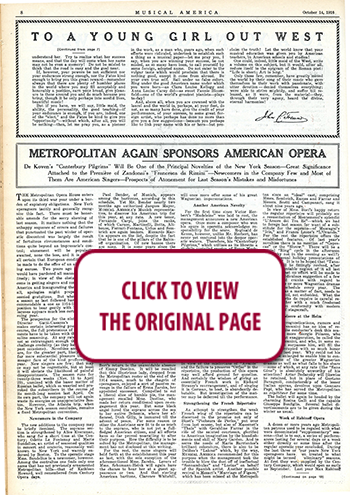 |
De Koven’s “Canterbury Pilgrims” Will Be One of the Principal Novelties of the New York Season—Great Significance Attached to the Premiere of Zandonai’s “Francesca da Rimini”—Newcomers in the Company Few and Most of Them Are American Singers—Prospects of Atonement for Last Season’s Mistakes and Misfortunes
|
|
14 October 1916
Page 5
WHENCE SHALL COME THE AMERICAN CONDUCTOR? |
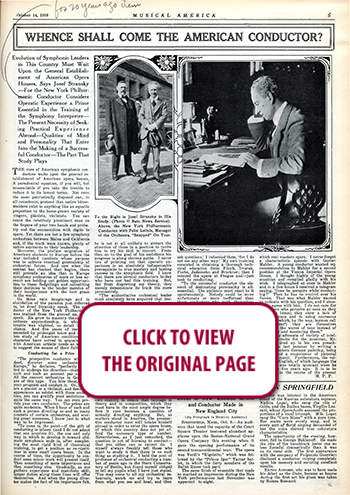 |
Evolution of Symphonic Leaders in This Country Must Wait Upon the General Establishment of American Opera Houses, Says Josef Stransky—For the New York Philharmonic Conductor Considers Operatic Experience a Prime Essential in the Training of the Symphony Interpreter—The Present Necessity of Seeking Practical Experience Abroad—Qualities of Mind and Personality That Enter Into the Making of a Successful Conductor—The Part That Study Plays
|
|
30 September 1916
Page 19
“His Majesty the Motor” and Some of His Artist Devotees |
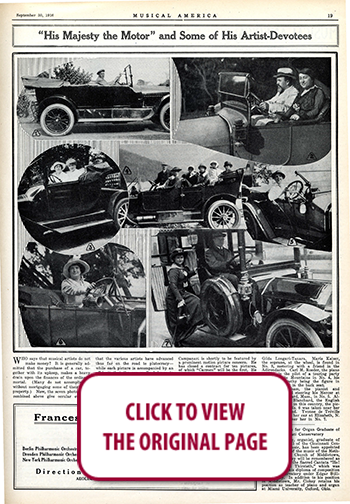 |
WHO says that musical artists do not make money? It is generally admitted that the purchase of a car, together with its upkeep, makes a heavy drain upon the finances of the ordinary mortal. (Many do not accomplish it without mortgaging some of their other property.) Now, the seven photographs combined above give occular evidence that the various artists have advanced thus far on the road to plutocracy—while each picture is accompanied by an affidavit that the car really belongs to its presumptive owner and is not borrowed for photographic purposes....
|
|
30 September 1916
Page 2
MME. CARREÑO AS A SUSPECTED SPY |
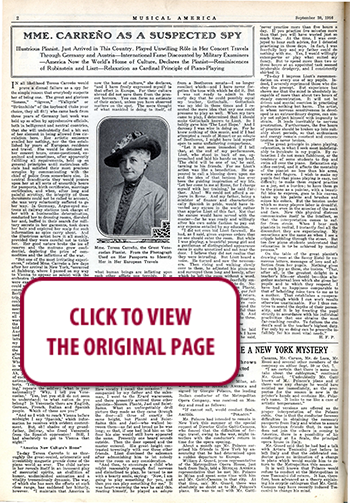 |
Illustrious Pianist, Just Arrived in This Country, Played Unwilling Role in Her Concert Travels Through Germany and Austria—International Fame Discounted by Military Examiners—America Now the World’s Home of Culture, Declares the Pianist—Reminiscences of Rubinstein and Liszt—Relaxation as Cardinal Principle of Piano-Playing
|
|
5 August 1916
Page 24
A MEMORY OF JENNY LIND’S FIRST AMERICAN APPEARANCE |
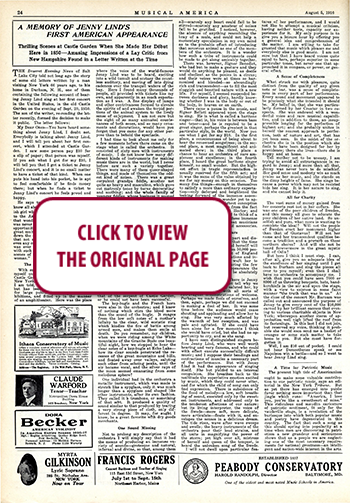 |
Thrilling Scenes at Castle Garden When She Made Her Début Here in 1850—Amusing Impressions of a Lay Critic from New Hampshire Found in a Letter Written at the Time
|
|
22 July 1916
Page 39
STAGE FRIGHT AND ITS REMEDY |
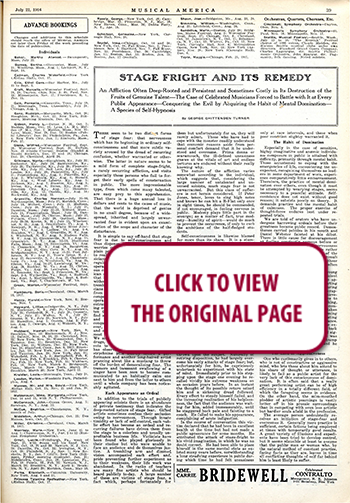 |
An Affliction Often Deep-Rooted and Persistent and Sometimes Costly in Its Destruction of the Fruits of Genuine Talent—The Case of Celebrated Musicians Forced to Battle with It at Every Public Appearance—Conquering the Evil by Acquiring the Habit of Mental Domination—A Species of Self-Hypnosis
|
|
22 July 1916
Page 29
“FIRSTS” IN AMERICAN MUSICAL HISTORY |
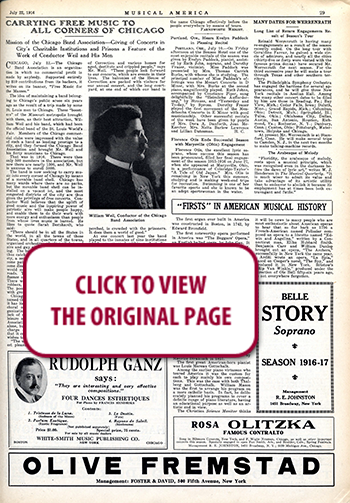 |
The first organ ever built in America was constructed in Boston, in 1742, by Edward Bromfield.
The first noteworthy opera performed in America was “The Beggars’ Opera,” an English ballad opera, by John Gay. It was produced in London, 1727, and offered to the New York public in 1750. Other early operatic attempts in New York, cited by The Musician, include Bickerstaff’s comic opera “Love in a Village,” 1768, and the same composer’s “Maid of the Mill,” 1773....
|
|
22 July 1916
Page 5
MEMORIES OF OLD STEINWAY HALL DAYS OF MUSIC |
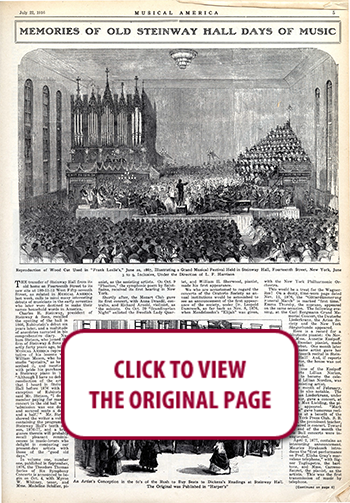 |
. . .Charles H. Steinway, president of Steinway & Sons, recalled the opening of the hall in 1866, Rubinstein’s debut six years later, and a multitude of anecdotes narrated in his comprehensive diary. Nahum Stetson, who joined the firm of Steinway & Sons exactly forty years ago, told a MUSICAL AMERICA representative of his lessons with William Mason, who had a studio “upstairs,” as he described it, and mentioned with pride his purchase of a Steinway piano in 1868. . . .
|
|
15 July 1916
Page 21
SIEVEKING AS TEACHER-COMPOSER |
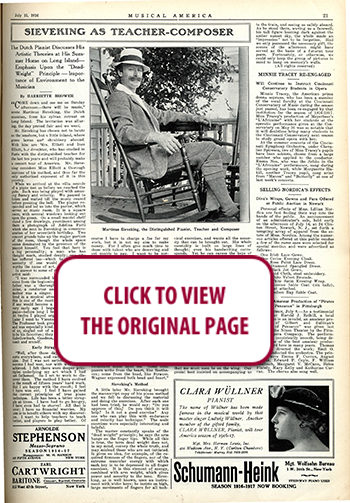 |
The Dutch Pianist Discusses His Artistic Theories at His Summer Home on Long Island—Emphasis Upon the “Dead-Weight” Principle—Importance of Environment to the Musician
|
|
15 July 1916
Page 5
TRANSFER OF STEINWAY HALL WILL MARK THE PASSING OF WORLD-FAMOUS MUSICAL CENTER |
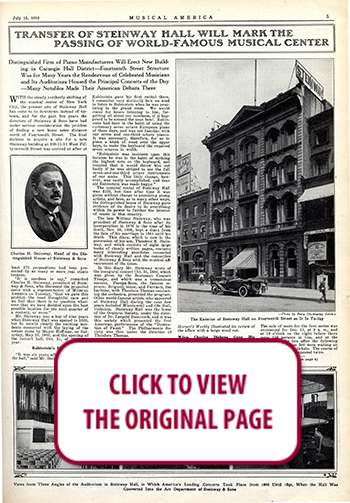 |
Distinguished Firm of Piano Manufacturers Will Erect New Building in Carnegie Hall District—Fourteenth Street Structure Was for Many Years the Rendezvous of Celebrated Musicians and Its Auditorium Housed the Principal Concerts of the Day—Many Notables Made Their American Debuts There
|
|
8 July 1916
Page 31
OBERLIN A COLLEGE OF HIGH MUSICAL IDEALS |
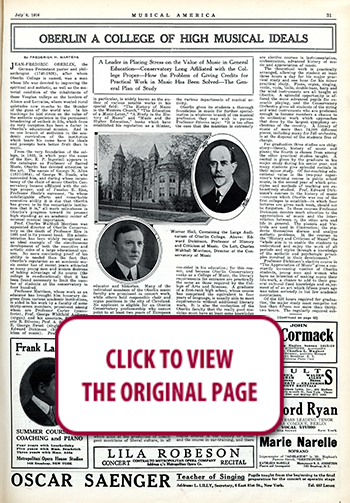 |
A Leader in Placing Stress on the Value of Music in General Education—Conservatory Long Affiliated with the College Proper—How the Problem of Giving Credits for Practical Work in Music Has Been Solved—The General Plan of Study
|
|
1 July 1916
Page 35
RUDOLPH GANZ AS MUSICAL EDITOR |
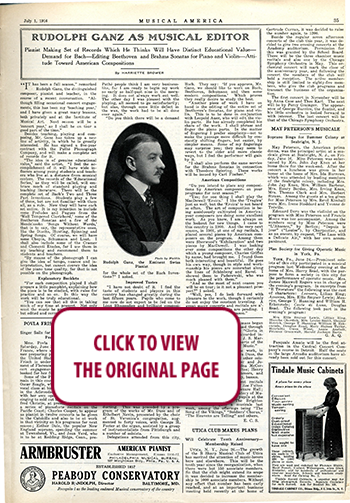 |
Pianist Making Set of Records Which He Thinks Will Have Distinct Educational Value—Demand for Bach—Editing Beethoven and Brahms Sonatas for Piano and Violin—Attitude Toward American Compositions
|
|
1 July 1916
Page 18
ORIGIN OF SCANDINAVIAN INSTRUMENTS IS TRACED |
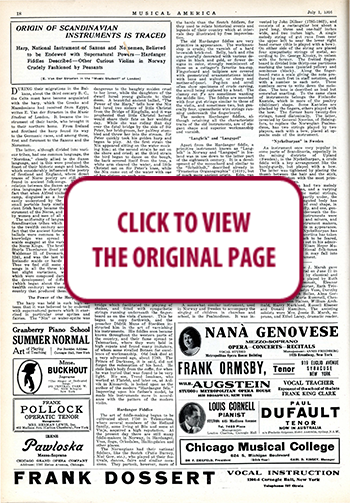 |
Harp, National Instrument of Saxons and Norsemen, Believed to be Endowed with Supernatural Powers—Hardanger Fiddles Described—Other Curious Violins in Norway Crudely Fashioned by Peasants
|
|
24 June 1916
Page 17
LESCHETIZKY AND THE VIRTUOSO |
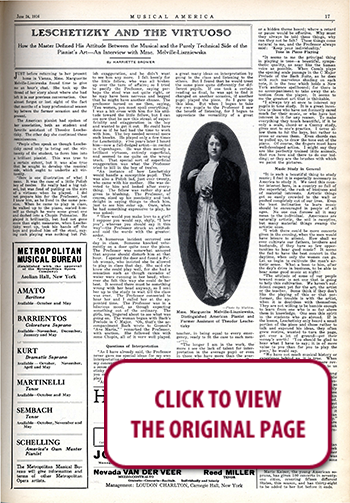 |
How the Master Defined His Attitude Between the Musical and the Purely Technical Side of the Pianist’s Art—An Interview with Mme. Melville-Liszniewska
|
|
17 June 1916
Page 44
THE SOCIALIZATION OF MUSIC |
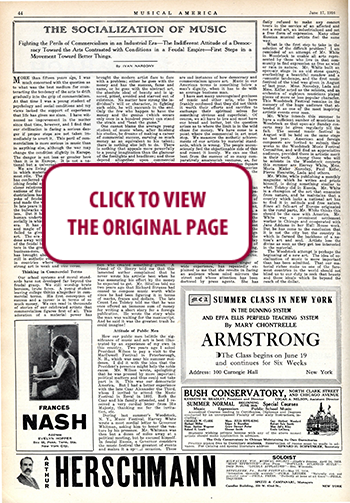 |
Fighting the Perils of Commercialism in an Industrial Era—The Indifferent Attitude of a Democracy Toward the Arts Contrasted with Conditions in a Feudal Empire—First Steps in a Movement Toward Better Things
|
|
10 June 1916
Page 28
Saint-Saëns Tells of Wartime Sufferings of Musicians |
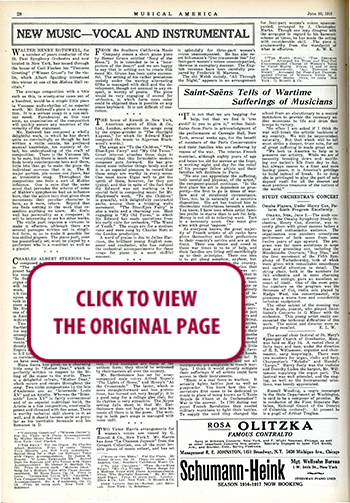 |
Violinist to Establish Institution on Principles That He Laid Down in His Settlement Work—”A Place Where People Will Come to Acquire Musical Knowledge for the Sheer Joy of It”—Clara Mannes Associated with Her Husband and Distinguished Faculty Is Assured
|
|
3 June 1916
Page 48
MacDowell’s Ideas of Best Interpretation of His Music |
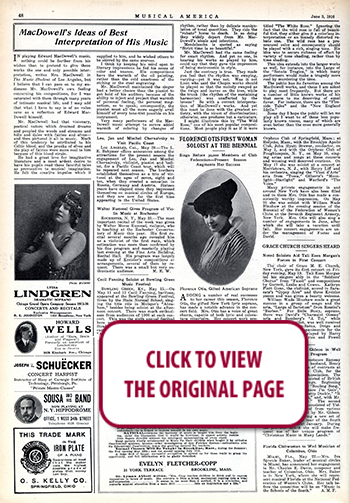 |
IN playing Edward MacDowell’s music, nothing could be farther from his wishes than to pretend to give these works the one and only possible interpretation, writes Mrs. MacDowell in The Music Student of Los Angeles, but I believe that I can pass on to my audiences Mr. MacDowell’s own feeling concerning his compositions, for I was saturated with them through many years of intimate musical life, and I may add that what I have to say is of no value save as a reflection of Edward MacDowell himself.
|
|
27 May 1916
Page 9
FRITZ KREISLER MAKES A PLEA FOR SIMPLE THINGS IN LIFE |
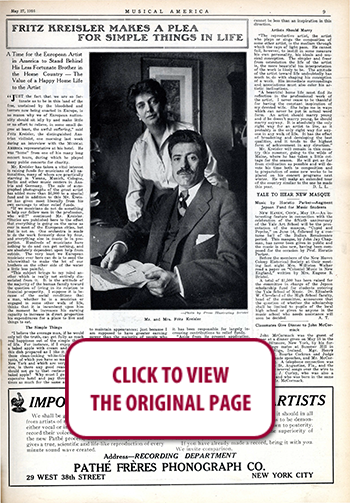 |
A Time for the European Artist in America to Stand Behind His Less Fortunate Brother in the Home Country—The Value of a Happy Home Life to the Artist
|
|
20 May 1916
Page 43
Perpetuating Kitty Cheatham’s Art on the Talking=Machine |
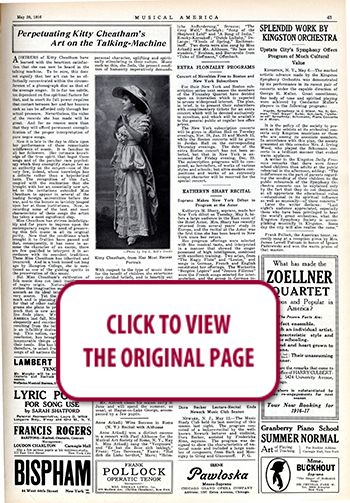 |
ADMIRERS of Kitty Cheatham have learned with the heartiest satisfaction that she can now be heard in the talking machine. To be sure, this does not signify that her art can be as effectually concentrated within the circumference of a phonograph disc as that of the average singer. It is far too subtle, too dependent on fine spiritual factors for that, and to exert its full power requires that contact between her and her hearers such as can be afforded only through her actual presence. Nevertheless, the value of the records she has made will be great....
|
|
6 May 1916
Page 64
CARUSO DISCUSSES ART OF SINGING |
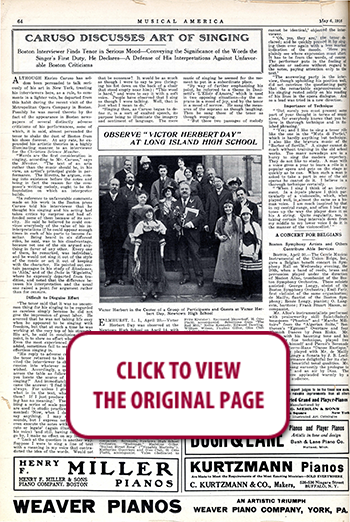 |
Boston Interviewer Finds Tenor in Serious Mood—Conveying the Significance of the Words the Singer’s First Duty, He Declares—A Defense of His Interpretations Against Unfavorable Boston Criticisms
|
|
6 May 1916
Page 1
CINCINNATI GIVES THE ALPINE” SYMPHONY AMERICAN PREMIERE |
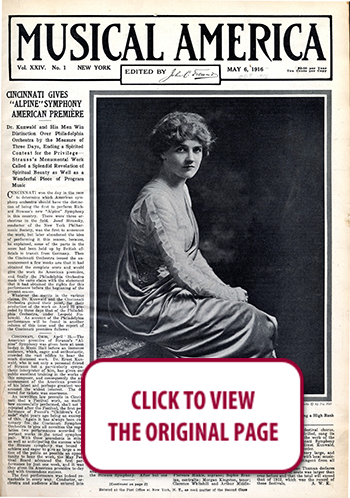 |
Dr. Kunwald and His Men Win Distinction Over Philadelphia Orchestra by the Measure of Three Days, Ending a Spirited Contest for the Privilege—Strauss’s Monumental Work Called a Splendid Revelation of Spiritual Beauty as Well as a Wonderful Piece of Program Music
|
|
29 April 1916
Page 25
H. T. BUIRLEIGH: COMPOSER BY DIVINE RIGHT AND “THE AMERICAN COLERIDGE-TAYLOR” |
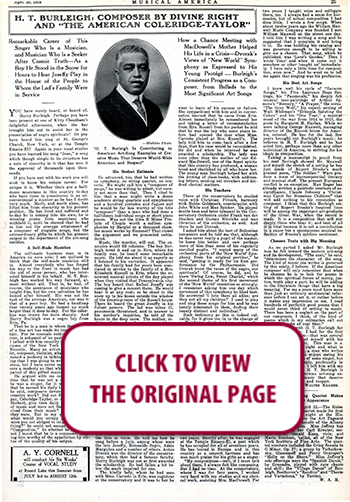 |
Remarkable Career of This Singer Who Is a Musician, and Musician Who Is a Seeker After Cosmic Truth—As a Boy He Stood in the Snow for Hours to Hear Joseffy Play in the House of the People to Whom the Lad’s Family Were in Service
|
|
22 April 1916
Page 51
NIJINSKY’S ADVENT ACCOMPLISHED WITH DUE ECLAT |
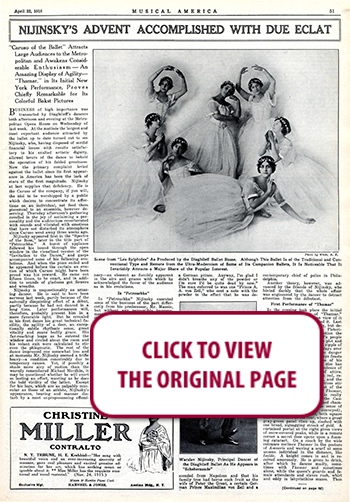 |
“Caruso of the Ballet” Attracts Large Audiences to the Metropolitan and Awakens Considerable Enthusiasm—An Amazing Display of Agility—“Thamar,” in Its Initial New York Performance, Proves Chiefly Remarkable for Its Colorful Bakst Pictures
|
|
15 April 1916
Page 3
NIJINSKI WRITING BOOK TO PERPETUATE HIS ART |
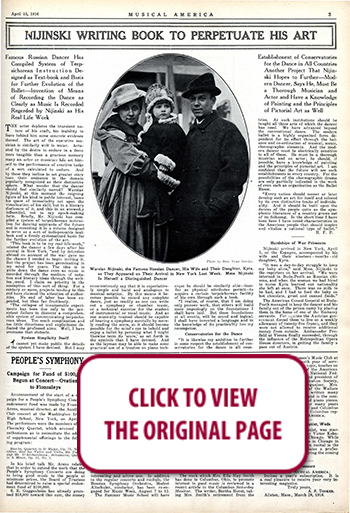 |
Famous Russian Dancer Has Compiled System of Terpsichorean Instruction Designed as Text-book and Basis for Further Evolution of the Ballet—Invention of Means of Recording the Dance as Clearly as Music Is Recorded Regarded by Nijinsky as His Real Life Work—Establishment of Conservatories for the Dance in All Countries Another Project That Nijinsky Hopes to Further—Modern Dancer, Says He, Must Be a Thorough Musician and Actor and Have a Knowledge of Painting and the Principles of Pictorial Art as Well
|
|
15 April 1916
Page 1
MAHLER’S “EIGHTH” WINS OVATION FOR ITS PERFORMERS |
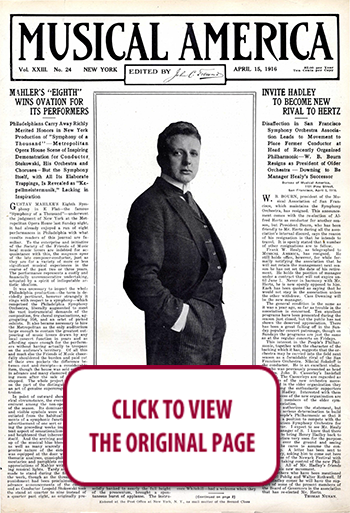 |
Philadelphians Carry Away Richly Merited Honors in New York Production of “Symphony of a Thousand”—Metropolitan Opera House Scene of Inspiring Demonstration for Conductor Stokowski, His Orchestra and Choruses—But the Symphony Itself, with All Its Elaborate Trappings, Is Revealed as “Kapellmeistermusik,” Lacking in Inspiration
|
|
1 April 1916
Page 1
GRANADOS BELIEVED TO HAVE PERISHED IN SUSSEX TRAGEDY |
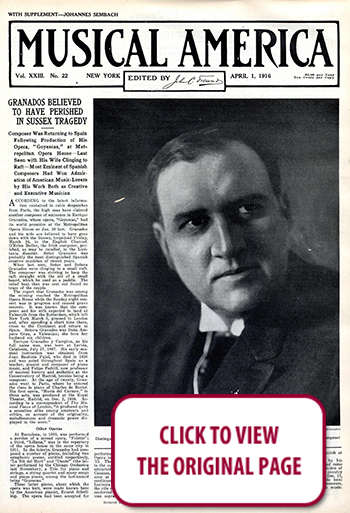 |
Composer Was Returning to Spain Following Production of His Opera, “Goyescas,” at Metropolitan Opera House—Last Seen with His Wife Clinging to Raft—Most Eminent of Spanish Composers Had Won Admiration of American Music-Lovers by His Work Both as Creative and Executive Musician
|
|
25 March 1916
Page 40
NEW RAVEL MUSIC IN A BOSTON CONCERT |
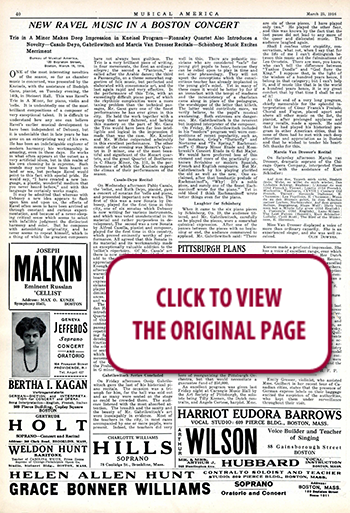 |
Trio in A Minor Makes Deep Impression in Kneisel Program—Flonzaley Quartet Also Introduces a Novelty—Casals-Deyo, Gabrilowitsch and Marcia Van Dresser Recitals—Schönberg Music Excites Merriment
|
|
18 March 1916
Page 2
“DR. MUCK HAS LITTLE OR NO REGARD FOR HIS SOLOISTS”—JOSEF HOFMANN |
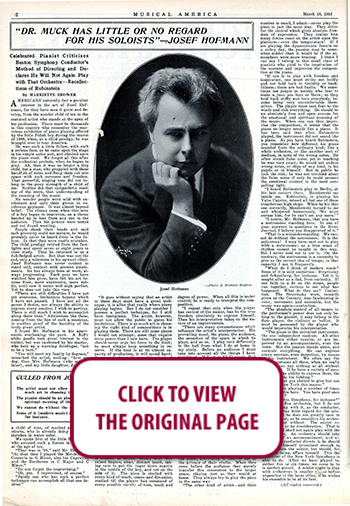 |
Celebrated Pianist Criticizes Boston Symphony Conductor’s Method of Directing and Declares He Will Not Again Play with That Orchestra—Recollections of Rubinstein
|
|
11 March 1916
Page 1
MAHLER’S “EIGHTH” GIVEN A BRILLIANT AMERICAN PREMIERE |
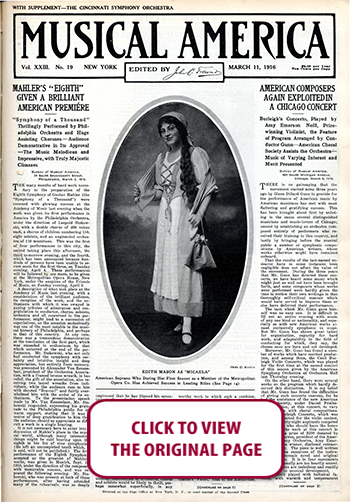 |
“Symphony of a Thousand” Thrillingly Performed by Philadelphia Orchestra and Huge Assisting Choruses—Audience Demonstrative in Its Approval—The Music Melodious and Impressive, with Truly Majestic Climaxes
|
|
4 March 1916
Page 11
GEORGES ENESCO: THE MUSICIAN AND THE MAN |
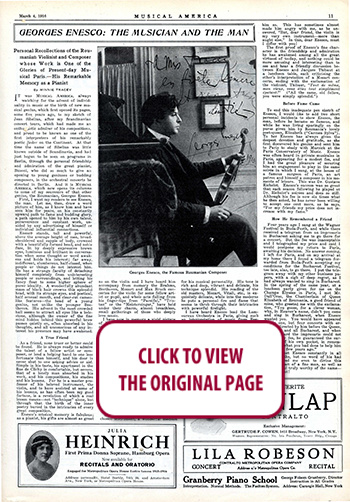 |
Personal Recollections of the Roumanian Violinist and Composer whose Work is One of the Glories of Present-day—Musical Paris—His Remarkable Memory as a Pianist
|
|
26 February 1916
Page 23
HOPES OF POLAND CRYSTALLIZED IN STOJOWSKI’S NEW CANTATA |
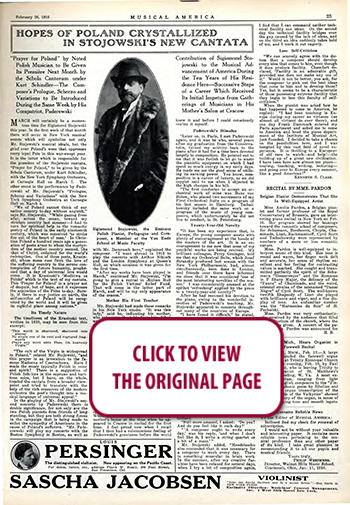 |
“Prayer for Poland” by Noted Polish Musician to Be Given Its Premiere Next Month by the Schola Cantorum under Kurt Schindler—The Composer’s Prologue, Scherzo and Variations to Be Introduced During the Same Week by His Compatriot, Paderewski—Contribution of Sigismond Stojowski to the Musical Advancement of America During the Ten Years of His Residence Here—Successive Steps of a Career Which Received Its Initial Impetus from Gatherings of Musicians in His Mother’s Salon at Cracow
|
|
19 February 1916
Page 1
BALTIMORE’S NEW ORCHESTRA GAINS EPOCHAL SUCCESS |
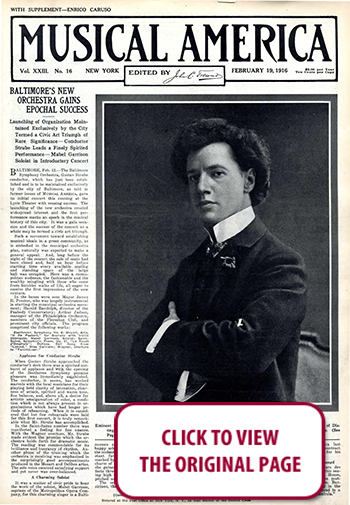 |
Launching of Organization Maintained Exclusively by the City Termed a Civic Art Triumph of Rare Significance—Conductor Strube Leads a Finely Spirited Performance—Mabel Garrison Soloist in Introductory Concert
|
|
12 February 1916
Page 3
TECHNIQUE, NOT BRAINS, PIANISTS’ CHIEF ASSET |
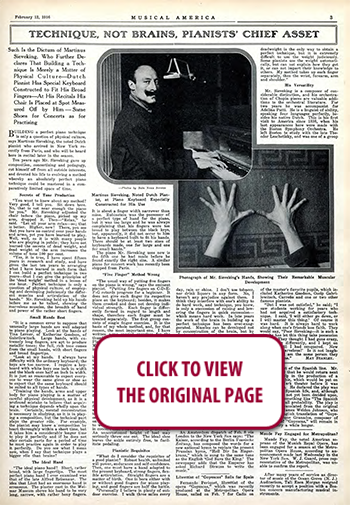 |
Such Is the Dictum of Martinus Sieveking, Who Further Declares That Building a Technique Is Merely a Matter of Physical Culture—Dutch Pianist Has Special Keyboard Constructed to Fit His Broad Fingers—At His Recitals His Chair Is Placed at Spot Measured Off by Him—Same Shoes for Concerts as for Practicing
|
|
5 February 1916
Page 23
Reminiscences of the Great Joachim by One of His Pupils |
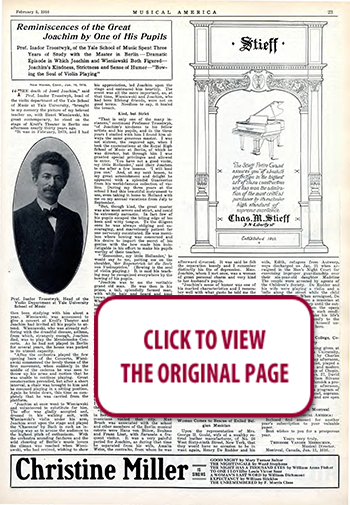 |
Prof. Isador Troostwyk, of the Yale School of Music Spent Three Years of Study with the Master in Berlin—Dramatic Episode in Which Joachim and Wieniawski Both Figured—Joachim’s Kindness, Strictness and Sense of Humor—”Bowing the Soul of Violin Playing”
|
|
29 January 1916
Page 3
DIAGHILEFF BALLET INTRODUCES “PETROUCHKA” |
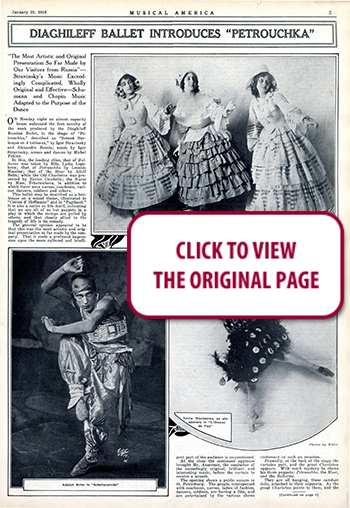 |
“The Most Artistic and Original Presentation So Far Made by Our Visitors from Russia”--Stravinsky’s Music Exceedingly Complicated, Wholly Original and Effective--Schumann and Chopin Music Adapted to the Purpose of the Dance
|
|
22 January 1916
Page 3
DIAGHILEFF PROPHESIES “BALLET AMERICAINE” |
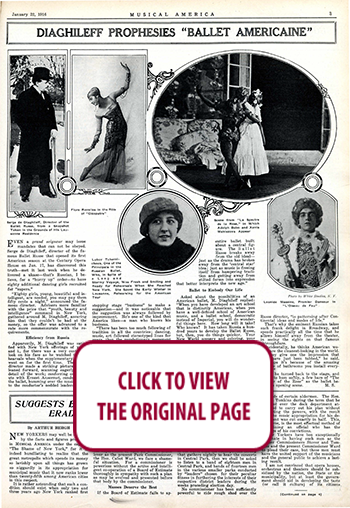 |
...EVEN a grand seigneur may issue mandates that cannot be obeyed. Serge de Diaghileff, director of the famous Ballet Russe that opened its first American season at the Century Opera House on Jan. 17, has discovered this truth—met it last week when he delivered a ukase—that’s Russian, I believe, for a “hurry up” order—to have eighty additional dancing girls recruited for “supers....”
|
|
8 January 1916
Page 44
BORODINE AS MAN AND AS COMPOSER |
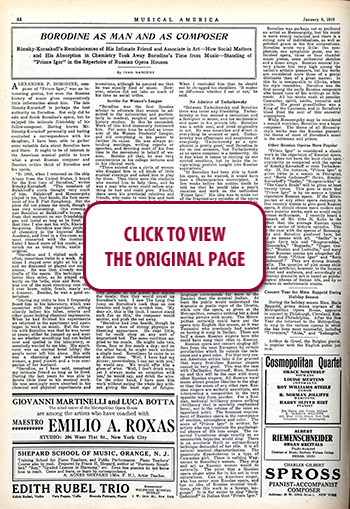 |
Rimsky-Korsakoff’s Reminiscences of His Intimate Friend and Associate in Art—How Social Matters and His Absorption in Chemistry Took Away Borodine’s Time from Music—Standing of “Prince Igor” in the Répertoire of Russian Opera Houses
|
|
1 January 1916
Page 32
David Bispham Recalls Amusing Mishaps in His Operatic Career |
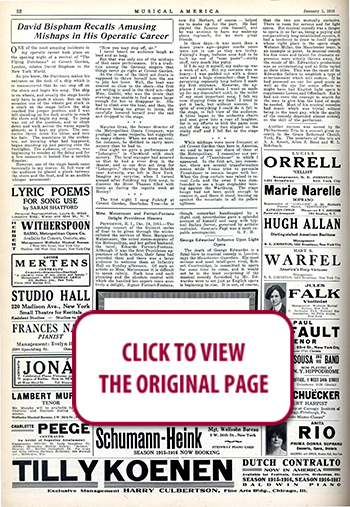 |
...As you know, the Dutchman makes his entrance on the deck of a ship which is so maneuvered that he can step off on the shore and begin his song. The ship is on wheels, and usually the stage hands only have to push it about. But on this occasion one of the wheels got stuck in a crack on the stage before the ship reached the proper position and I was left standing on the deck unable to reach the shore and begin my song....
|
|
25 December 1915
Page 3
GRANADOS HERE FOR PRODUCTION OF “GOYESCAS” |
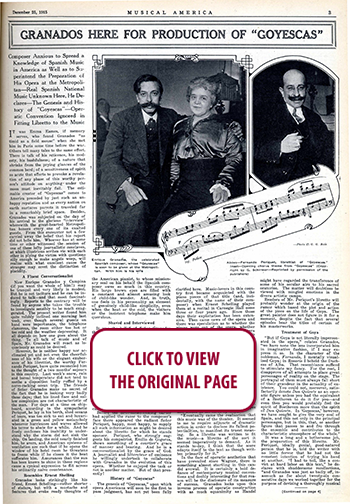 |
Composer Anxious to Spread a Knowledge of Spanish Music in America as Well as to Superintend the Preparation of His Opera at the Metropolitan—Real Spanish National Music Unknown Here, He Declares—The Genesis and History of “Goyescas”—Operatic Convention Ignored in Fitting Libretto to the Music
|
|
11 December 1915
Page 3
IGOR STRAVINSKY AS COMJPOSER FOR THE BALLET |
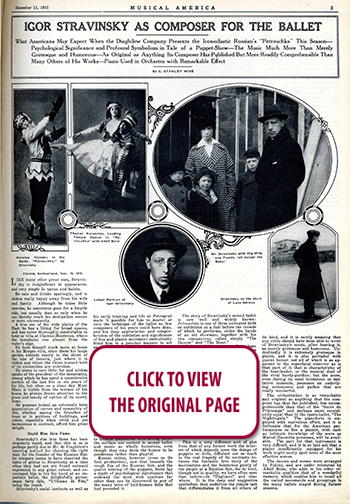 |
What Americans May Expect When the Diaghilew Company Presents the Iconoclastic Russian’s “Petrouchka” This Season—Psychological Significance and Profound Symbolism in Tale of a Puppet-Show—The Music Much More Than Merely Grotesque and Humorous—As Original as Anything Its Composer Has Published But More Readily Comprehensible Than Many Others of His Works—Piano Used in Orchestra with Remarkable Effect
|
|
4 December 1915
Page 37
A NEW NOTE IN OUR PIANO MUSIC |
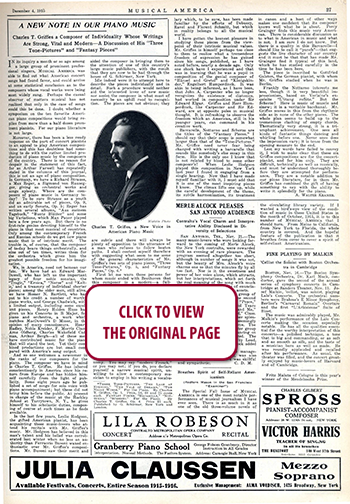 |
Charles T. Griffes a Composer of Individuality Whose Writings Are Strong, Vital and Modern—A Discussion of His Three Tone-Pictures” and “Fantasy Pieces”
|
|
4 December 1915
Page 33
GIVING CONCERTS AT THE FRONT IN FRANCE |
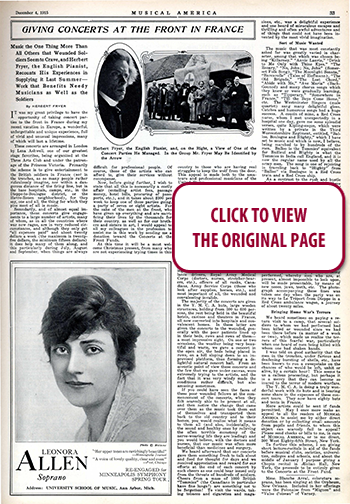 |
Music the One Thing More Than All Others that Wounded Soldiers Seem to Crave, and Herbert Fryer, the English Pianist, Recounts His Experiences in Supplying it Last Summer—Work that Benefits Needy Musicians as Well as the Soldiers
|
|
27 November 1915
Page 21
SCHÖNBERG POEM IN FIRST HEARING |
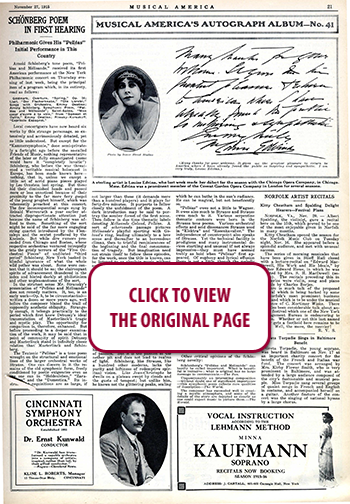 |
Philharmonic Gives His “Pelléas” Initial Performance in This Country
...Local concertgoers have now heard six works by this strange personage, so extensively and acrimoniously debated, yet so little understood. But except for the “Kammersymphonie,” done semi-privately a fortnight ago before the so-called Friends of Music, nothing representative of the later or fully emancipated (some would have it “completely lunatic”) Schönberg, who before the war threatened a veritable musical holocaust in Europe, has been made known here—nothing, that is, unless we except a little set of acrid piano pieces played by Leo Ornstein last spring....
|
|
27 November 1915
Page 13
STUDYING WITH LESCHETIZKY AS IT IMPRESSED CLARENCE BIRD |
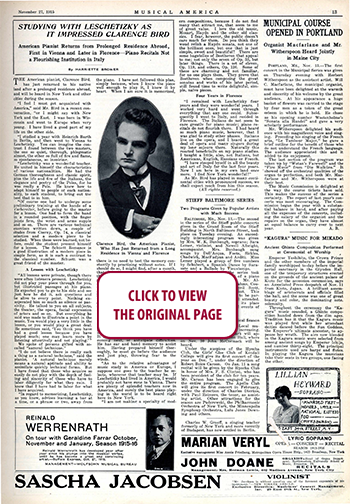 |
American Pianist Returns from Prolonged Residence Abroad, First in Vienna and Later in Florence—Piano Recitals Not a Flourishing Institution in Italy
|
|
27 November 1915
Page 3
PASSING OF THE WORLD’S MOST FAMOUS PIANO TEACHER |
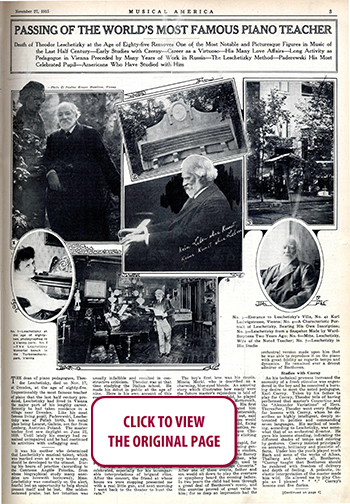 |
Death of Theodor Leschetizky at the Age of Eighty-five Removes One of the Most Notable and Picturesque Figures in Music of the Last Half Century—Early Studies with Czerny—Career as a Virtuoso—His Many Love Affairs—Long Activity as Pedagogue in Vienna Preceded by Many Years of Work in Russia—The Leschetizky Method—Paderewski His Most Celebrated Pupil—Americans Who Have Studied with Him
|
|
20 November 1915
Page 31
Origin and Development of the Flozaley Quartet |
 |
The Story of the Attainment of a Noble Artistic Ideal—The Members Now in the Eleventh Year of Their Association
|
|
6 November 1915
Page 9
SCHOOL Of BATTISTINI DYING OUT, SAYS DE LUCA |
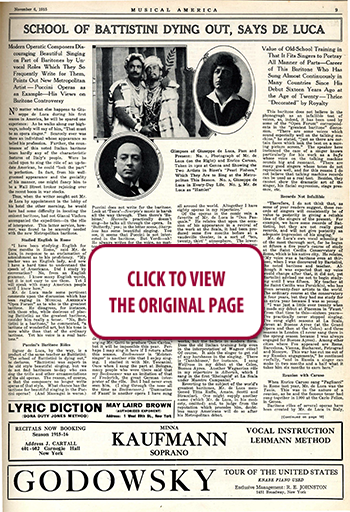 |
Modern Operatic Composers Discouraging Beautiful Singing on Part of Baritones by Un-vocal Roles Which They So Frequently Write for Them, Points Out New Metropolitan Artist—Puccini Operas as an Example—His Views on Baritone Controversy—Value of Old-School Training in
That It Fits Singers to Portray All Manner of Parts—Career of This Baritone Who Has Sung Almost Continuously in Many Countries Since His Debut Sixteen Years Ago at the Age of Twenty—Thrice “Decorated” by Royalty
|
|
30 October 1915
Page 9
HAROLD BAUER AS A TEACHER |
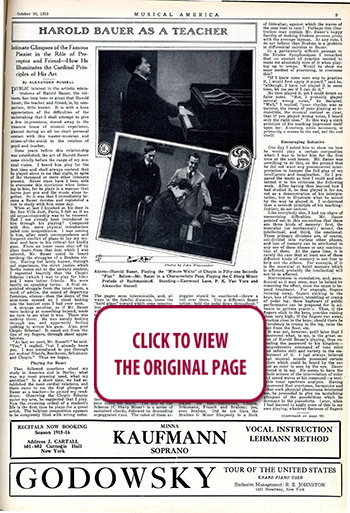 |
Intimate Glimpses of the Famous Pianist in the Rôle of Preceptor and Friend—How He Illuminates the Cardinal Principles of His Art
|
|
16 October 1915
Page 209
When P. T. Barnum Was a Concert Manager and Jenny Lind His Star |
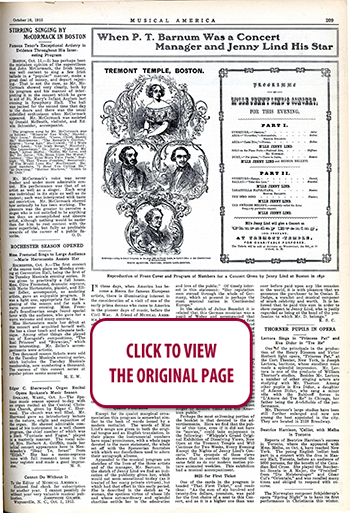 |
IN these days, when America has become a Mecca for famous European artists, there is illuminating interest in the consideration of a visit of one of the early prima donnas who came to America in the pioneer days of music, before the Civil War. A friend of MUSICAL AMERICA has lately put at its disposal a copy of the program of a concert given by Jenny Lind in 1860, at Tremont Temple, Boston. Of this booklet the front cover and the page containing the evening’s program are reproduced herewith....
|
|
16 October 1915
Page 3
“THEIR TEN FAVORITE AMERICAN SONGS |
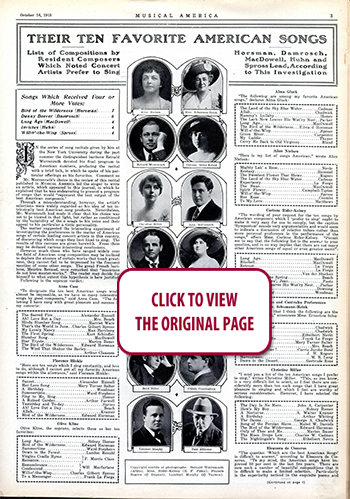 |
Lists of Compositions by Resident Composers Which Noted Concert Artists Prefer to Sing Horsman, Damrosch, MacDowell, Huhn and Spross Lead, According to the Investigation
|
|
2 October 1915
Page 12
“FAKING” IN “MOVIE” MUSIC CORRUPTING PUBLIC’S TASTE |
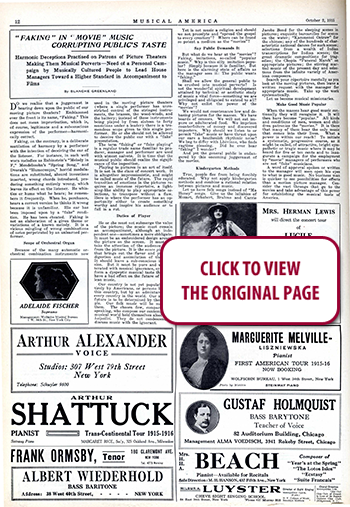 |
Harmonic Deceptions Practised on Patrons of Picture Theaters Making Them Musical Perverts— Need of a Personal Campaign by Musically Cultured People to Lead House Managers Toward a Higher Standard in Accompaniment to Films
|
|
18 September 1915
Page 6
AMERICAN MUSIC IN LONDON PROMS |
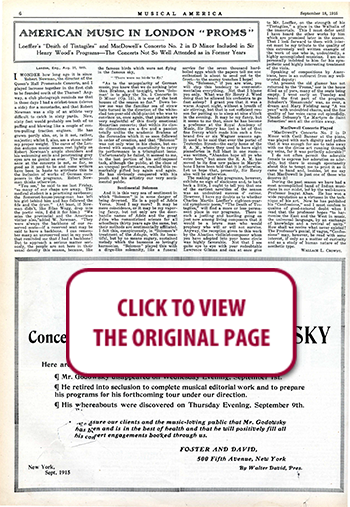 |
Loeffler’s “Death of Tintagiles” and MacDowell’s Concerto No. 2 in D Minor Included in Sir Henry Wood’s Programs—The Concerts Not So Well Attended as in Former Years
|
|
11 September 1915
Page 8
FORSEES A DEEPER HUMANITY IN FRENCH MUSIC, AS WAR’S RESULT |
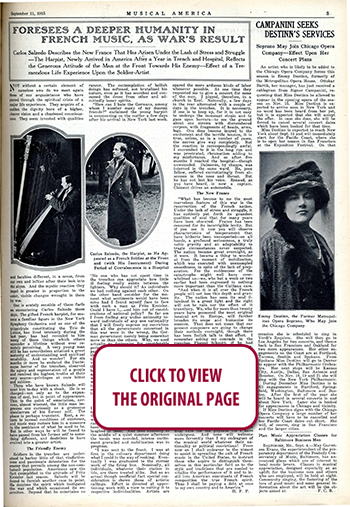 |
Carlos Salzedo Describes the New France That Has Arisen Under the Lash of Stress and Struggle—The Harpist, Newly Arrived in America After a Year in Trench and Hospital, Reflects the Generous Attitude of the Man at the Front Towards His Enemy—Effect of a Tremendous Life Experience Upon the Soldier-Artist
|
|
28 August 1915
Page 5
FARRAR FINDS VASTER PUBIC IN HER “MOVIES” |
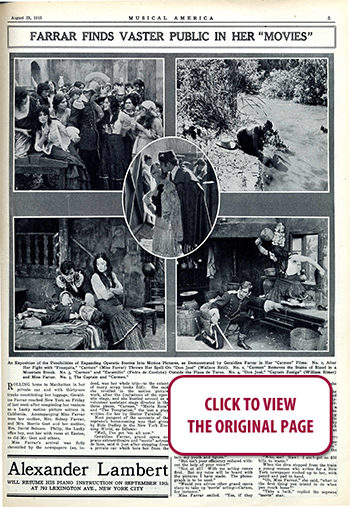 |
...“Well, I’ve got ‘em all now.”
Geraldine Farrar, grand opera soprano extraordinaire and “movie” actress de luxe, said it just after stepping from a private car which bore her from the Lasky film studios at Hollywood, Cal., back to New York.
She meant that a vaster audience than she has been able to reach through her operatic work would now be hers through the medium of the films....
|
|
21 August 1915
Page 26
THE FUTURE OF OPERA IN AMERICA |
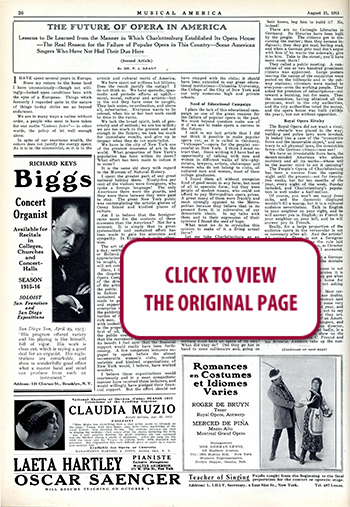 |
Lessons to Be Learned from the Manner in Which Charlottenburg Established Its Opera House—The Real Reason for the Failure of Popular Opera in This Country—Some American Singers Who Have Not Had Their Due Here
|
|
7 August 1915
Page 21
EXTENDING PIANO TECHNIQUE TO MEET DEMANDS OF MODERNISM |
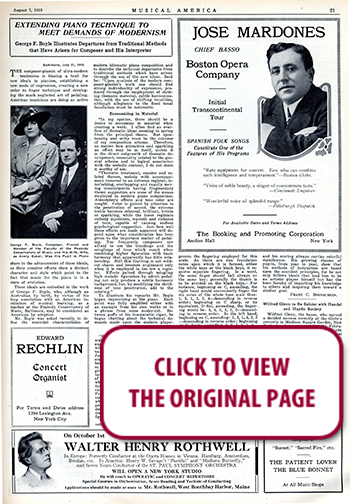 |
George F. Boyle Illustrates Departures from Traditional Methods that Have Arisen for Composer and His Interpreter
THE composer-pianist of ultra-modern tendencies is blazing a trail for new ideals in pianism, establishing a new mode of expression, creating a new order to finger technique and developing the much neglected art of pedaling. American musicians are doing an active share in the advancement of these ideals, as their creative efforts show a distinct character and style which point to the fact that music for the piano is in a state of evolution....
|
|
7 August 1915
Page 2
PAVLOWA THE “MOVIE” MAN’S LATEST CONVERT |
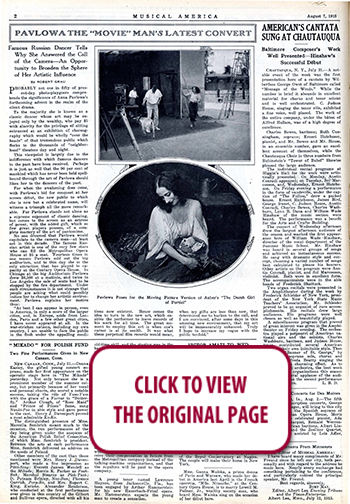 |
Opportunity to Broaden the Sphere of Her Artistic Influence
PROBABLY not one in fifty of present-day photo-playgoers comprehends the significance of Anna Pavlowa’s forthcoming advent in the realm of the silent drama....
|
|
24 July 1915
Page 28
HOW CAN WE MAKE OPERA AN AMERICAN INSTITUTION? |
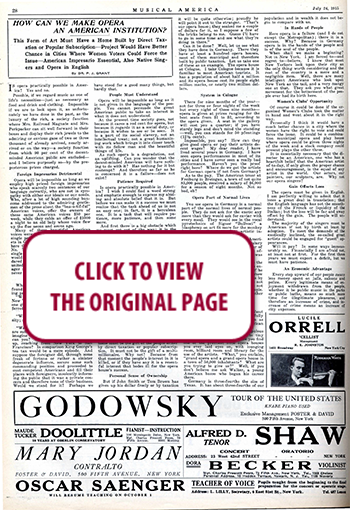 |
This Form of Art Must Have a Home Built by Direct Taxation or Popular Subscription—Project Would Have .Better Chance in Cities Where Women Voters Could Force the Issue—American Impresario Essential, Also Native Singers and Opera in English
|
|
17 July 1915
Page 29
FROM COMIC OPERA TO “HIGHWAYMAN” CANTATA, ADVANCE OF DEEMS TAYLOR |
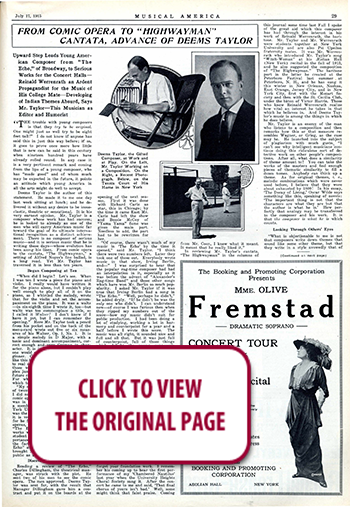 |
Upward Step Leads Young American Composer from “The Echo,” of Broadway, to Serious Works for the Concert Halls—Reinald Werrenrath an Ardent Propagandist for the Music of His College Mate—Developing of Indian Themes Absurd, Says Mr. Taylor—This Musician as Editor and Humorist
|
|
17 July 1915
Page 12
ECHOES OF MUSIC ABROAD |
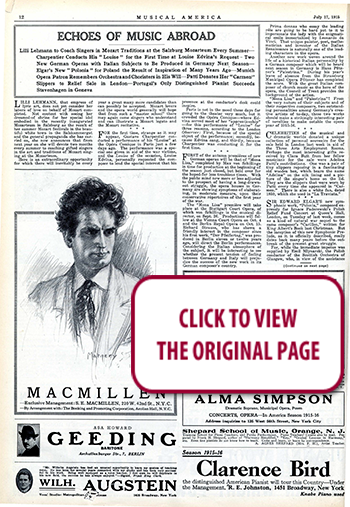 |
Lilli Lehmann to Coach Singers in Mozart Traditions at the Salzburg Mozarteum Every Summer—Charpentier Conducts His “Louise” for the First Time at Louise Edvina’s Request—Two New German Operas with Italian Subjects to Be Produced in Germany Next Season—Elgar’s New “Polonia” for Poland the Result of Inspiration of Many Years Ago—Munich Opera Patron Remembers Orchestra and Choristers in His Will—Patti Donates Her “Carmen” Slippers to Relief Sale in London—Portugal’s Only Distinguished Pianist Succeeds Stavenhagen in Geneva
|
|
10 July 1915
Page 32
SAINT-SAENS LECTURES ON “THE EXECUTION OF MUSIC” |
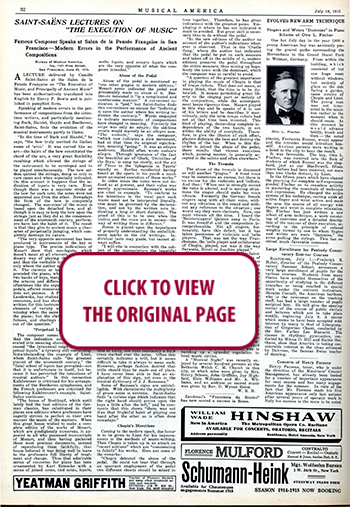 |
Famous Composer Speaks at Salon de la Pensée Française in San Francisco—Modem Errors in the Performance of Ancient Compositions
Speaking of modern errors in the performance of compositions from the olden-time writers, and particularly mentioning Bach, Handel, Haydn and Beethoven, Saint-Saëns, finds the evolution of the musical instruments partly to blame....
|
|
3 July 1915
Page 32
HEROIC FRENCH BANDSMEN LED WAY TO VICTORY AND DEATH |
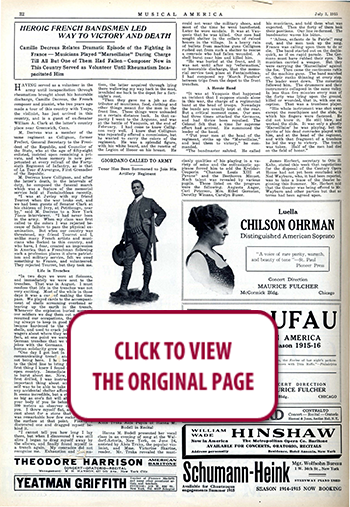 |
Camille Decreus Relates Dramatic Episode of the Fighting in France—Musicians Played “Marseillaise” During Charge Till All But One of Them Had Fallen—Composer Now in This Country Served as Volunteer Until Rheumatism Incapacitated Him
|
|
19 June 1915
Page 40
DESCRIBES RICHARD WAGNER’S WIDOW AS AN OPERATIC COACH |
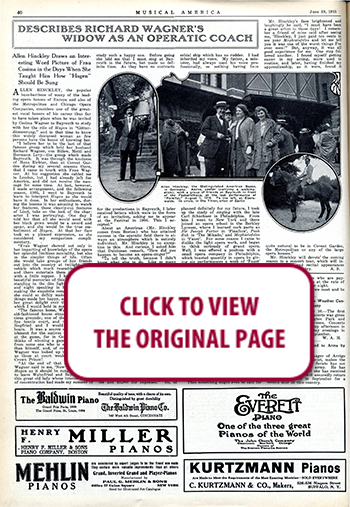 |
Allen Hinckley Draws an Interesting Word Picture of Frau Cosima in the Days When She Taught Him How “Hagen” Should Be Sung
“Frau Wagner showed not only in her imparting of knowledge of the opera her splendid limitless mentality, but also in the simpler things of life. Often she would take groups of her friends out into the country at twilight, in a vehicle which much resembled a ‘bus, and there entertain them in the open with a little supper. I have the most beautiful memories of this great woman, standing in the dim light between day and night speaking in her soft voice, making the exquisite comparisons which she could so deftly make....
|
|
19 June 1915
Page 36
SAINT-SAËNS TALKS OF MUSIC HISTORY |
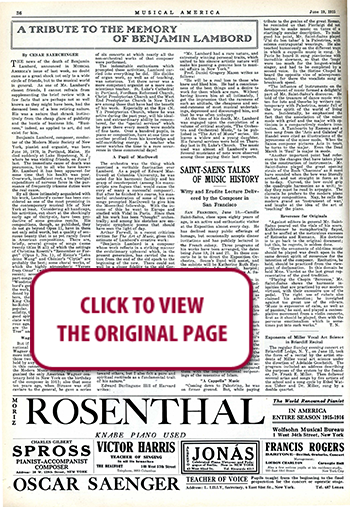 |
Witty and Erudite Lecture Delivered by the Composer in San Francisco
Camille Saint-Saëns, close upon eighty years of age, is an active and enthusiastic visitor at the Exposition almost every day. He has declined many public offerings of homage, but occasionally accepts dinner invitations and has publicly lectured in the French colony. Three programs of his works have been arranged, the dates being June 19, 24 and 27. In these concerts he is to direct the Exposition Orchestra. Sousa’s Band will assist, and the soloists will be Katherine Ruth Heyman, pianist; Ada Sassoli, harpist; Horace Britt, ‘cellist, and Wallace A. Sabin, organist....
|
|
19 June 1915
Page 14
WHAT BELGIUM LOOKS LIKE TO-DAY |
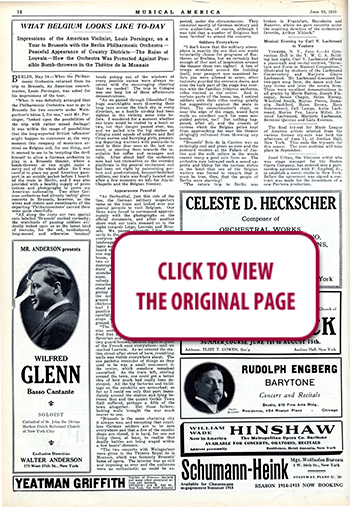 |
Impressions of the American Violinist, Louis Persinger, on a Tour to Brussels with the Berlin Philharmonic Orchestra—Peaceful Appearance of Country Districts—The Ruins of Louvain—How the Orchestra Was Protected Against Possible Bomb-throwers in the Théâtre de la Monnaie
|
|
19 June 1915
Page 11
ECHOES OF MUSIC ABROAD |
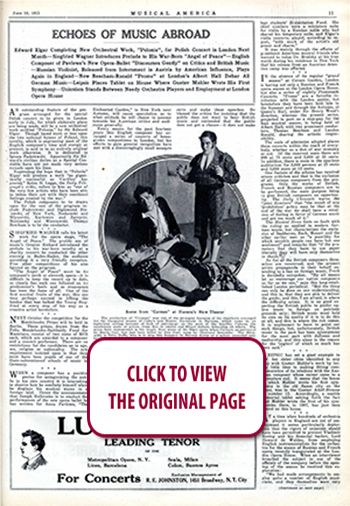 |
Edward Elgar Completing New Orchestral Work, “Polonia,” for Polish Concert in London Next Month—Siegfried Wagner Introduces Prelude to His War-Born “Angel of Peace”—English Composer of Pavlowa’s New Opera-Ballet “Discourses Gently” on Critics and British .Music—Russian Violinist, Released from Internment in Austria by American Influence, Plays Again in England—New Beecham-Ronald “Proms” at London’s Albert Hall Debar All German Music—Leipsic Places Tablet on House Where Gustav Mahler Wrote His First Symphony—Unionism Stands Between Needy Orchestra Players and Employment at London Opera House
|
|
12 June 1915
Page 31
WALT WHITMAN’S VISION OF AMERICA SINGING |
 |
The Poet as Prophet of His Country’s Future Greatness in the Art of Music—His Call for “A Higher Strain Than Any Yet”—”New Rhythmus” Needed to Convey America’s Mighty Message
|
|
12 June 1915
Page 15
CHANGED STATUS OF THE ACCCOMPANIST |
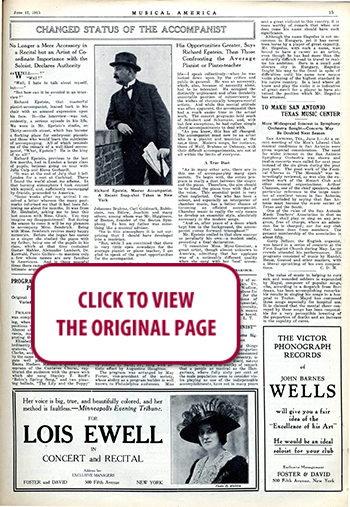 |
No Longer a Mere Accessory in a Recital but an Artist of Coordinate Importance with the Soloist, Declares Authority— His Opportunities Greater, Says Richard Epstein, Than Those Confronting the Average Pianist or Piano-teacher
|
|
5 June 1915
Page 5
BROADENS PIANO’S SCOPE WITH SUPER-TECHNIQUE |
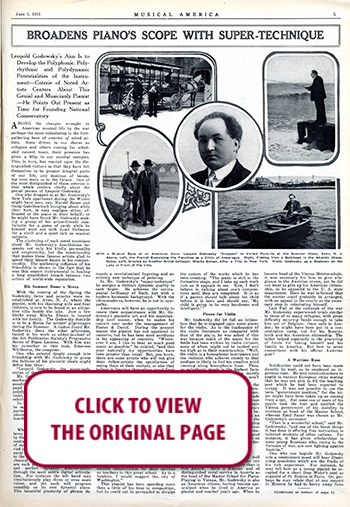 |
Leopold Godowsky’s Aim Is to Develop the Polyphonic, Polyrhythmic and Polydynamic Potentialities of the Instrument—Coterie of Noted Artists Centers About This Genial and Musicianly Pianist—He Points Out Present as Time for Founding National Conservatory
|
|
29 May 1915
Page 36
RICHARD STRAUSS A “SMUGGLER” |
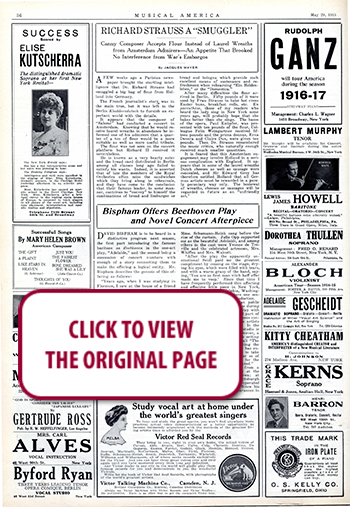 |
Canny Composer Accepts Flour Instead of Laurel Wreaths from Amsterdam Admirers—An Appetite That Brooked No Interference from War’s Embargos
A FEW weeks ago a Parisian newspaper brought the startling intelligence that Dr. Richard Strauss had smuggled a big bag of flour from Holland into Germany. The French journalist’s story was in the main true, but it was left to the Berlin Kladderadatsch to furnish an expectant world with the details....
|
|
22 May 1915
Page 11
ECHOES OF MUSIC ABROAD |
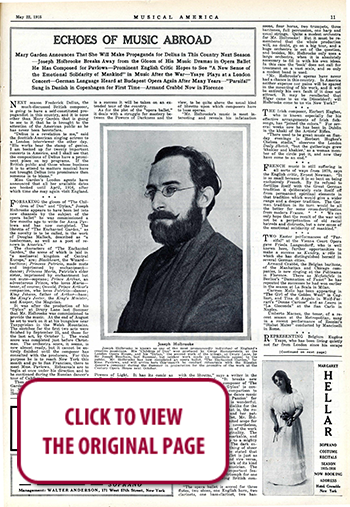 |
Mary Garden Announces That She Will Make Propaganda for Delius in This Country Next Season—Joseph Holbrooke Breaks Away from the Gloom of His Music Dramas in Opera Ballet He Has Composed for Pavlowa—Prominent English Critic Hopes to See “A New Sense of the Emotional Solidarity of Mankind” in Music After the War—Ysaye Plays at a London Concert—German Language Heard at Budapest Opera Again After Many Years—“Parsifal” Sung in Danish in Copenhagen for First Time—Armand Crabbe Now in Florence
|
|
22 May 1915
Page 1
SAINT-SAËNS HERE AS FRENCH ENVOY TO THE EXPOSITION |
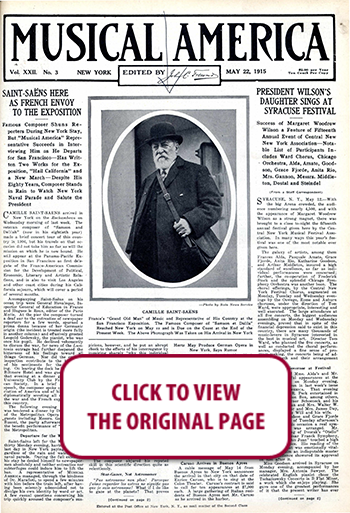 |
Famous Composer Shuns Reporters During New York Stay, But “Musical America” Representative Succeeds in Interviewing Him as He Departs for San Francisco—Has Written Two Works for the Exposition, “Hail California” and a New March—Despite His Eighty Years, Composer Stands in Rain to Watch New York Naval Parade and Salute the President
|
|
15 May 1915
Page 45
MUSICIANS LOST IN LUSITANIA DISASTER |
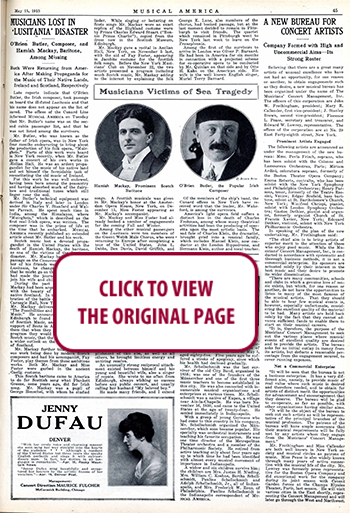 |
O'Brien Butler, Composer, and Hamish Mackay, Baritone, Among Missing
Both Were Returning from America After Making Propaganda for the Music of Their Native Lands, Ireland and Scotland, Respectively
|
|
15 May 1915
Page 15
DE RESZKES SUFFER BY WAR; EDOUARD LIVING IN CELLAR |
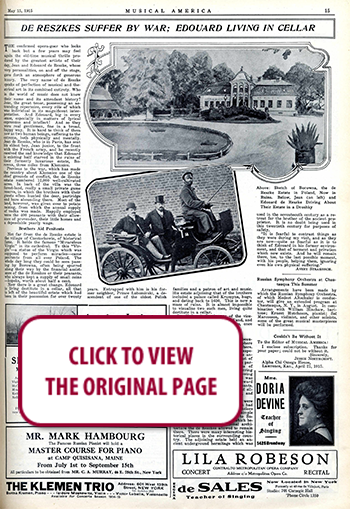 |
….The very name of de Reszke speaks of perfection of musical and theatrical art in its combined entirety.... Jean, the great tenor, possessing an astounding repertoire, every rôle of which was individual in its magnificent interpretation. And Edouard, big in every sense, especially in matters of lyrical expression and intellect! And so they were real gentlemen, fine in a broad, happy way. It is hard to think of them now as two human beings, suffering to the extreme, both physically and mentally. Jean de Reszke, who is in Paris, has sent his eldest boy, Jean junior, to the front with the French army, and he recently received the sad knowledge that Edouard is existing half-starved in the ruins of their formerly luxurious estate, Borowna, three miles from Klomnice.
|
|
15 May 1915
Page 11
ECHOES OF MUSIC ABROAD |
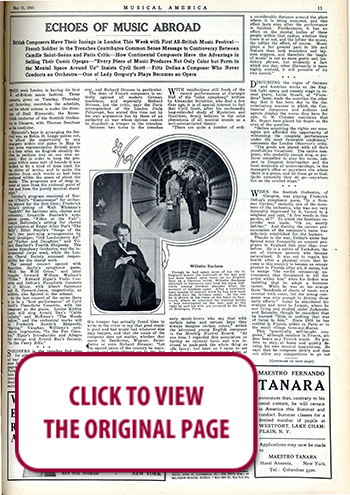 |
British Composers Have Their Innings in London This Week with First All-British Music Festival—French Soldier in the Trenches Contributes Common Sense Message to Controversy Between Camille Saint-Saëns and Paris Critic—How Continental Composers Have the Advantage in Selling Their Comic Operas—“Every Piece of Music Produces Not Only Color but Form in the Mental Space Around Us” Insists Cyril Scott—Fritz Delius a Composer Who Never Conducts an Orchestra—One of Lady Gregory’s Plays Becomes an Opera
|
|
8 May 1915
Page 41
MUSIC SETTLEMENT LOSES SERVICES OF ITS DIRECTOR, DAVID MANNES |
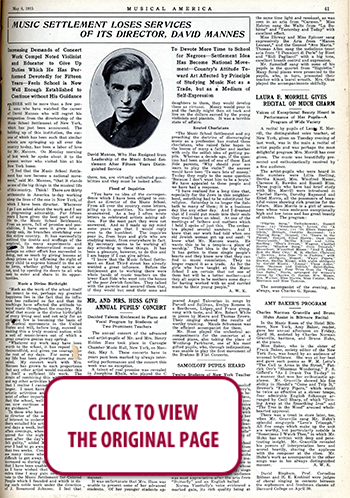 |
Increasing Demands of Concert Work Compel Noted Violinist and Educator to Give Up Duties Which He Has Performed Devotedly for Fifteen Years—Feels School is Now Well Enough Established to Continue without His Guidance— To Devote More Time to School for Negroes—Settlement Idea Has Become National Movement—Country’s Attitude Toward Art Affected by Principle of Studying Music Not as a Trade, but as a Medium of Self-Expression
|
|
8 May 1915
Page 11
ECHOES Of MUSIC ABROAD |
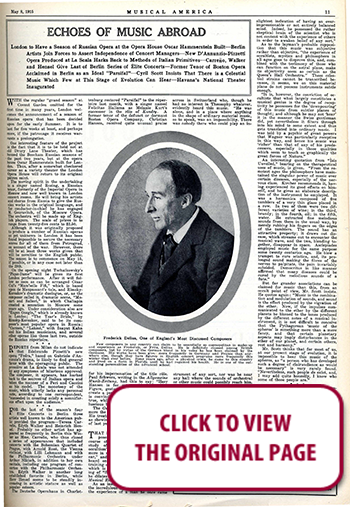 |
London to Have a Season of Russian Opera at the Opera House Oscar Hammerstein Built—Berlin Artists Join Forces to Assert Independence of Concert Managers—New D'Annunzio-Pizzetti Opera Produced at La Scala Harks Back to Methods of Italian Primitives—Carreño, Walker and Hensel Give Last of Berlin Series of Elite Concerts—Former Tenor of Boston Opera Acclaimed in Berlin as an Ideal “Parsifal”—Cyril Scott Insists That There is a Celestial Music Which Few at This Stage of Evolution Can Hear—Havana's National Theater Inaugurated
|
|
1 May 1915
Page 9
HOW JOHN POWELL OVERCAME PARENTAL OBJECTION TO ENTERING MUSICAL CAREER |
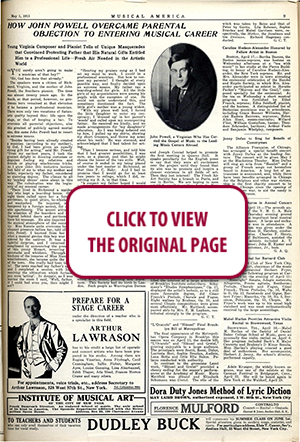 |
Young Virginia Composer and Pianist Tells of Unique Masquerades that Convinced Protesting Father that His Natural Gifts Entitled Him to a Professional Life—Fresh Air Needed in the Artistic World
|
|
24 April 1915
Page 3
FORESEES RETURN TO SIMPLICITY AS WAR’S EFFECT ON MUSIC |
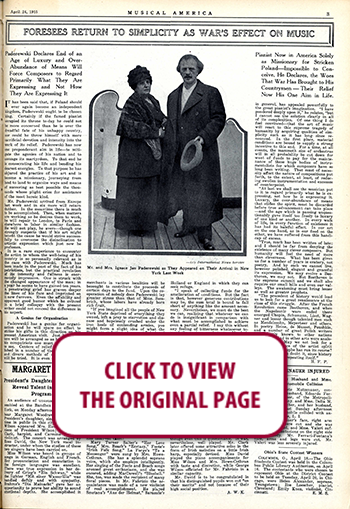 |
Paderewski Declares End of an Age of Luxury and Over-Abundance of Means Will Force Composers to Regard Primarily What They Are Expressing and Not How They Are Expressing It—Pianist Now in America Solely as Missionary for Stricken Poland—Impossible to Conceive, He Declares, the Woes That War Has Brought to His Countrymen—Their Relief Now His One Aim in Life
|
|
10 April 1915
Page 34
OUR GREAT NEED: AN AMERICAN GENIUS |
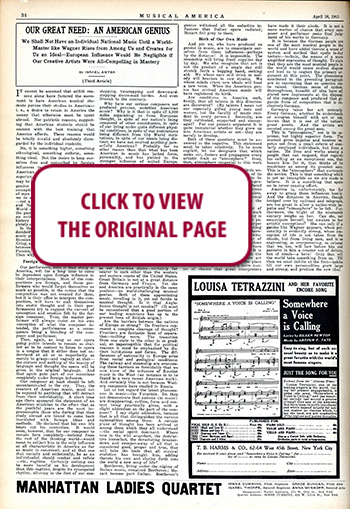 |
We Shall Not Have an Individual National Music Until a World Master like Wagner Rises from Among Us and Creates for Us an Ideal—European Influence Would Be Negligible if Our Creative Artists Were All—Compelling in Mastery
|
|
20 March 1915
Page 9
MAN WHO KNEW BEETHOVEN STILL LIVING, NEAR PARIS |
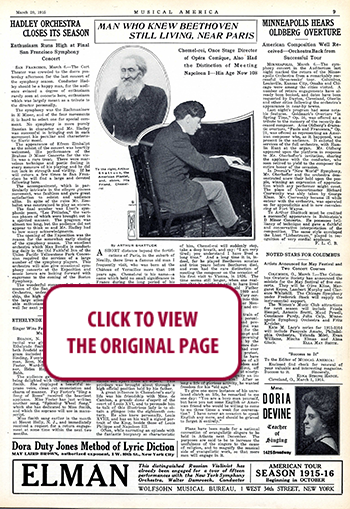 |
Chemel-roi, Once Stage Director of Opéra Comique, Also Had the Distinction of Meeting Napoleon!—His Age Now 108
|
|
27 February 1915
Page 17
SECRET OF MCCORMACK’S HOLD ON HIS AUDIENCES |
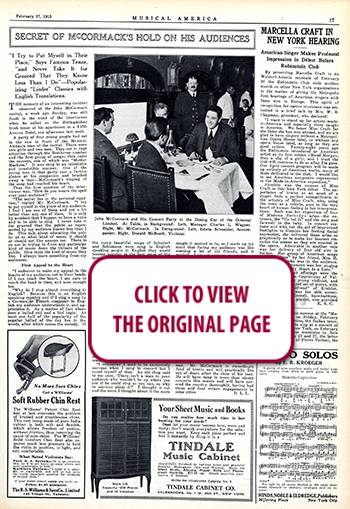 |
“I Try to Put Myself in Their Place,” Says Famous Tenor, “and Never Take It for Granted That They Know Less Than I Do”—Popularizing “Lieder” Classics with English Translations
|
|
6 February 1915
Page 15
RICHARD STRAUSS WRITING ANOTHER OPERA |
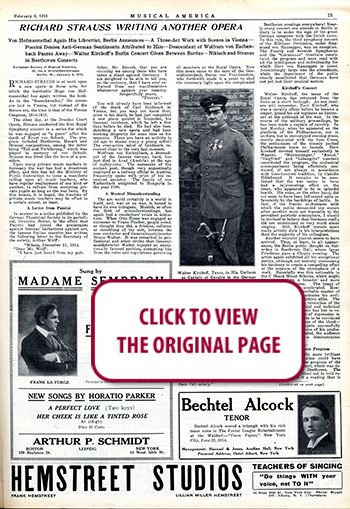 |
Von Hofmannsthal Again His Librettist, Berlin Announces—A Three-Act Work with Scenes in Vienna—Puccini Denies Anti-German Sentiments Attributed to Him—Descendant of Wolfram von Eschenbach Passes Away—Walter Kirchoff's Berlin Concert Given Between Battles—Nikisch and Strauss in Beethoven Concerts
|
|
30 January 1915
Page 35
FIRST OF AMERICAN PIANISTS TO GAIN RECOGNITION ABROAD |
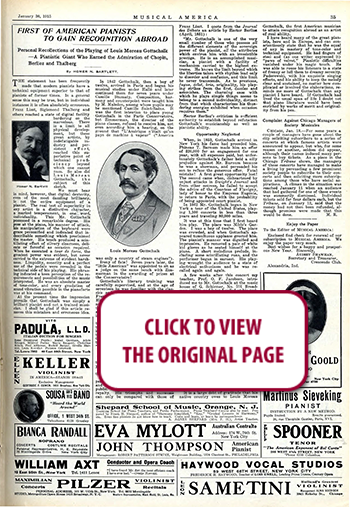 |
Personal Recollections of the Playing of Louis Moreau Gottschalk—A Pianistic Giant Who Earned the Admiration of Chopin, Berlioz and Thalberg
|
|
23 January 1915
Page 9
A MUSICAL COSMOPOLITE AS PRISONER OF WAR |
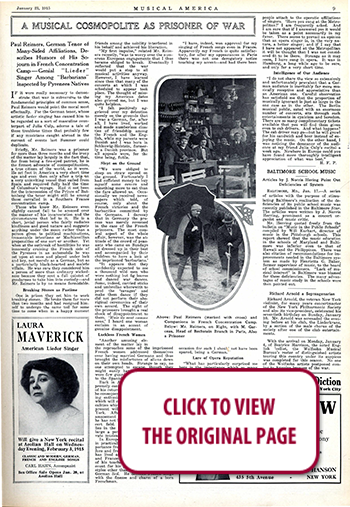 |
Paul Reimers, German Tenor of Many-Sided Affiliations, Describes Humors of His Sojourn in French Concentration Camp—Genial “Lieder” Singer Among “Barbarians” Inspected by Pyrenees Natives
|
|
23 January 1915
Page 5
WILLIAM JENNINGS BRYAN FROM A MUSICIAN’S STANDPOINT |
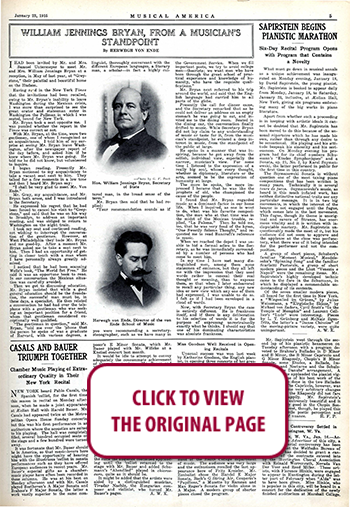 |
I HAD been invited by Mr. and Mrs. Samuel Untermeyer to meet Mr. and Mrs. William Jennings Bryan at a reception, in May of last year, at “Greystone,” their palatial and beautiful home on the Hudson.
Having read in the New York Times that the invitations had been recalled, owing to Mr. Bryan’s inability to leave Washington during the Mexican crisis, I was more than surprised to see the great orator and statesman enter in Washington the Pullman in which I was seated, bound for New York.
|
|
26 December 1914
Page 19
SCHÖNBERG AROUSES LAUGHTER IN BOSTON |
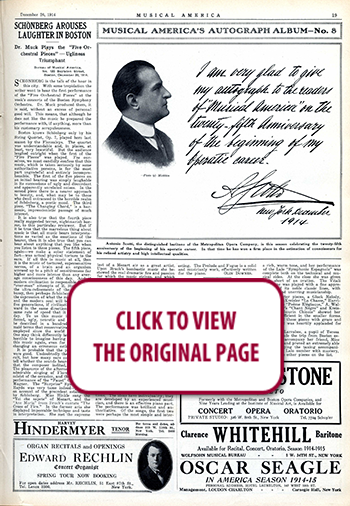 |
Dr. Muck Plays the “Five Orchestral Pieces”—Ugliness Triumphant
SCHÖNBERG is the talk of the hour in this city. With some trepidation the writer went to hear the first performance of the “Five Orchestral Pieces” at the week’s concerts of the Boston Symphony Orchestra. Dr. Muck produced them, it is said, without an excess of personal good will. This means, that although he does not like the music he prepared the performance with, if anything, more than his customary scrupulousness.
|
|
26 December 1914
Page 9
STATUS OF THE ‘CELLO AS A SOLO INSTRUMENT |
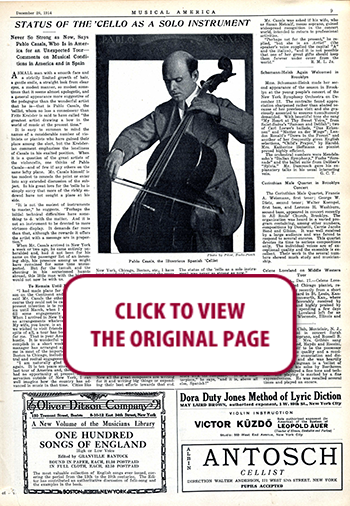 |
Never So Strong as Now, Says Pablo Casals, Who Is in America for an Unexpected Tour—Comments on Musical Conditions in America and in Spain
|
|
19 December 1914
Page 5
Art of Accompanying as Viewed by Master Exponent |
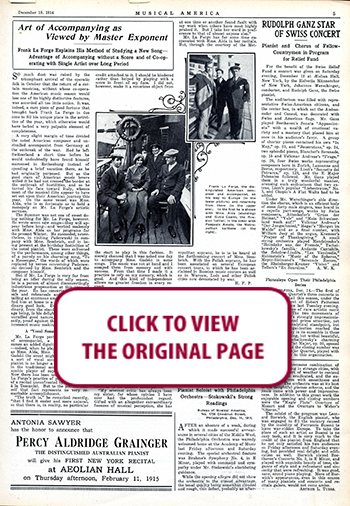 |
Frank La Forge Explains His Method of Studying a New Song—Advantage of Accompanying without a Score and of Co-operating with Single Artist over Long Period
|
|
12 December 1914
Page 29
WILL THERE EVER BE A REAL AMERICAN MUSIC? |
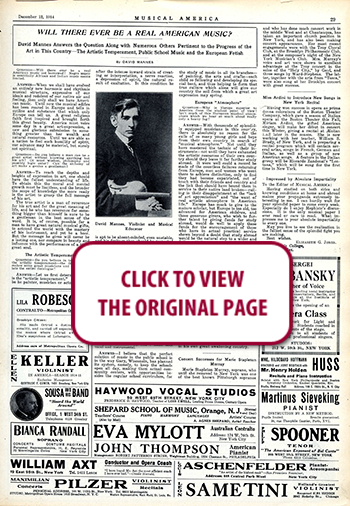 |
David Mannes Answers the Question Along with Numerous Others Pertinent to the Progress of the Art in This Country—The Artistic Temperament, Public School Music and the European Fetish
|
|
5 December 1914
Page 3
MUSICIAN MUST BE FINAL PEACE MISSIONARY SAYS KREISLER |
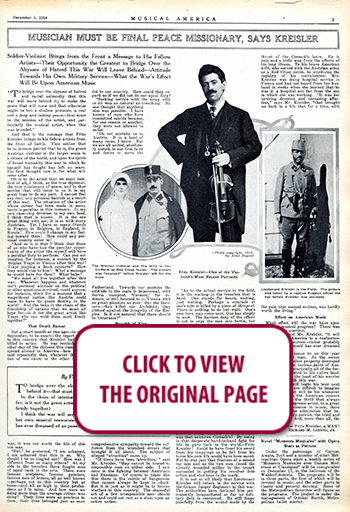 |
Soldier-Violinist Brings from the Front a Message to His Fellow Artists—Their Opportunity the Greatest to Bridge Over the Abysses of Hatred This War Will Leave Behind—Attitude Towards His Own Military Service—What the War’s Effect Will Be Upon American Music
|
|
14 November 1914
Page 9
WATTEAU, VERLAINE, DEBUSSY: A STUDY IN ARTISTIC REACTIONS |
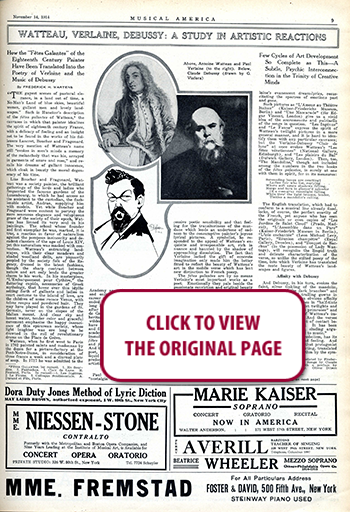 |
How the “Fêtes Galantes” of the Eighteenth Century Painter Have Been Translated Into the Poetry of Verlaine and the Music of Debussy
|
|
7 November 1914
Page 17
Some Famous Violins Owned in the U. S. A |
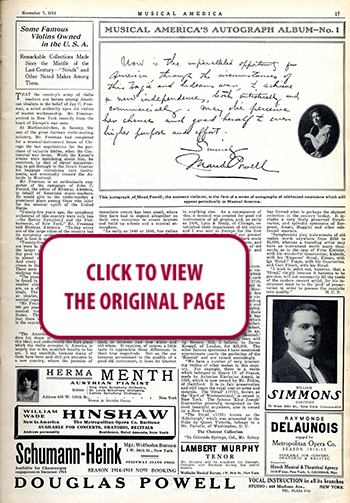 |
Remarkable Collections Made Since the Middle of the Last Century—“Strads” and Other Noted Makes Among Them
“Twenty-five years ago violin instructors were to be found in only a few of the larger cities of the country. Today good violin instruction may be had in almost every part of the country. And every year witnesses a large increase in the number of violin students. There seem to be from 10,000 to 20,000 studying the violin.
|
|
7 November 1914
Page 13
Panama Canal Makes American Place for Music Study of Australasians |
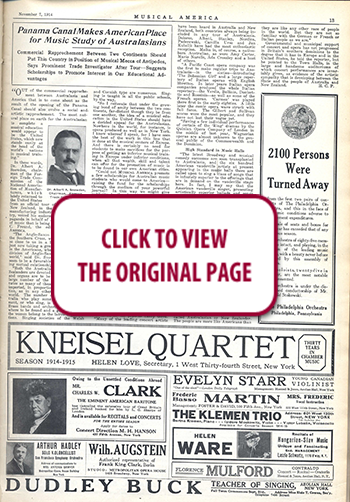 |
Commercial Rapprochement Between Two Continents Should Put This Country in Position of Musical Mecca of Antipodes, Says Prominent Trade Investigator After Tour—Suggests Scholarships to Promote Interest in Our Educational Advantages
|
|
17 October 1914
Page 7
AMERICAN WOMAN WHOSE MUSICAL MESSAGE THRILLED GERMANY |
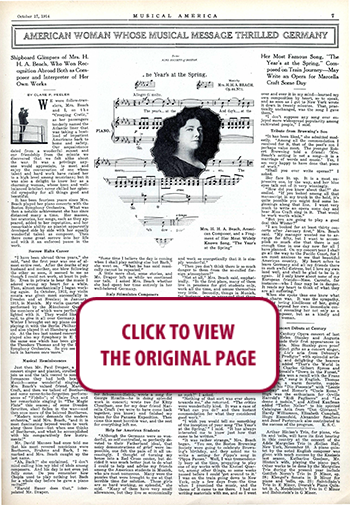 |
Shipboard Glimpses of Mrs. H. H. A. Beach, Who Won Recognition Abroad Both as Composer and Interpreter of Her Own Works
WE were fellow-travelers, Mrs. Beach and I, on the “Creeping Cretic,” as her passengers tenderly named the Atlantic liner that was taking a boatload of impatient Americans back to home and safety. Our acquaintance dated from a wonderful sunset and our friendship from the minute we discovered that we felt alike about the war. It was a privilege anyone would appreciate, to meet and enjoy the conversation of one whose talent and hard work have raised her to a high level among musicians; but it was also a delight to know her as a charming woman, whose keen and well-balanced intellect never chilled her splendid sympathy for all things good and beautiful.
|
|
17 October 1914
Page 4
SEES DAWN OF NEW MUSIC ERA IN EUROPEAN CHAOS |
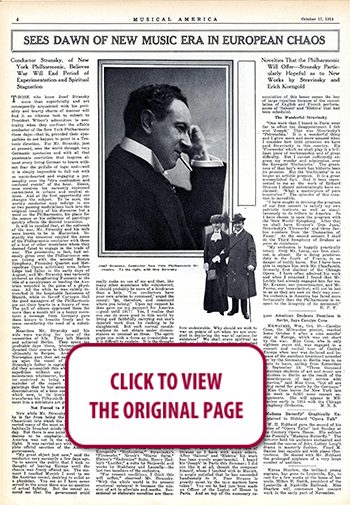 |
Conductor Stransky, of New York Philharmonic, Believes War Will End Period of Experimentation and Spiritual Stagnation—Novelties That the Philharmonic Will Offer—Stransky Particularly Hopeful as to New Works by Stravinsky and Erich Korngold
|
|
10 October 1914
Page 10
An American Musician in Munich During the Great War |
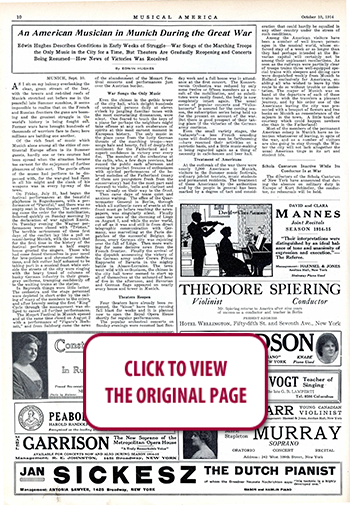 |
Edwin Hughes Describes Conditions in Early Weeks of Struggle—War Songs of the Marching Troops the Only Music in the City for a Time, But Theaters Are Gradually Reopening and Concerts Being Resumed—How News of Victories Was Received
|
|
10 October 1914
Page 3
WITH FRITZ KREISLER AT THE FRONT |
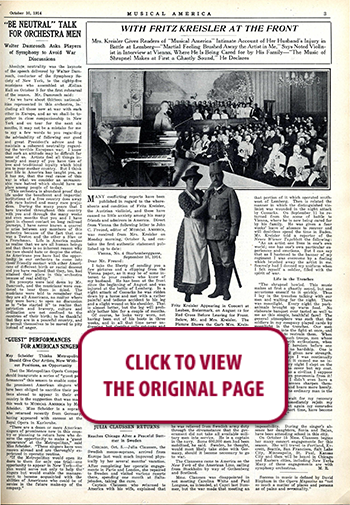 |
Mrs. Kreisler Gives Readers of “Musical America” Intimate Account of Her Husband’ s Injury in Battle at Lemberg—“Martial Feeling Brushed Away the Artist in Me,” Says Noted Violinist in Interview at Vienna, Where He Is Being Cared for by His Family—“The Music of Shrapnel Makes at First a Ghastly Sound,” He Declares
|
|
3 October 1914
Page 1
DEDICATE HOME BUILT FOR RETIRED MUSIC TEACHERS |
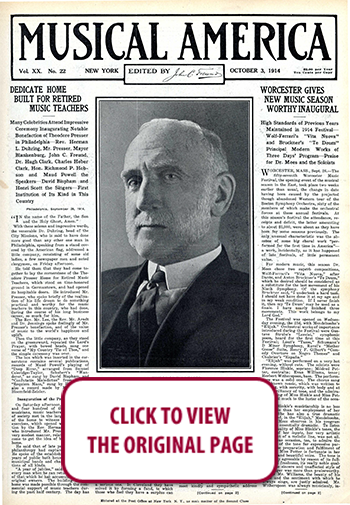 |
Many Celebrities Attend Impressive Ceremony Inaugurating Notable Benefaction of Theodore Presser in· Philadelphia—Rev. Herman L. Duhring, Mr. Presser, Mayor Blankenburg, John C. Freund, Dr. Hugh Clark, Charles Heber Clark, Hon. Richmond P. Hobson and Maud Powell the Speakers—David Bispham and Henri Scott the Singers—First Institution of Its Kind in This Country
|
|
26 September 1914
Page 21
MUSICAL ASPIRANTS AS THE CONCERT DIRECTOR SEES THEM |
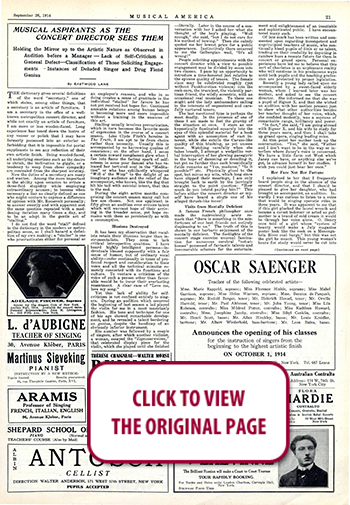 |
Holding the Mirror up to the Artistic Nature as Observed in Audition before a Manager—Lack of Self-Criticism a General Defect—Classification of Those Soliciting Engagements—Instances of Deluded Singer and Drug Fiend Genius
|
|
26 September 1914
Page 11
VITAL POINTS IN PIANO PLAYING |
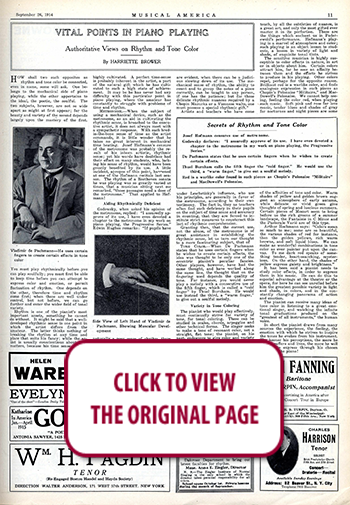 |
HOW shall two such opposites as rhythm and tone color be connected, even in name, some will ask. One belongs to the mechanical side of piano playing, while the other appertains to the ideal, the poetic, the soulful. The two subjects, however, are not so wide apart as might at first appear; for the beauty and variety of the second depends largely upon the mastery of the first. You must play rhythmically before you can play soulfully; you must first be able to keep time before you can attempt to express color and emotion, or permit fluctuation of rhythm. One depends on the other, therefore time and rhythm come first; when these are well under control, but not before, we can go further and enter the wider field of tonal variety.
|
|
26 September 1914
Page 3
UPON ITALY’S ACTION DEPENDS SEASON AT THE METROPOLITAN |
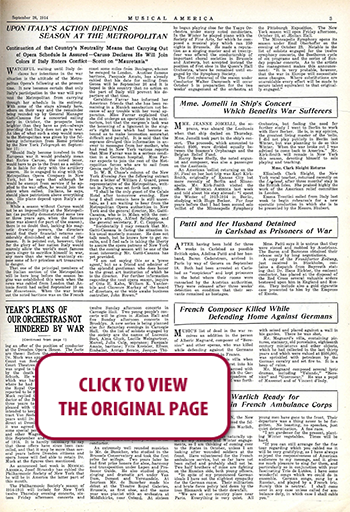 |
Continuation of that Country’s Neutrality Means that Carrying Out of Opera Schedule Is Assured—Caruso Declares He Will Join Colors if Italy Enters Conflict—Scotti on “Mauretania”
|
|
19 September 1914
Page 1
A NEW ARTISTIC STANDARD AT THE CENTURY OPERA |
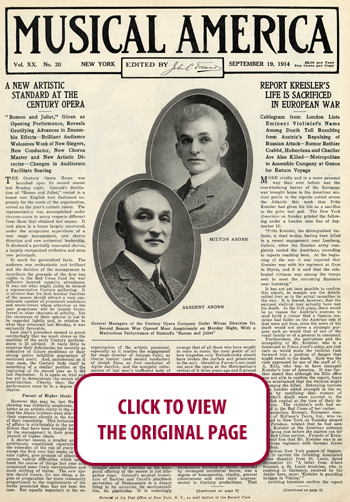 |
“Romeo and Juliet,” Given as Opening Performance, Reveals Gratifying Advances in Ensemble Effects—Brilliant Audience Welcomes Work of New Singers, New Conductor, New Chorus Master and New Artistic Director—Changes in Auditorium Facilitate Seating
|
|
12 September 1914
Page 4
THE UPHEAVAL IN EUROPE |
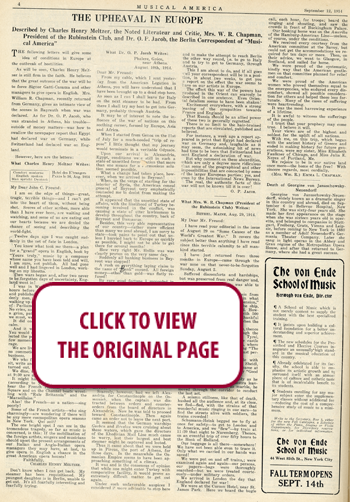 |
Described by Charles Henry Meltzer, the Noted Literateur and Critic, Mrs. W. R. Chapman, President of the Rubinstein Club, and Dr. O. P. Jacob, the Berlin Correspondent of “Musical America”
|
|
5 September 1914
Page 21
Scenes Attending the Outbreak of Hostilities Abroad As Viewed by an American Pianist |
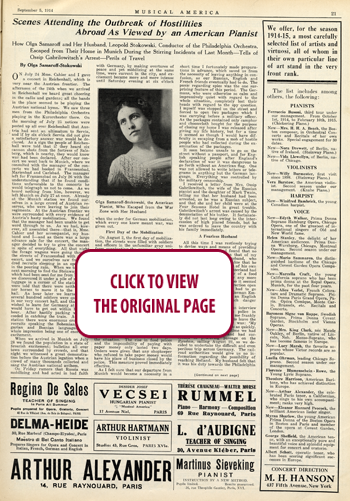 |
How Olga Samaroff and Her Husband, Leopold Stokowski, Conductor of the Philadelphia Orchestra, Escaped from Their Home in Munich During the Stirring Incidents of Last Month—Tells of Ossip Gabrilowitsch’s Arrest—Perils of Travel By Olga Samaroff-Stokowski
|
|
22 August 1914
Page 25
ENGLISH MUSICAL ACTIVITIES NOT YET ABANDONED
|
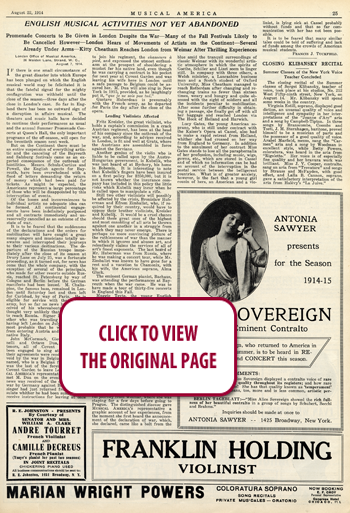 |
Promenade Concerts to Be Given in London Despite the War—Many of the Fall Festivals Likely to Be Cancelled However—London Hears of Movements of Artists on the Continent—Several Already Under Arms—Kitty Cheatham Reaches London from Weimar After Thrilling Experiences
|
|
22 August 1914
Page 1
LOCAL MANAGERS THROUGHOUT COUNTRY OPTIMISTIC OVER MUSICAL OUTLOOK
|
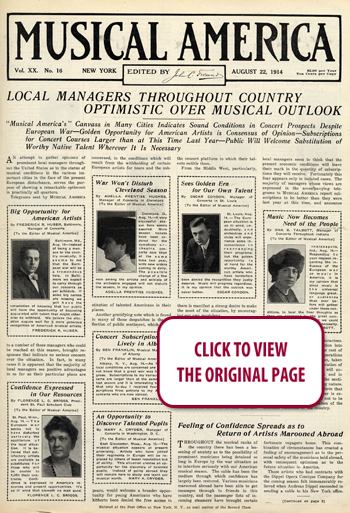 |
Cities for “Musical America’s” Canvass In Many European War—Golden Opportunity for American Artists is Consensus of Opinion−Subscriptions Concert Courses Larger than at This Time Last Year—Public Will Welcome Substitution of Worthy Native Talent Wherever It Is Necessary
|
|
15 August 1914
Page 9
ECHOES OF MUSIC ABROAD
|
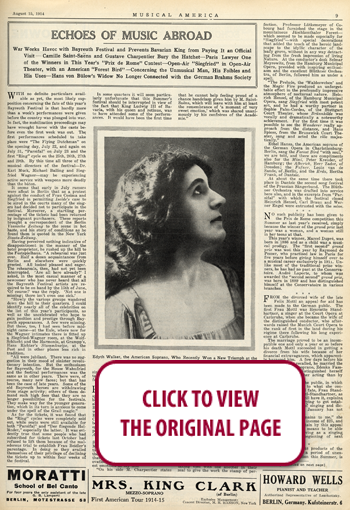 |
War Works Havoc with Bayreuth Festival and Prevents Bavarian King from Paying It an Official Visit—Camille Saint-Saëns and Gustave Charpentier Bury the Hatchet—Paris Lawyer One of the Winners in This Year’s “Prix de Rome” Contest—Open-Air “Siegfried” in Open-Air Theater, with an American “Forest Bird”—Concerning the Unmusical Man, His Foibles and His Uses—Hans von Bűlow’s Widow No Longer Connected with the German Brahms Society
|
|
8 August 1914
Page 1
EUROPEAN MUSICAL LIFE PARALYZED BY WAR; PROMINENT ARTISTS INVOLVED IN CONFLICT
|
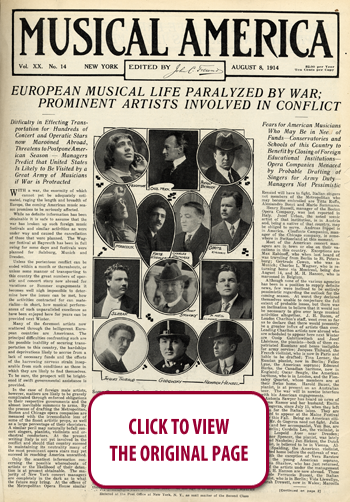 |
Difficulty in Effecting Transportation for Hundreds of Concert and Operatic Stars now Marooned Abroad, Threatens to Postpone American Season—Managers Predict that United States Is Likely to Be Visited by a Great Army of Musicians if War is Protracted—Fears for American Musicians Who May Be in Need of Funds—Conservatories and Schools of this Country to Benefit by Closing of Foreign Educational Institutions—Opera Companies, Menaced by Probable Drafting of Singers for Army Duty—Managers Not Pessimistic
|
|
1 August 1914
Page 11
BERLIN NO LONGER SUPREME COURT OF MUSICAL WISDOM
|
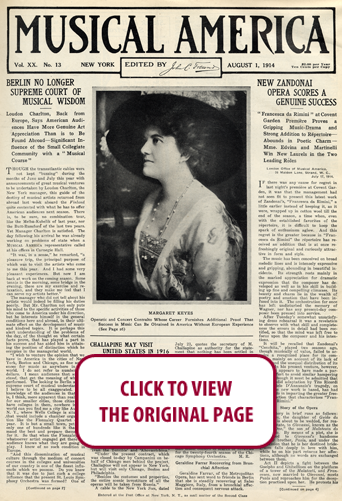 |
Loudon Charlton, Back from Europe, Says American Audiences Have More Genuine Art Appreciation Than is to Be Found Abroad—Significant Influence of the Small Collegiate Community with a “Musical Course”
NEW ZANDONAI OPERA SCORES A GENUINE SUCCESS
“Francesca da Rimini” at Covent Garden Premiere Proves a Gripping Music-Drama and Strong Addition to Repertoire—Abounds in Poetic Charm—Mme. Edvina and Martinelli Win New Laurels in the Two Leading Roles
|
|
25 July 1914
Page 11
ECHOES OF MUSIC ABROAD |
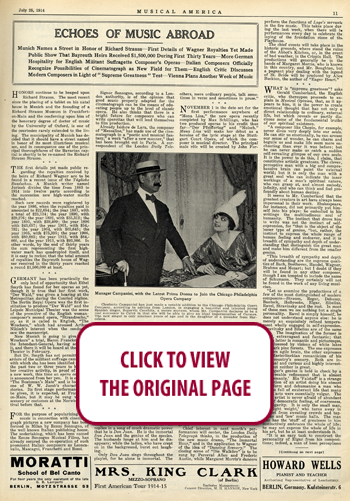 |
Munich Names a Street in Honor of Richard Strauss—First Details of Wagner Royalties Yet Made Public Show That Bayreuth Heirs Received $1,500,000 During First Thirty Years—More German Hospitality for English Militant Suffragette Composer’s Operas—Italian Composers Officially Recognize Possibilities of Cinematograph as New Field for Them—English Critic Discusses Modem Composers in Light of “Supreme Greatness” Test—Vienna Plans Another Week of Music
|
|
18 July 1914
Page 3
WOMAN AS A CREATIVE FORCE IN MUSIC |
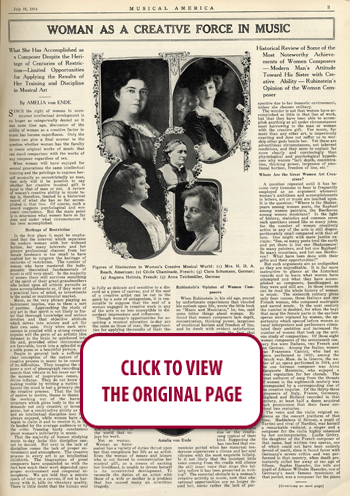 |
What She Has Accomplished as a Composer Despite the Heritage of Centuries of Restriction—Limited Opportunities for Applying the Results of Her Training and Discipline In Musical Art
|
|
20 June 1914
Page 3
MOTION PICTURES FERTILE FlELD FOR COMPOSERS
|
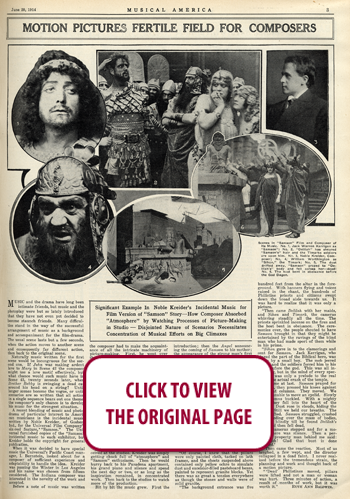 |
MUSIC and the drama have long been intimate friends, but music and the photoplay were but so lately introduced that they have not even yet decided to become staunch friends. Many difficulties stand in the way of the successful arrangement of music as a background and accompaniment for the film-drama. The usual scene lasts but a few seconds, when the action moves to another scene and consequently far different action, then back to the original scene.
|
|
9 May 1914
Page 11
THE DEAD HAND IN AMERICAN PROGRESS
|
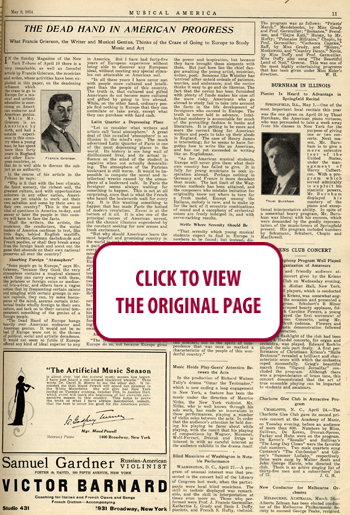 |
What Francis Grierson, the Writer and Musical Genius, Thinks of the Craze of Going to Europe to Study Music and Art
|
|
11 April 1914
Page 11
NO SHORT CUTS TO ART SAYS JOSEF ADAMOWSKI
|
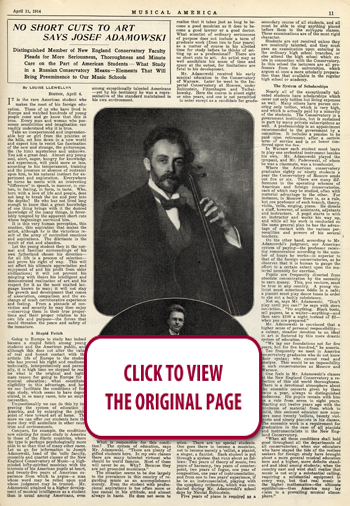 |
Distinguished Member of New England Conservatory Faculty Pleads for More Seriousness, Thoroughness and Minute Care on the Part of American Students—What Study in a Russian Conservatory Means—Elements That Will Bring Preeminence to Our Music Schools
|
|
11 April 1914
Page 3
COLLECTING AMERICAN VERSIONS OF OLD WORLD FOLK SONGS
|
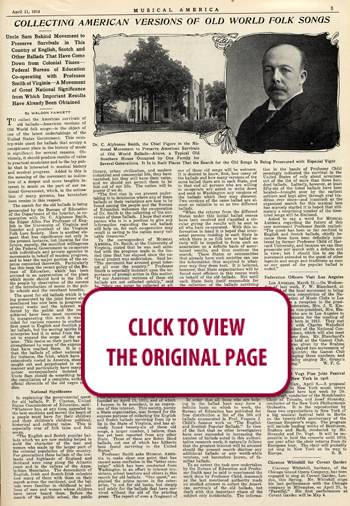 |
Uncle Sam Behind Movement to Preserve Survivals in This Country of English, Scotch and Other Ballads That Have Come Down from Colonial Times—Federal Bureau of Education Co-operating with Professor Smith of Virginia—A Movement of Great National Significance from Which Important Results Have Already Been Obtained
|
|
11 April 1914
Page 1
HOW GERMANS HERE HAVE AIDED MUSIC; OPERA HOUSE OF ITS OWN FOR ST. LOUIS; “DARLING OF GODS” FOR PUCCINI OPERA
|
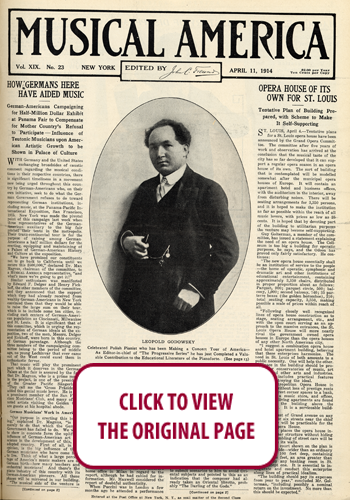 |
German-Americans Campaigning for Half-Million Dollar Exhibit at Panama Fair to Compensate for Mother Country’s Refusal to Participate—Influence of Teutonic Musicians upon American Artistic Growth to be Shown in Palace of Culture
|
|
4 April 1914
Page 15
Novel Device for Wind Instruments Promises Added Possibilities for Orchestral Composition |
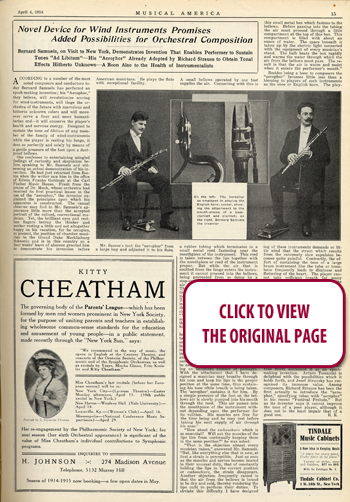 |
Bernard Samuels, on Visit to New York, Demonstrates Invention That Enables Performer to Sustain Tones “Ad Libitum”—His “Aerorhor” Already Adopted by Richard Strauss to Obtain Tonal Effects Hitherto Unknown—A Boon Also to the Health of Instrumentalists
|
|
4 April 1914
Page 5
HOW A TYPICAL AMERICAN GIRL FITS INTO ENVIRONMENT OF GRAND OPERA |
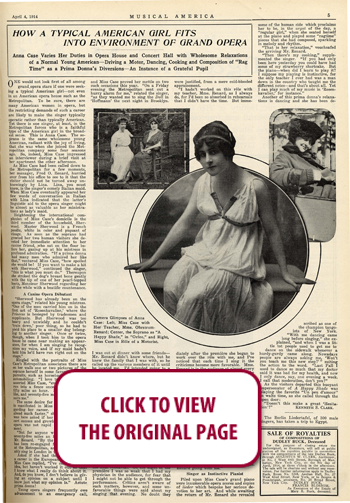 |
Anna Case Varies Her Duties in Opera House and Concert Hall with Wholesome Relaxations of a Normal Young American—Driving a Motor, Dancing, Cooking and Composition of “Rag Time” as a Prima Donna’s Diversions—An Instance of a Grateful Pupil
|
|
28 March 1914
Page 5
DANCE CRAZE OFFERS INVITING FIELD FOR AMERICAN COMPOSER |
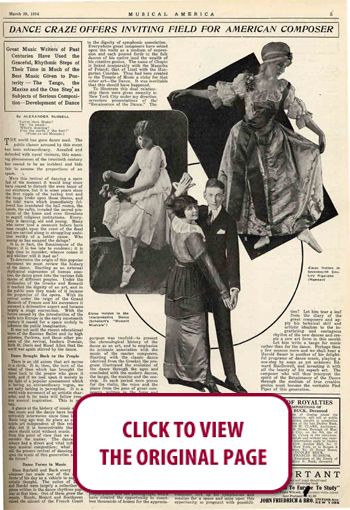 |
Great Music Writers of Past Centuries Have Used the Graceful, Rhythmic Steps of Their Time in Much of the Best Music Given to Posterity—The Tango, the Maxixe and the One Step as Subjects of Serious Composition—Development of Dance
|
|
28 March 1914
Page 3
AMERICA’S FREEDOM AND OPTIMISM BOUND TO PRODUCE A GREAT MUSICAL ART, DECLARES FELIX WEINGARTNER |
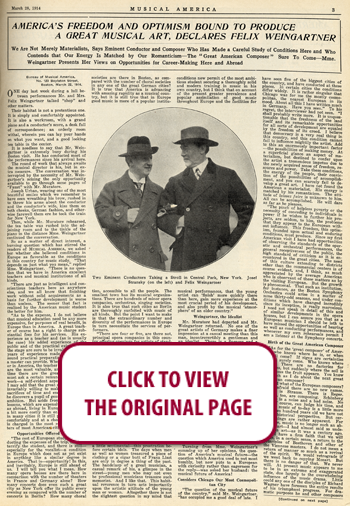 |
We Are Not Merely Materialists, Says Eminent Conductor and Composer Who Has Made a Careful Study of Conditions Here and Who Contends that Our Energy Is Matched by Our Romanticism—The “Great American Composer” Sure To Come—Mme. Weingartner Presents Her Views on Opportunities for Career-Making Here and Abroad
|
|
28 February 1914
Page 1
ELABORATE SETTING FOR CHARPENTIER’S NEW OPERA ‘JULIEN’ |
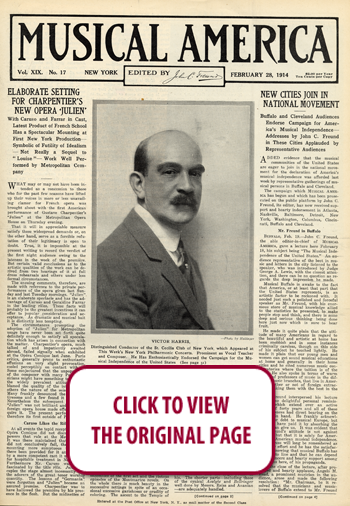 |
With Caruso and Farrar in Cast, Latest Product of French School Has a Spectacular Mounting at First New York Production—Symbolic of Futility of Idealism—Not Really a Sequel to “Louise” —Work Well Performed by Metropolitan Company
|
|
14 February 1914
Page 33
LONDON BAFFLED BY SCHONBERG’S ORCHESTRAL PIECES |
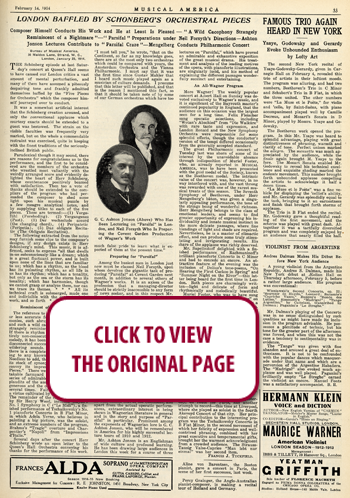 |
Composer Himself Conducts His Work and He at Least Is Pleased—“A Wild Cacophony Strangely Reminiscent of a Nightmare”—“Parsifal” Preparations under Neil Forsyth’s Directions—Ashton Jonson Lectures Contribute to “Parsifal Craze”—Mengelberg Conducts Philharmonic Concert
|
|
14 February 1914
Page 13
MUSIC OF SIBELIUS IN AMERICA |
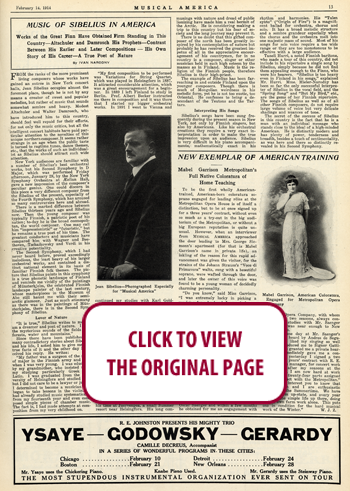 |
Works of the Great Finn Have Obtained Firm Standing in This Country—Altschuler and Damrosch His Prophets—Contrast Between His Earlier and Later Compositions—His Own Story of His Career—A True Poet of Nature
|
|
7 February 1914
Page 47
“BRAVOS” FOR BUSONI IN PARIS |
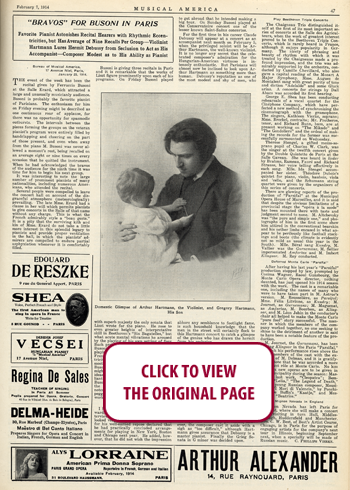 |
Favorite Pianist Astonishes Recital Hearers with Rhythmic Eccentricities, but Has Average of Nine Recalls—Per Group—Violinist Hartmann Lures Hermit Debussy from Seclusion to Act as His Accompanist—Composer Modest as to His Ability as Pianist
|
|
7 February 1914
Page 9
BELIEVES “TRISTAN” CAN BE SUNG BETTER IN ITALIAN THAN GERMAN |
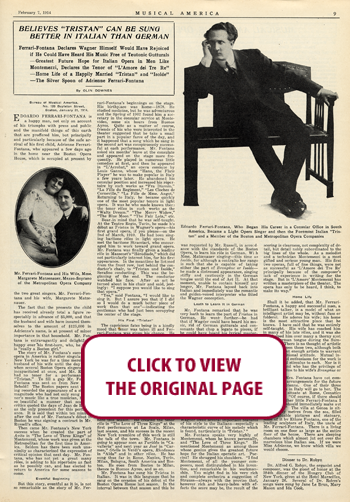 |
Ferrari-Fontana Declares Wagner Himself Would Have Rejoiced if He Could Have Heard His Music Free of Teutonic Gutturals—Greatest Future Hope for Italian Opera in Men Like Montemezzi, Declares the Tenor of “L’Amore dei Tre Re” —Home Life of a Happily Married “Tristan” and “Isolde”—The Silver Spoon of Adrienne Ferrari-Fontana
|
|
31 January 1914
Page 5
NOTED DUTCH PIANIST UNVEILS SECRETS OF TONE PRODUCTION |
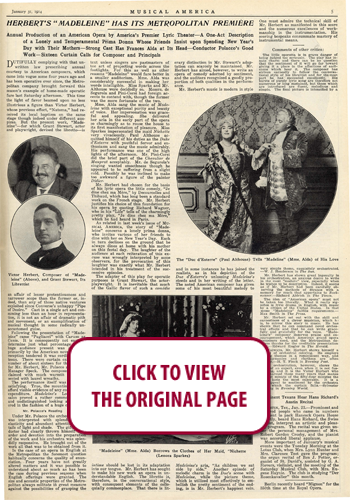 |
Annual Production of an American Opera by America’s Premier Lyric Theater—A One-Act Description of a Lonely and Temperamental Prima Donna Whose Friends Insist upon Spending New Year’s Day with Their Mothers—Strong Cast Has Frances AIda at Its Head—Conductor Polacco’s Good Work—Sixteen Curtain Calls for Composer and Principals
|
|
24 January 1914
Page 35
NOTED DUTCH PIANIST UNVEILS SECRETS OF TONE PRODUCTION |
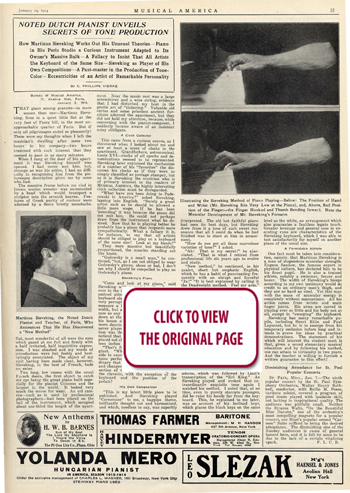 |
How Martinus Sieveking Works Out His Unusual Theories—Piano in His Paris Studio a Curious Instrument Adapted to Its Owner’s Massive Bulk—A Fallacy to Insist That All Artists Use Keyboard of the Same Size-—Sieveking as Player of His Own Compositions—A Past-master in the Production of Tone Color—Eccentricities of an Artist of Remarkable Personality
|
|
24 January 1914
Page 15
OF FUTURIST MUSIC AND DANCING |
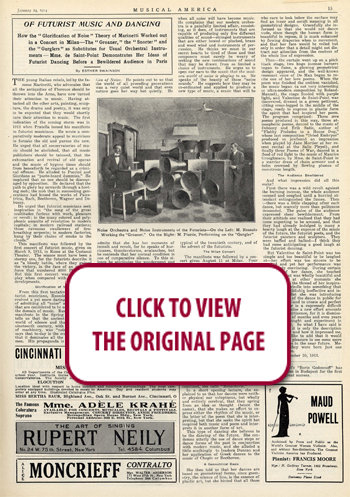 |
How the “Glorification of Noise” Theory of Marinetti Worked out in a Concert in Milan—The “Groaner,” the “Snorter” and the “Gurglers” as Substitutes for Usual Orchestral Instruments—Mme. de Saint-Point Demonstrates Her Ideas of Futurist Dancing Before a Bewildered Audience in Paris
|
|
24 January 1914
Page 5
EMOTIONAL JOURNALISTS BESIEGE MME. OBER AS EXPERT IN SUBTLE ART OF LOVE-MAKING |
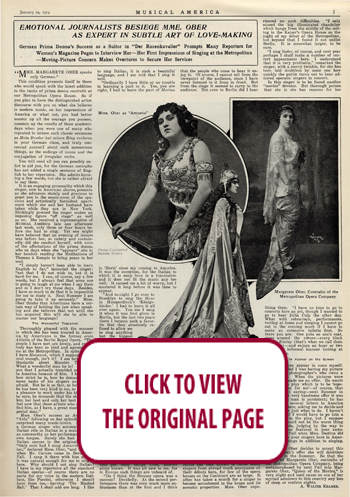 |
German Prima Donna’s Success as a Suitor in “Der Rosenkavalier” Prompts Many Reporters for Women’s Magazine Pages to Interview Her--Her First Impressions of Singing at the Metropolitan--Moving-Picture Concern Makes Overtures to Secure Her Services
|
|
17 January 1914
Page 9
AMERICANS TOO EASILY TRICKED BY FOREIGN NAMES IN MUSIC |
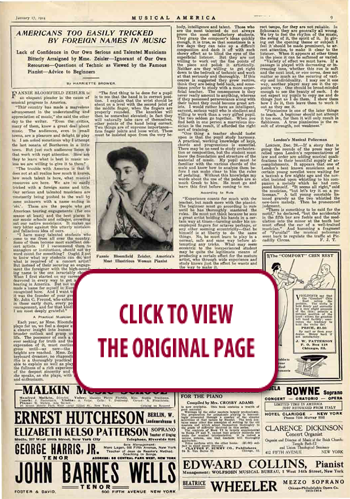 |
Lack of Confidence in Our Own Serious and Talented Musicians Bitterly Arraigned by Mme. Zeisler—Ignorant of Our Own Resources—Questions of Technic as Viewed by the Famous Pianist—Advice to Beginners
|
|
10 January 1914
Page 3
SUCCESS UNEQUIVOCAL CROWNS “L’AMORE DEI TRE RE” IN ITS FIRST AMERICAN PERFORMANCE |
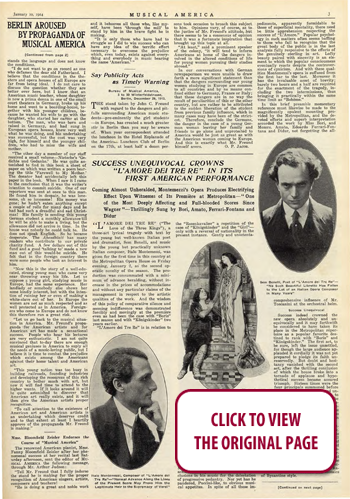 |
Coming Almost Unheralded, Montemezzi’s Opera Produces Electrifying Effect Upon Witnesses of Its Premiere at Metropolitan—“One of the Most Deeply Affecting and Full-blooded Scores Since Wagner”—Thrillingly Sung by Bori, Amato, Ferrari-Fontana and Didur
|
|
3 January 1914
Page 5
HAS AMERICA GROWN MUSICALLY? ASK THIBAUD |
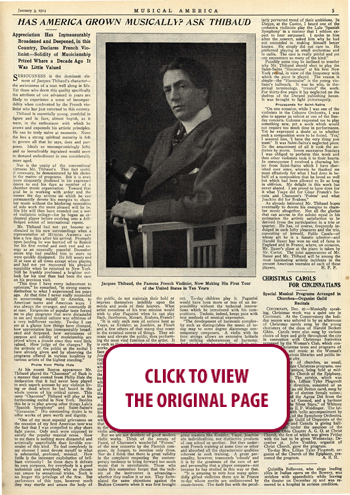 |
Appreciation Has Immeasurably Broadened and Deepened, in this Country, Declares French Violinist—Solidity of Musicianship Prized Where a Decade Ago It Was Little Valued
|
|
20 December 1913
Page 5
WILL SCHÖNBERG BE A NEW YORK FAD? |
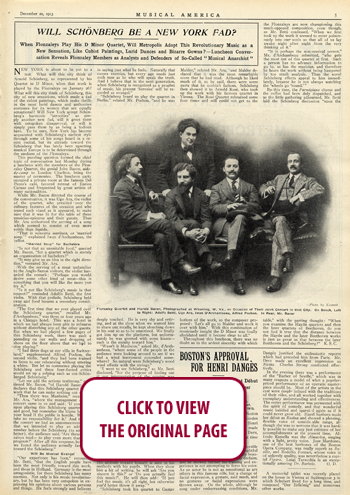 |
When Flonzaleys Play His D Minor Quartet, Will Metropolis Adopt This Revolutionary Music as a New Sensation, Like Cubist Paintings, Lurid Dances and Bizarre Gowns ?—Luncheon Conversation Reveals Flonzaley Members as Analysts and Defenders of So-Called “Musical Anarchist”
|
|
20 December 1913
Page 3
COMPOSERS “IN ADVANCE OF THEIR TIME” FIND STAUNCH DEFENDER IN VON ZADORA |
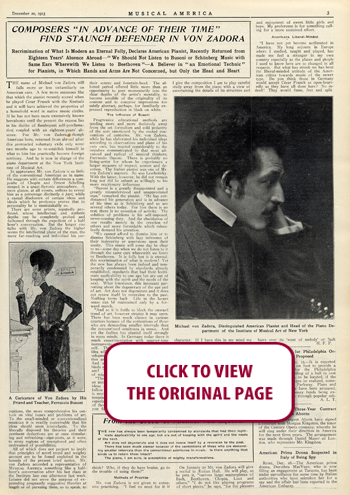 |
Recrimination of What Is Modern an Eternal Folly, Declares American Pianist, Recently Returned from Eighteen Years’ Absence Abroad—“We Should Not Listen to Busoni or Schönberg Music with Same Ears Wherewith We Listen to Beethoven”—A Believer in “an Emotional Technic” for Pianists, in Which Hands and Arms Are Not Concerned, but Only the Head and Heart
|
|
6 December 1913
Page 19
OLGA SAMAROFF PREPARING TO RESUME CAREER ON THE CONCERT PLATFORM |
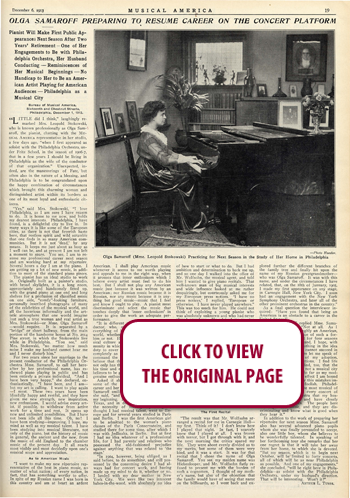 |
Pianist Will Make First Public Appearance Next Season After Two Years’ Retirement—One of Her Engagements to Be with Philadelphia Orchestra, Her Husband Conducting— Reminiscences of Her Musical Beginnings—No Handicap to Her to Be an American Artist Playing for American Audiences—Philadelphia as a Musical City
|
|
29 November 1913
Page 30
SAINT-SAËNS PLAYS HIS FAREWELL |
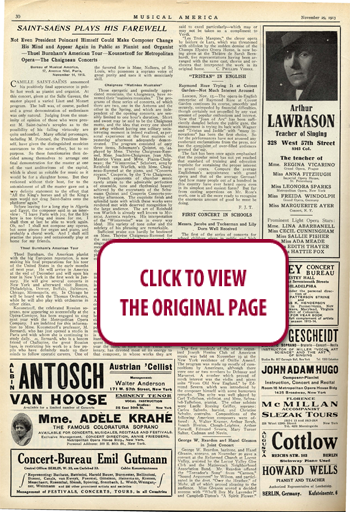 |
Not Even President Poincaré Himself Could Make Composer Change His Mind and Appear Again in Public as Pianist and Organist—Thuel Burnham’s American Tour— Kousnetzoff for Metropolitan Opera—The Chaigneau Concerts
|
|
29 November 1913
Page 4
TWO IMPORTANT DEBUTS MARK THE WEEK AT METROPOLITAN |
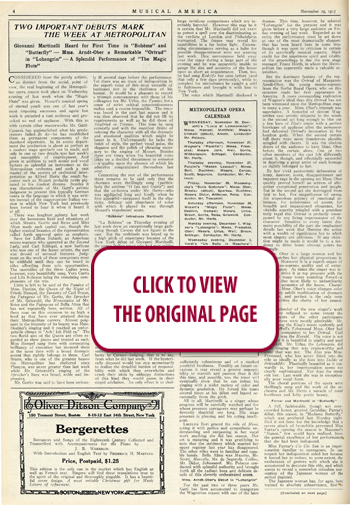 |
Giovanni Martinelli Heard for First Time in “Bohème” and “Butterfly”— Mme. Arndt-Ober a Remarkable “Ortrud” in “Lohengrin”—A Splendid Performance of “The Magic Flute”
|
|
22 November 1913
Page 11
PUCCINI’S “GIRL” A SUCCESS IN VIENNA |
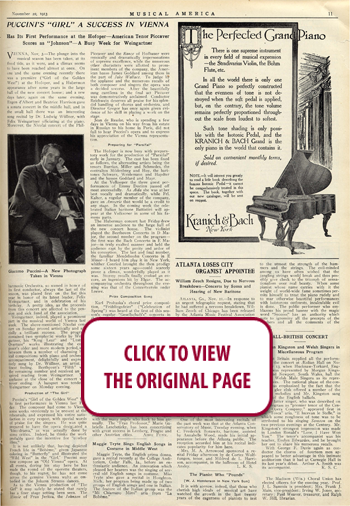 |
Has Its First Performance at the Hofoper—American Tenor Piccaver Scores as “Johnson”—A Busy Week for Weingartner
|
|
22 November 1913
Page 1
“GIOCONDA” RINGS UP THE CURTAIN AT METROPOLITAN |
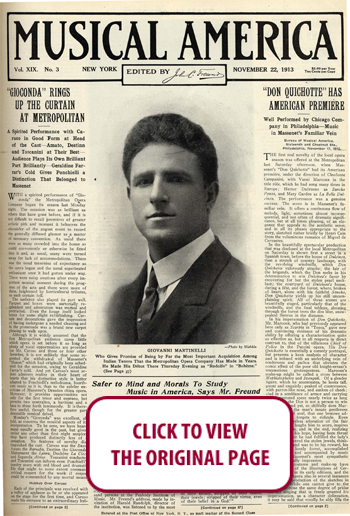 |
A Spirited Performance with Caruso in Good Form at Head of the Cast--Amato, Destinn and Toscanini at Their Best—Audience Plays Its Own Brilliant Part Brilliantly--Geraldine Farrar’s Cold Gives Ponchielli a Distinction That Belonged to Massenet
|
|
8 November 1913
Page 36
HISSES FOR SCHÖNBERG IN CHICAGO |
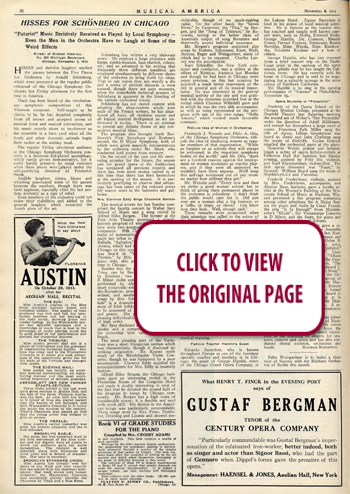 |
“Futurist” Music Derisively Received as Played by Local Symphony--Even the Men in the Orchestra Have to Laugh at Some of the Weird Effects
|
|
8 November 1913
Page 3
GERMANY WORSHIPS THE "ALMIGHTY PFENNIG" SAYS DAMROSCH |
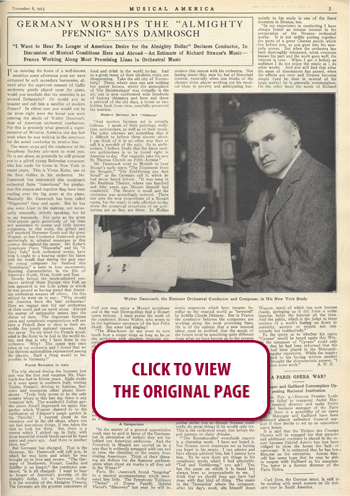 |
“I Want to Hear No Longer of American Desire for the Almighty Dollar" Declares Conductor, In Discussion of Musical Conditions Here and Abroad--An Estimate of Richard Strauss’s Music--France Working Along Most Promising Lines in Orchestral Music
|
|
25 October 1913
Page 3
HOLDING THE MIRROR UP TO LEONCAVALLO |
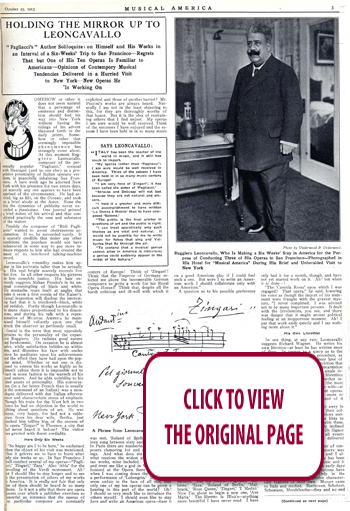 |
“Pagliacci's” Author Soliloquizes on Himself and His Works in an Interval of a Six-Weeks’ Trip to San Francisco—Regrets That but One of His Ten Operas Is Familiar to Americans—Opinions of Contempory Musical Tendencies Delivered in a Hurried Visit to New York—New Operas He “Is Working On”
|
|
11 October 1913
Page 5
WITH THREE COMPANIES CONTENDING FOR ITS
FAVOR, NEW YORK FACES UNPRECEDENTED SITUATION IN OPERA
|
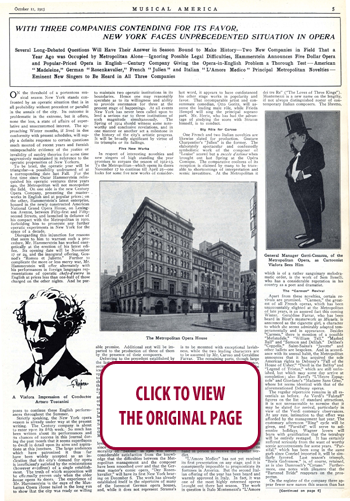 |
Several Long-Debated Questions Will Have Their Answer in Season Bound to Make History—Two New Companies in Field That a Year Ago was Occupied by Metropolitan Alone—Ignoring Possible Legal Difficulties, Hammerstein Announces Five Dollar Opera and Popular-Priced Opera in English—Century Company Giving the Opera-in-English Problem a Thorough Test—American "Madeleine," German "Rosenkavalier," French" Julien" and Italian" L'Amore Medico" Principal Metropolitan Novelties—Eminent New Singers to Be Heard in All Three Companies
|
|
11 October 1913
Page 4
VICTOR HERBERT'S PLACE IN AMERICAN MUSIC |
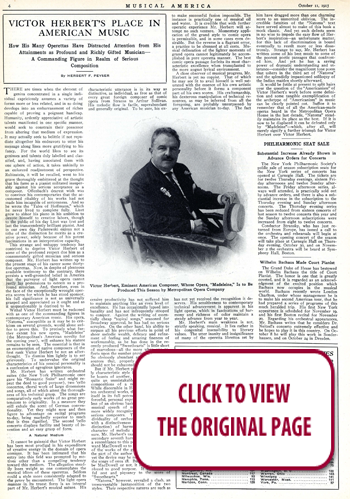 |
How His Many Operettas Have Distracted Attention from His Attainments as Profound and Richly Gifted Musician—A Commanding Figure in Realm of Serious Composition
|
|
11 October 1913
Page 2
MAGGIE TEYTE CORRECTS SOME FALSE IDEAS ABOUT DEBUSSY |
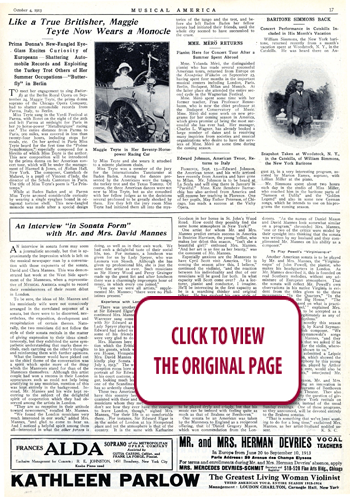 |
French Composer “Most Misunderstood Man in Artistic World,” Declares Interpreter of His Works—Not a “Poseur, Dilettante and Iconoclast”—Music of His Songs So Expressive that Words Are Scarcely Needed—He Realizes Possibilities of His Present Style Are Exhausted
|
|
4 October 1913
Page 17
An Interview "in Sonata Form" with Mr. and Mrs. David Mannes |
 |
AN interview in sonata form may seem a journalistic anomaly, but that is approximately the impression which is left on the musical newspaper man by a conversation with those exponents of the sonata, David and Clara Mannes. This was demonstrated last week at the West Side apartment of the Manneses, when a representative of MUSICALAMERICA sought to record their reminiscences of their recent debut in London.
|
|
4 October 1913
Page 15
$5,000 A NIGHT FOR CARUSO |
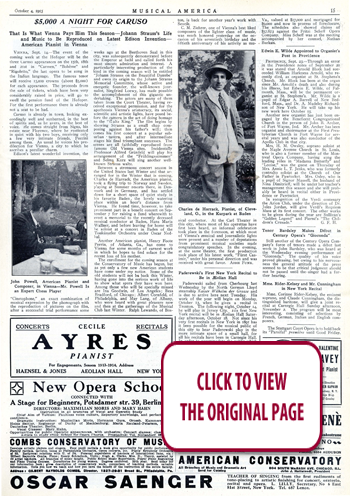 |
That Is What Vienna Pays Him This Season—Johann Strauss’s Life and Music to Be Reproduced on Latest Edison Invention—American Pianist in Vienna
|
|
4 October 1913
Page 3
LISZT AS HIS BARBER KNEW HIM |
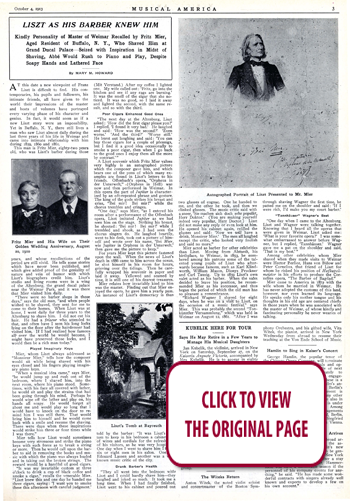 |
Kindly Personality of Master of Weimar Recalled by Fritz Mier, Aged Resident of Buffalo, N. Y., Who Shaved Him at Grand Ducal Palace—Seized with Inspiration in Midst of Shaving, Abbé Would Rush to Piano and Play, Despite Soapy Hands and Lathered Face
|
|
4 October 1913
Page 2
MME. GATTI-CASAZZA MAKES DIPLOMAT OF FRANCES ALDA |
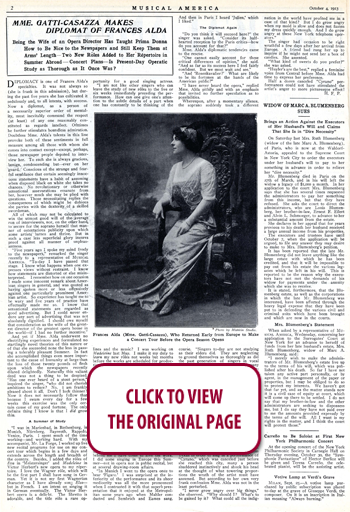 |
Being the Wife of an Opera Director Has Taught Prima Donna How to Be Nice to the Newspapers and Still Keep Them at Arms' Length—Two New Roles Added to Her Repertoire in Summer Abroad Concert Plans—Is Present-Day Operatic Study as Thorough as It Once Was?
|
|
4 October 1913
Page 1
HAMMERSTEIN MAY USE THE MANHATTAN |
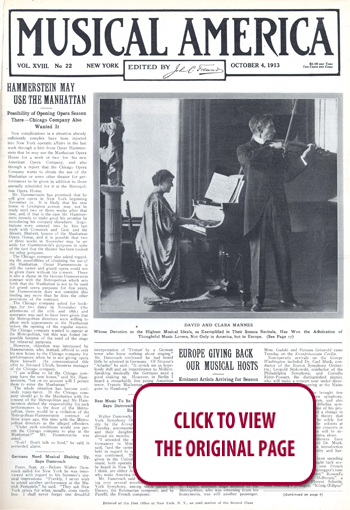 |
Possibility of Opening Opera Season There— Chicago Company Also Wanted It
|
|
6 September 1913
Page 13
LOOKING BACK AT OPERA OF 1863 |
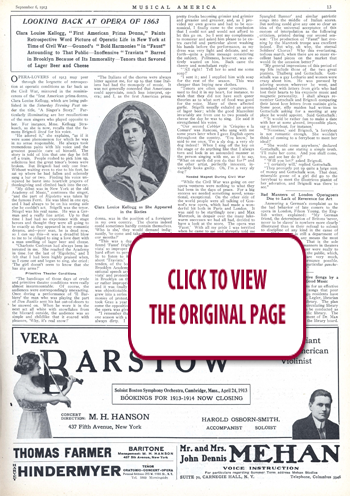 |
Clara Louise Kellogg, “First American Prima Donna,” Paints Retrospective Word Picture of Operatic Life in New York at Time of Civil War—Gounod's “Bold Harmonies” in “Faust” Astounding to That Public—Inoffensive “Traviata” Barred in Brooklyn Because of Its Immorality—Tenors that Savored of Lager Beer and Cheese
|
|
16 August 1913
Page 28
THE CARUSOS OF OTHER DAYS |
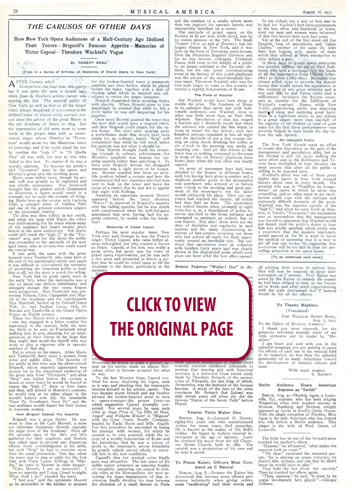 |
How New York Opera Audienes of a Half-Century Ago Idolized Their Tenors—Brignoli’s Famous Appetite—Memories of Victor Capoul—Theodore Wachtel’s Vogue
|
|
16 August 1913
Page 11
THE QUESTION OF PIANO TONE |
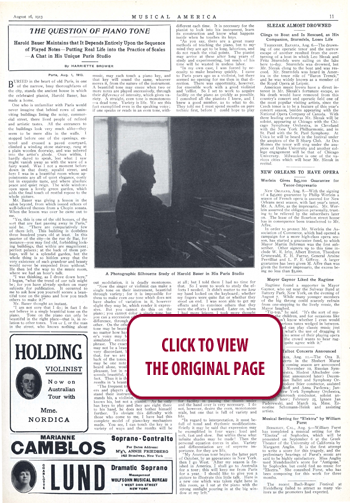 |
Harold Bauer Maintains that It Depends Entirely Upon the Sequence of Played Notes—Putting Real Life into the Practice of Scales—A Chat in His Unique Paris Studio
|
|
19 July 1913
Page 13
HARMONY OF A PlANlST'S HOUSEHOLD |
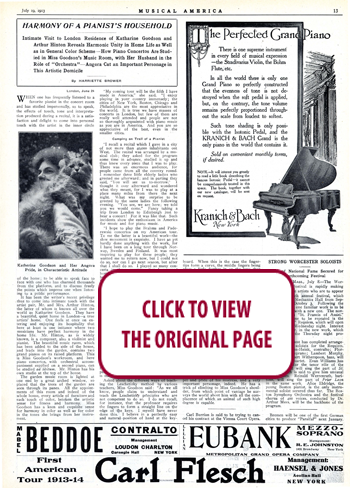 |
Intimate Visit to London Residence of Katharine Goodson and Arthur Hinton Reveals Harmonic Unity in Home Life as Well as in General Color Scheme—How Piano Concertos Are Studied in Miss Goodson's Music Room, with Her Husband in the Role of "Orchestra"—Angora Cat an Important Personage in This Artistic Domicile
|
|
19 July 1913
Page 3
AMERICA'S LACK OF MUSICAL APPRECIATION A DISGRACE, SAYS WAGHALTER |
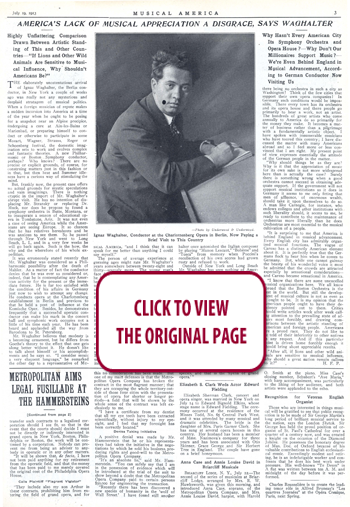 |
Highly Unflattering Comparison Drawn Between Artistic Standing of This and Other Countries—"If Lions and Other Wild Animals Are Sensitive to Musical Influence, Why Shouldn't Americans Be?" Why Hasn't Every American City Its Symphony Orchestra and Opera House?—Why Don't Our Millionaires Support Music?—We're Even Behind England in Musical Advancement, According to German Conductor Now Visiting Us
METROPOLITAN AIMS LEGAL FUSILLADE AT THE HAMMERSTEINS [Continued from page 2]
|
|
19 July 1913
Page 2
LESCHETIZKY PASSES THE EIGHTY-THIRD MILESTONE |
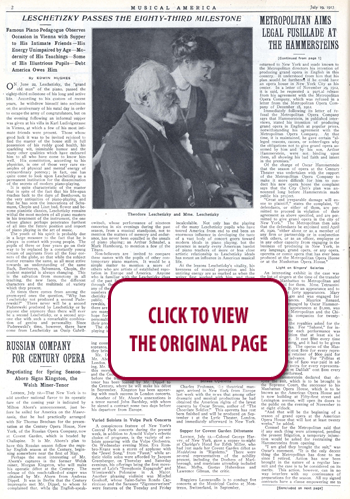 |
Famous Piano Pedagogue Observes Occasion in Vienna with Supper to His Intimate Friends—His Energy Unimpaired by Age—Modernity of His Teachings—Some of His Illustrious Pupils—Debt America Owes Him
METROPOLITAN AIMS LEGAL FUSILLADE AT THE HAMMERSTEINS [Continued from page 1]
|
|
19 July 1913
Page 1
METROPOLITAN AIMS LEGAL FUSILLADE AT THE HAMMERSTEINS |
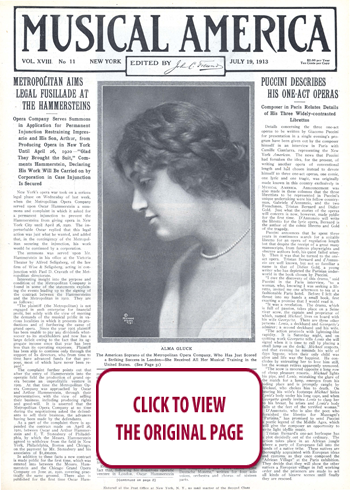 |
Opera Company Serves Summons in Application for Permanent Injunction Restraining Impresario and His Son, Arthur, from Producing Opera in New York Until April 26, 1920—“Glad They Brought the Suit,” Comments Hammerstein, Declaring His Work Will Be Carried on by Corporation in Case Injunction Is Secured
|
|
12 July 1913
PLAYED THE BANJO FOR BRAHMS |
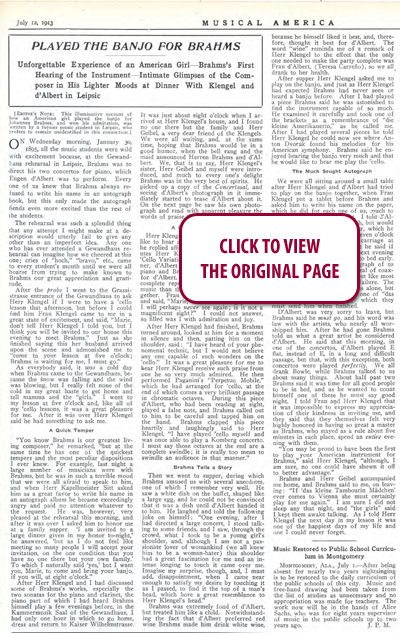 |
Unforgettable Experience of an American Girl—Brahms’s First Hearing of the Instrument—Intimate Glimpses of the Composer in His Lighter Moods at Dinner With Klengel and d' Albert in Leipsic
|
|
5 July 1913
Page 23
MOST POPULAR LIVING COMPOSER |
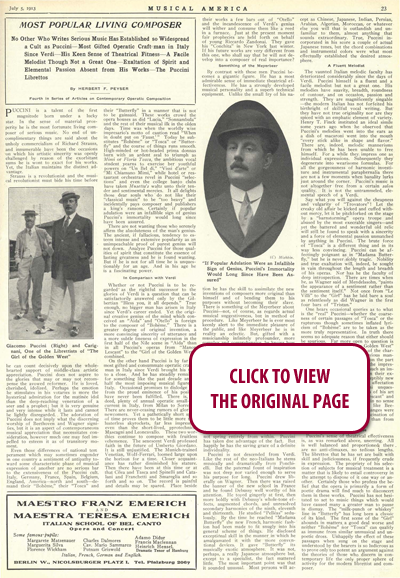 |
No Other Who Writes Serious Music Has Established so Widespread a Cult as Puccini—Most Gifted Operatic Craftsman in Italy Since Verdi—His Keen Sense of Theatrical Fitness—A Facile Melodist Though Not a Great One—Exaltation of Spirit and Elemental Passion Absent from His Works—The Puccini Librettos
|
 100 YEARS AGO
100 YEARS AGO






































































































































































































































































































































































































 RENT A PHOTO
RENT A PHOTO





